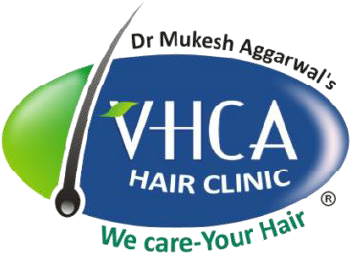Since 1928VHCA Hair Clinic World's 1st Ayurveda Hair Clinic
Blog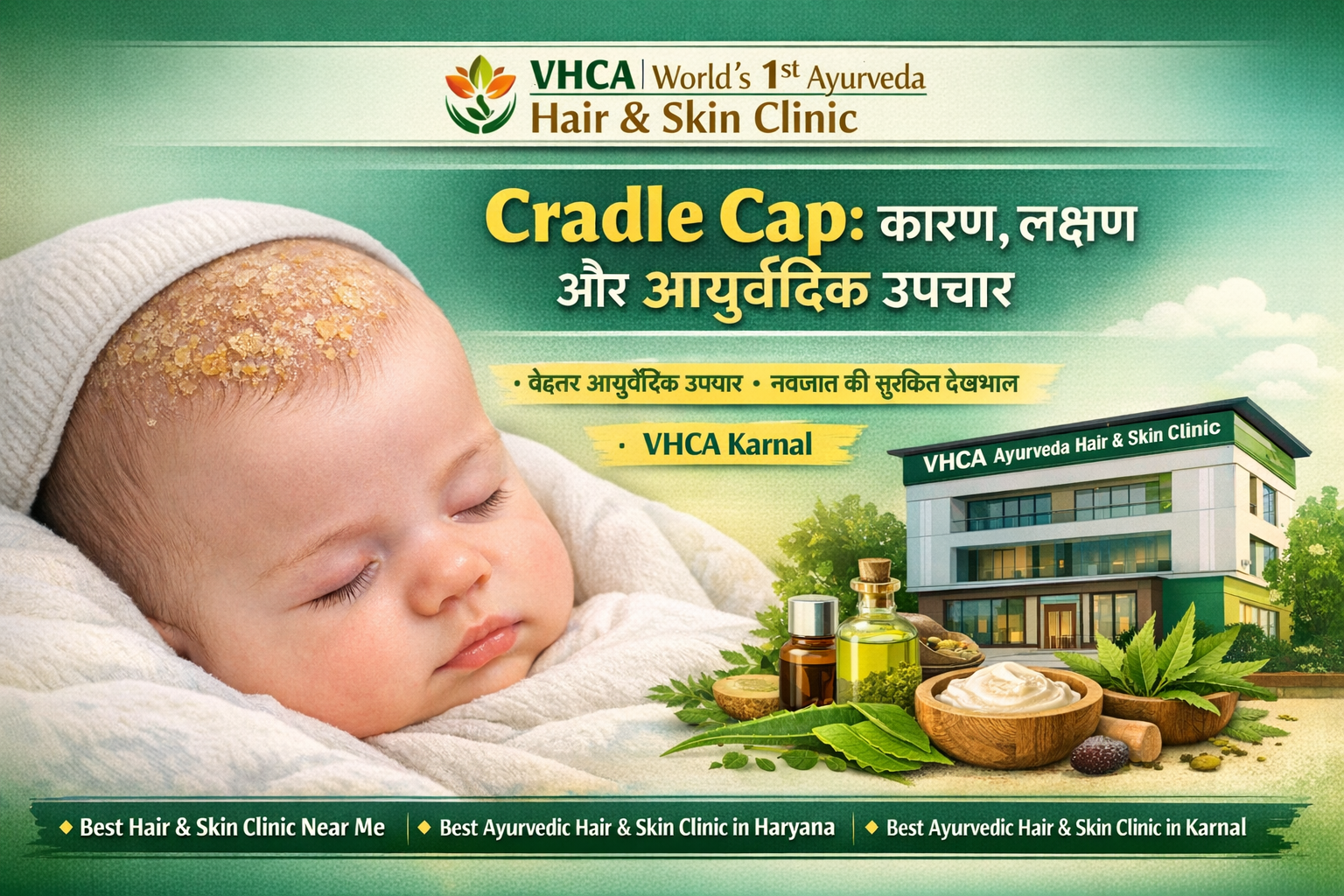

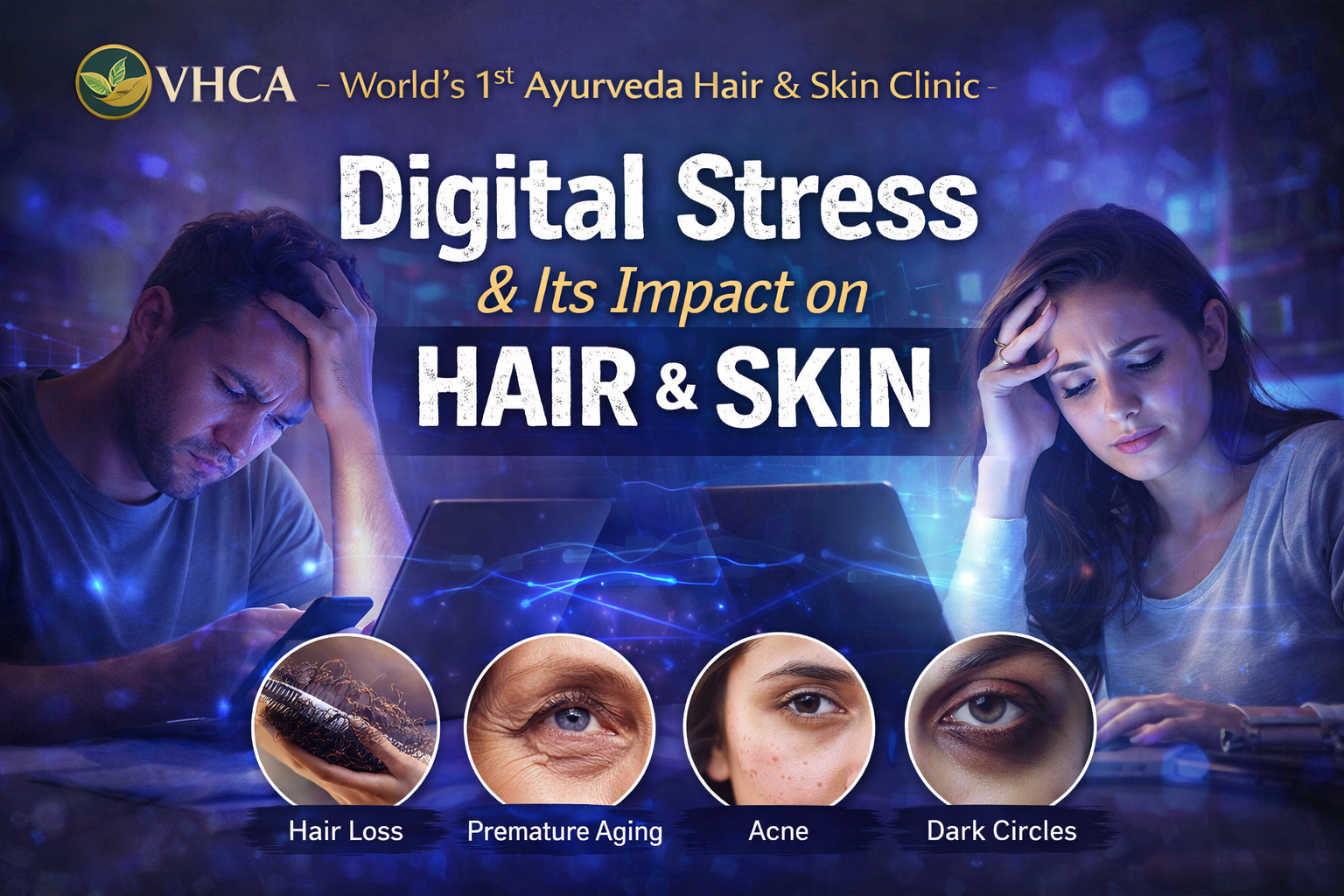
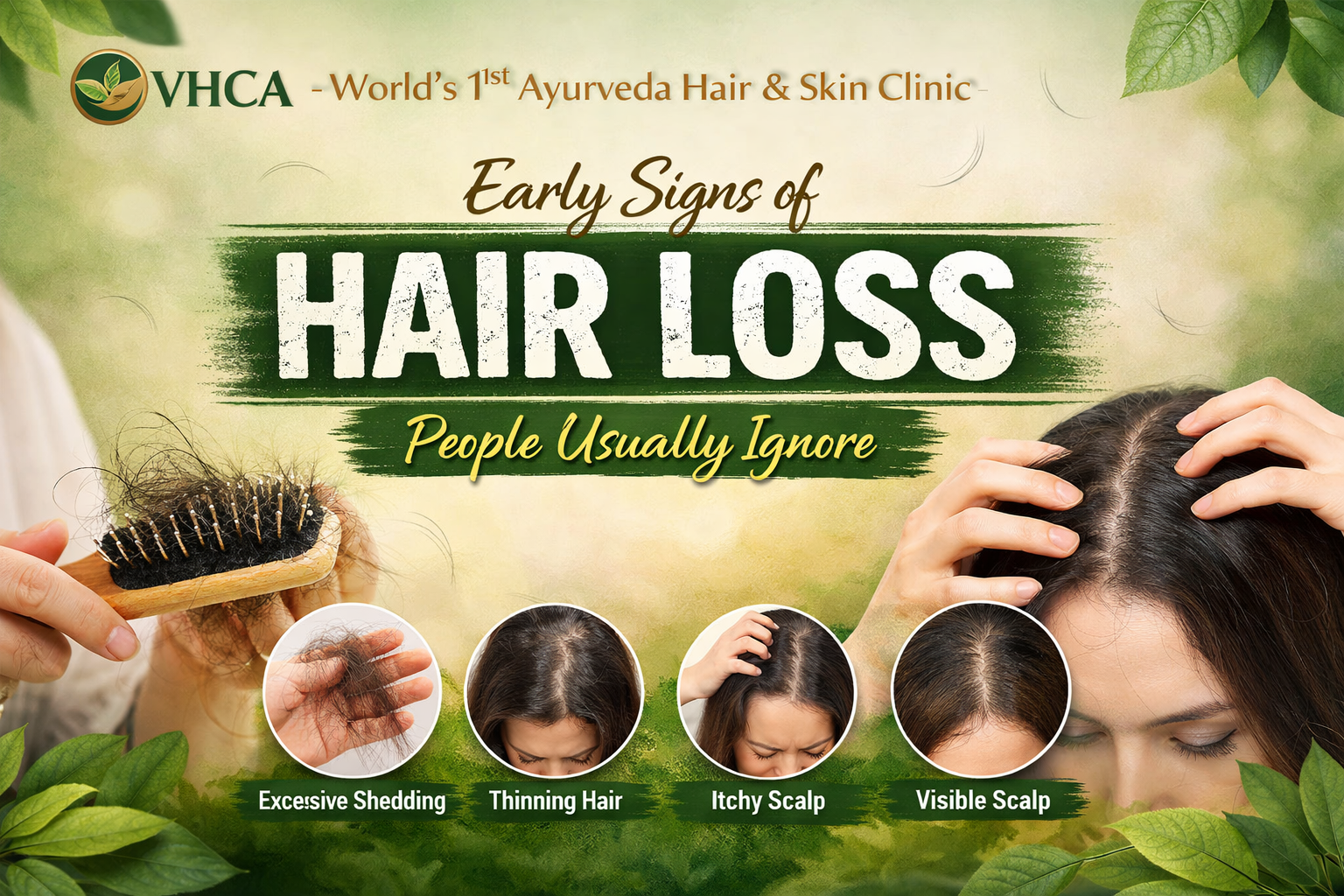
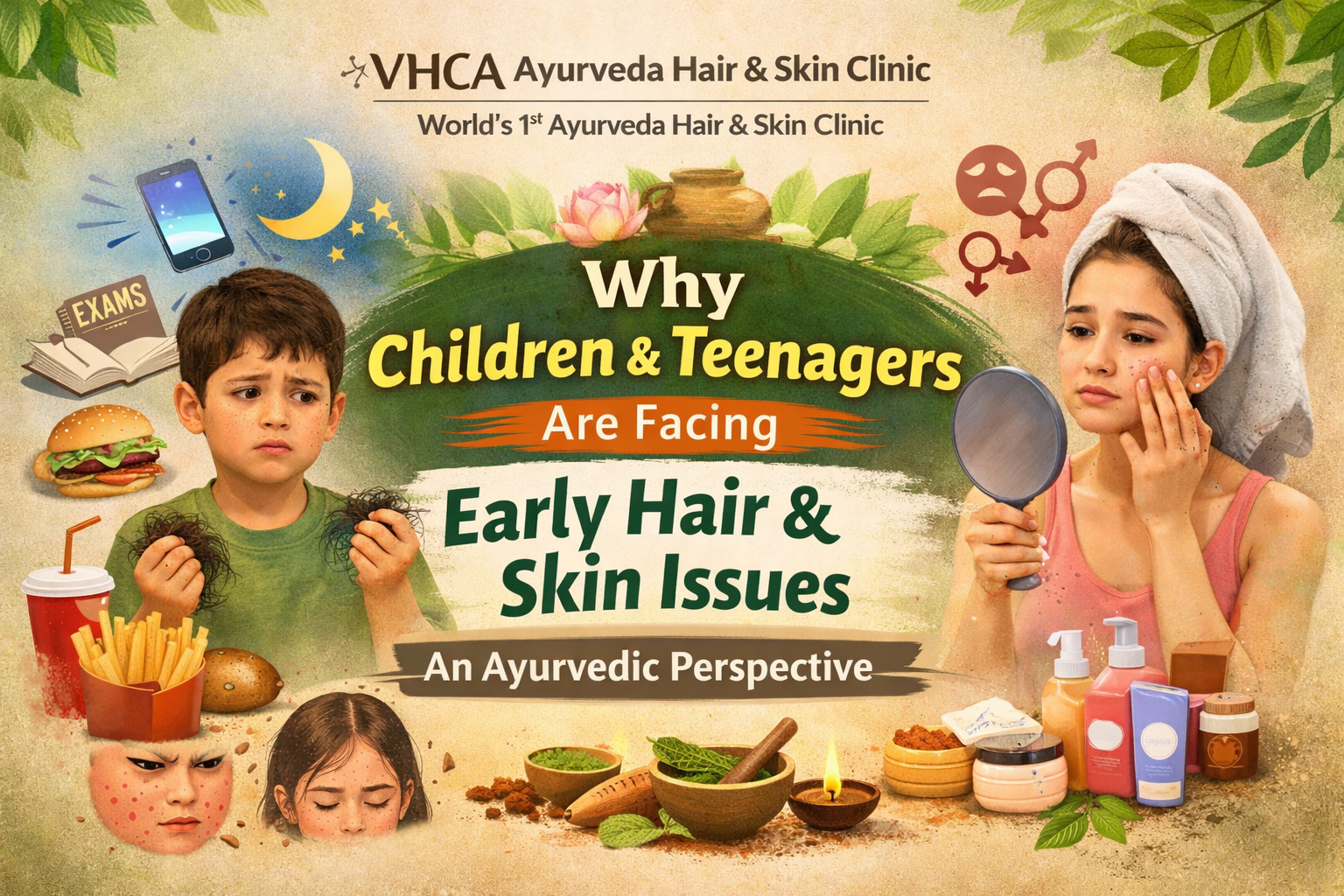
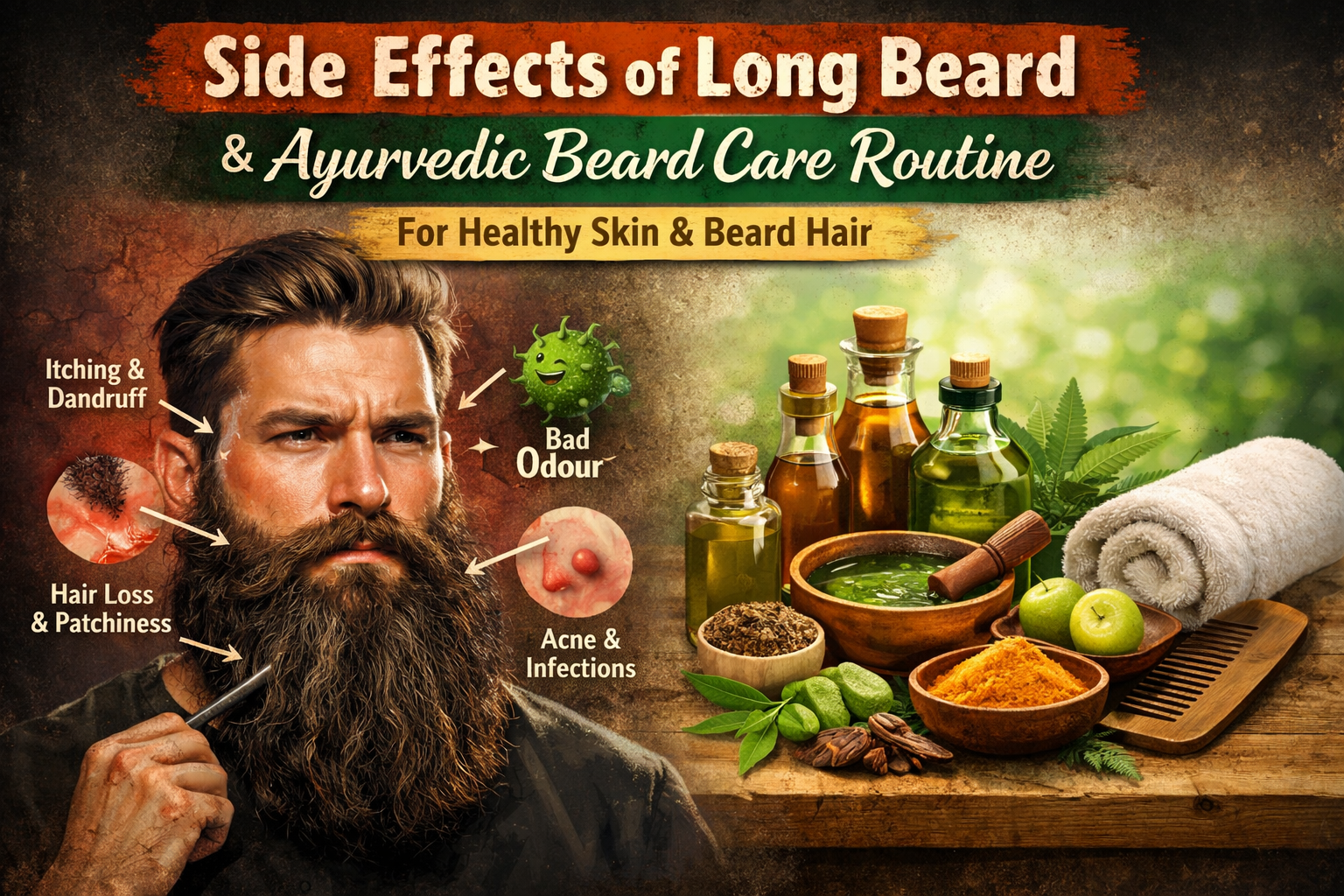
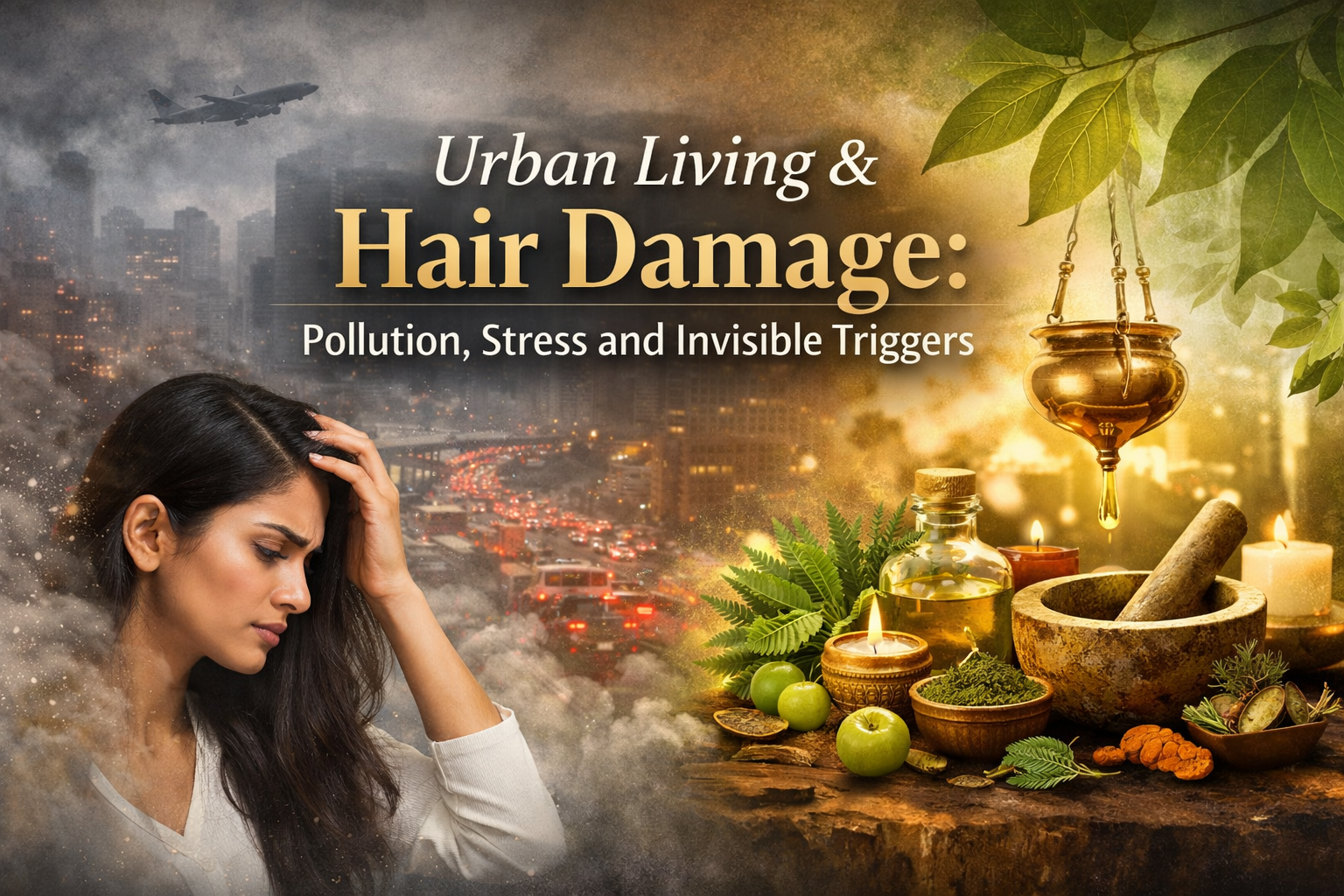

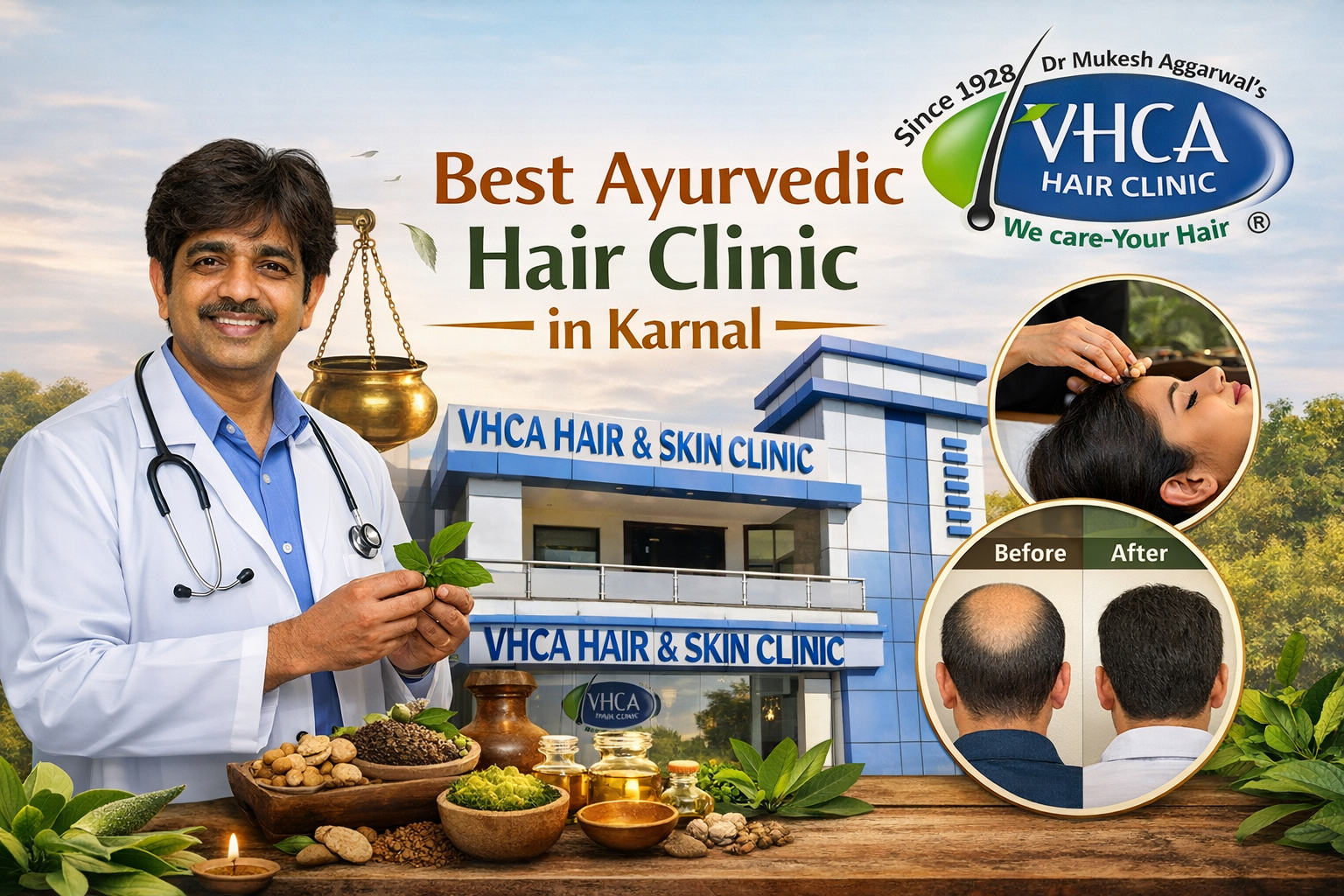
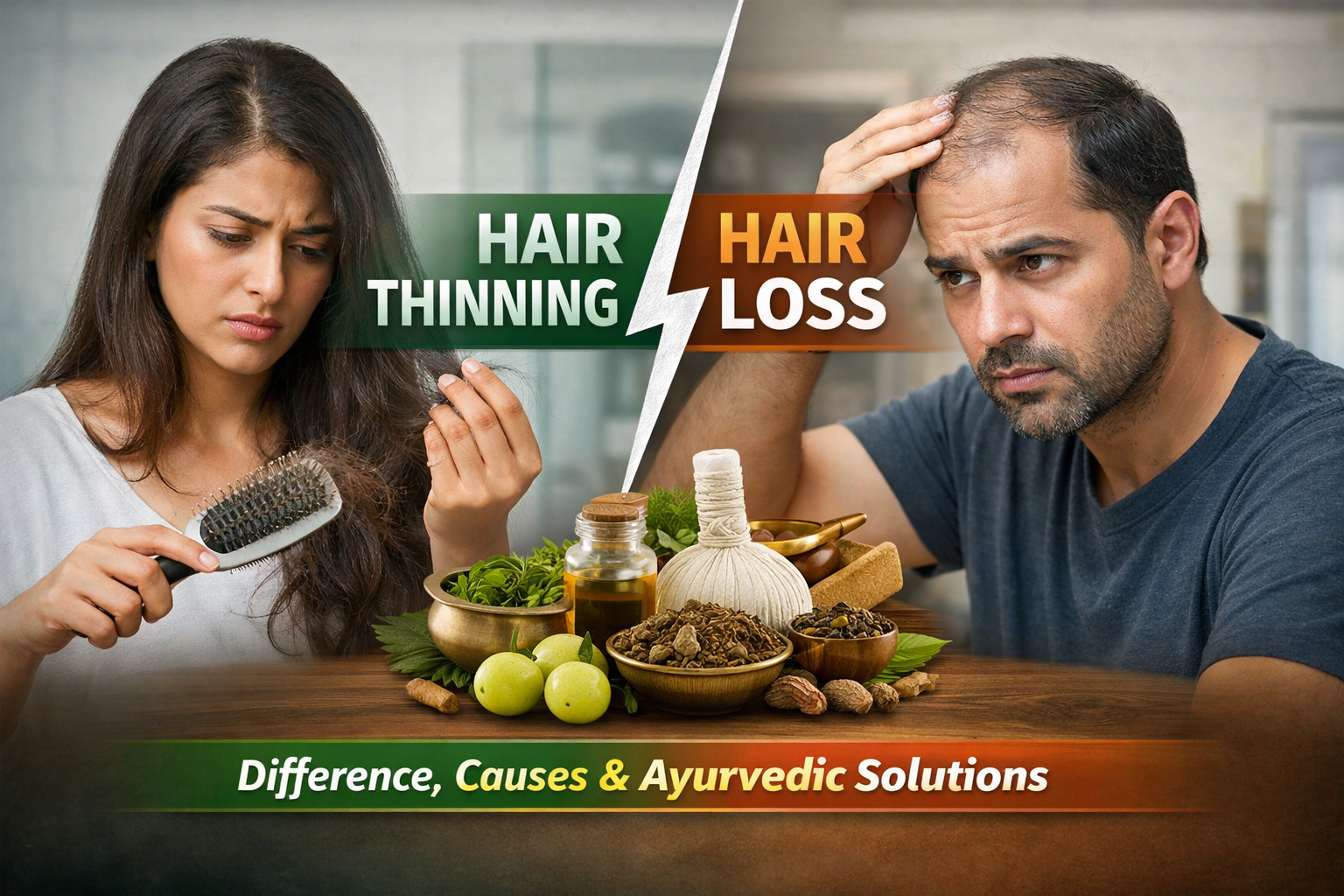
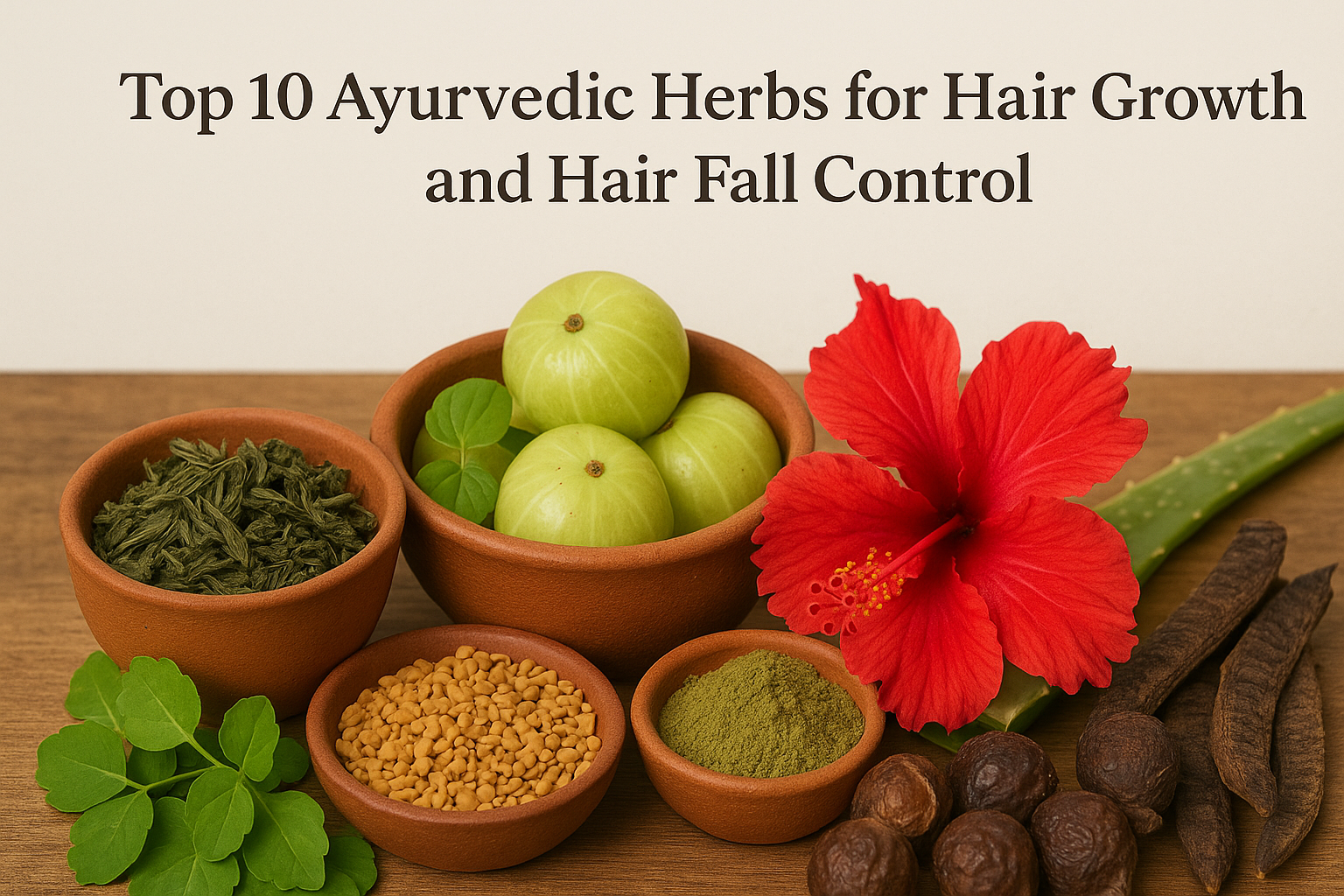
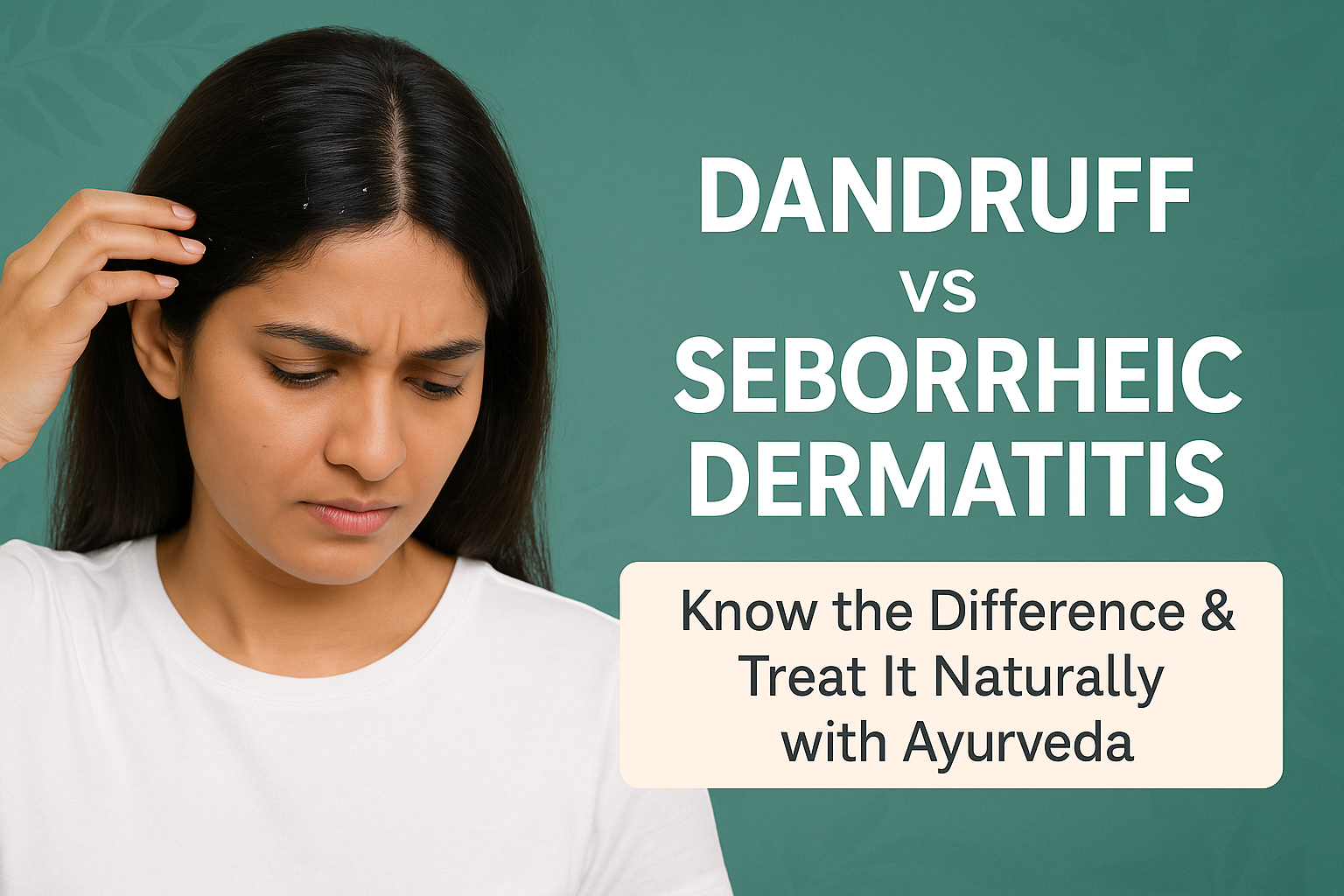

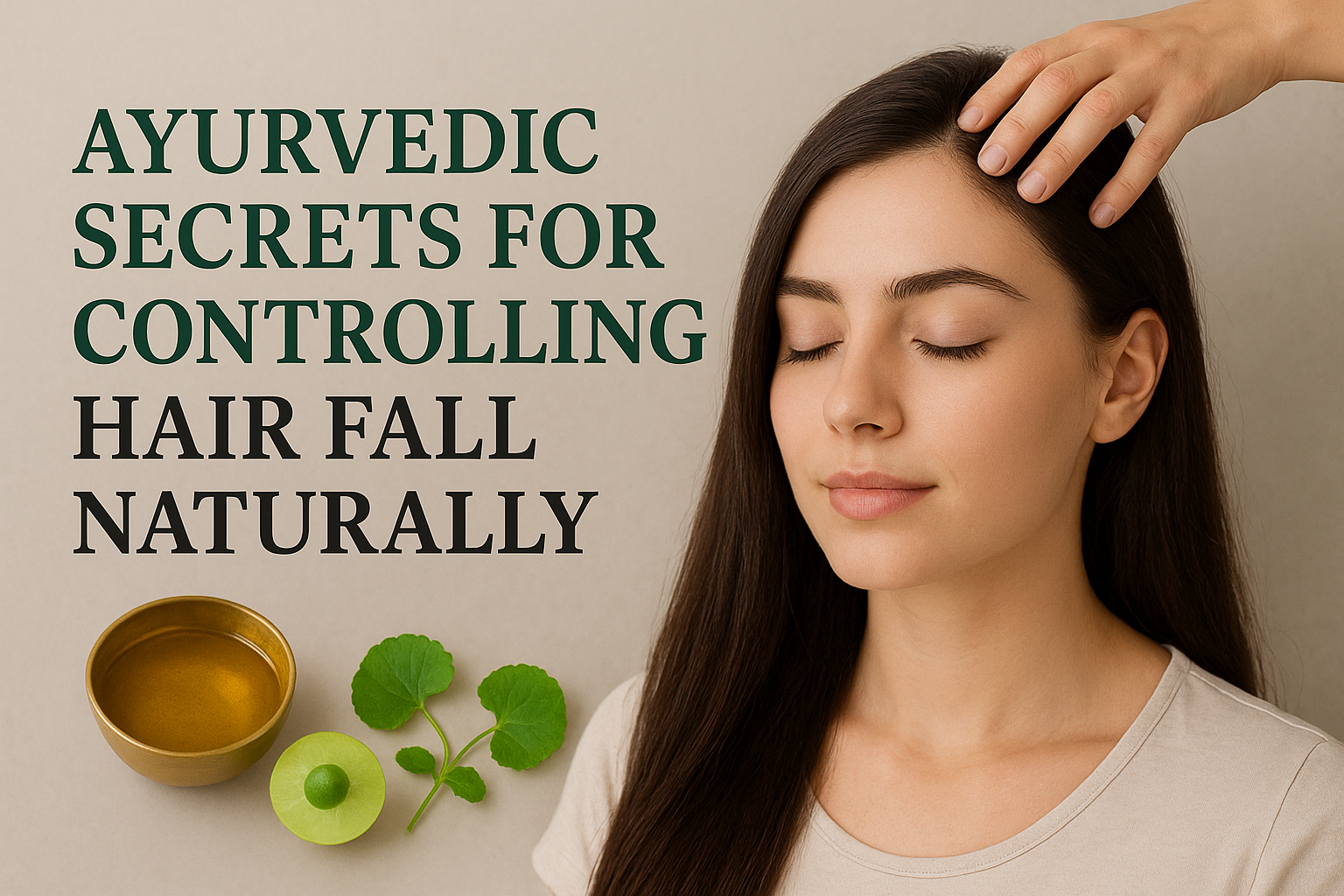
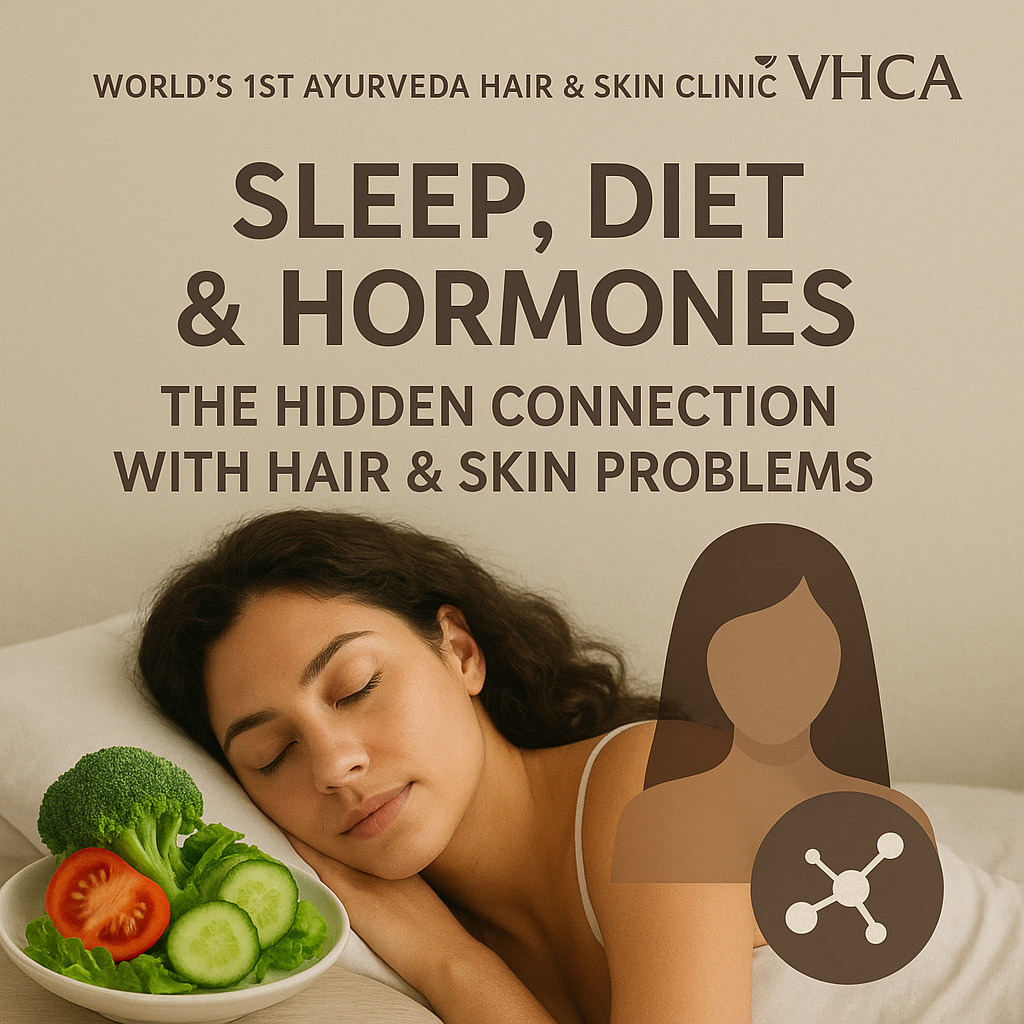
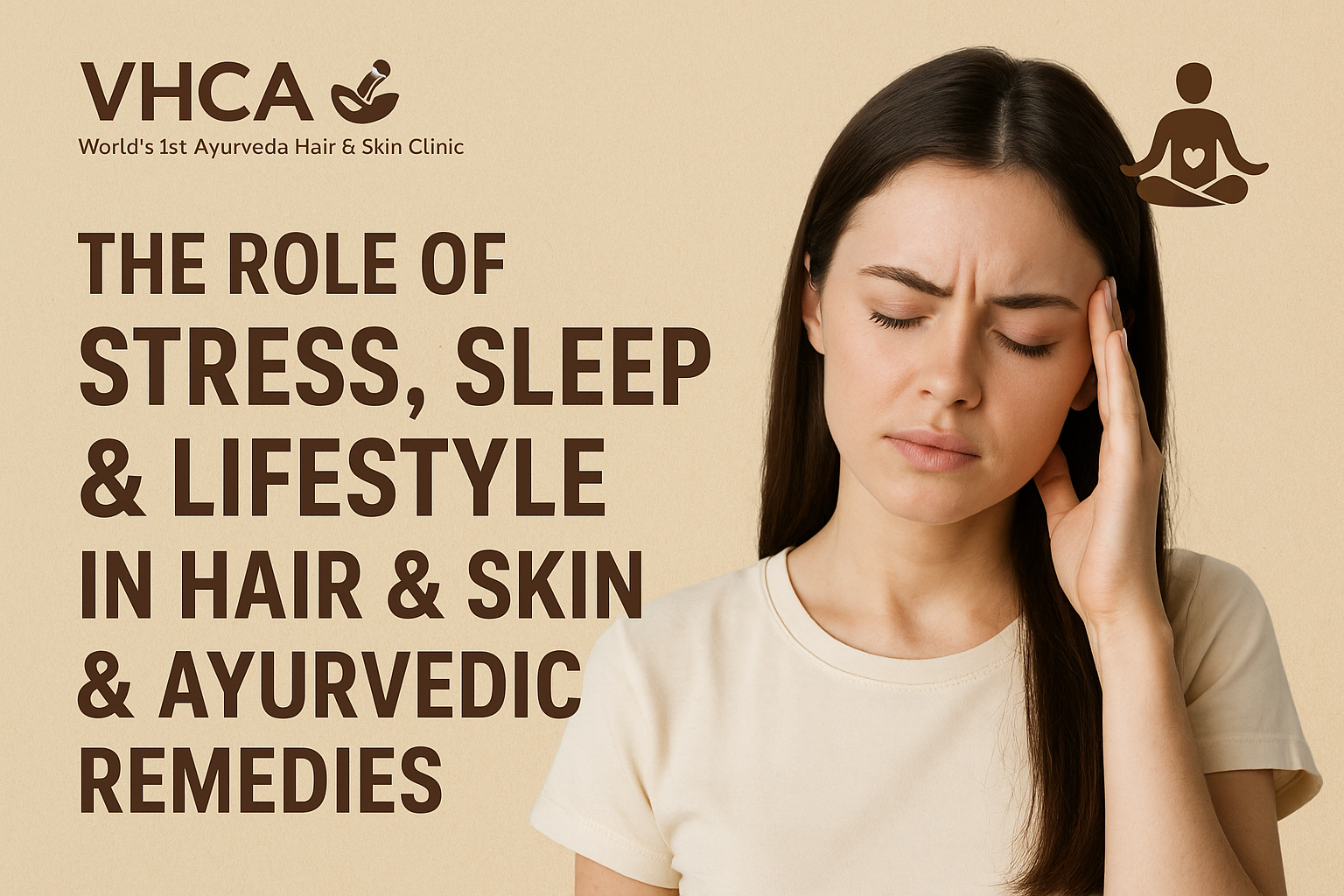
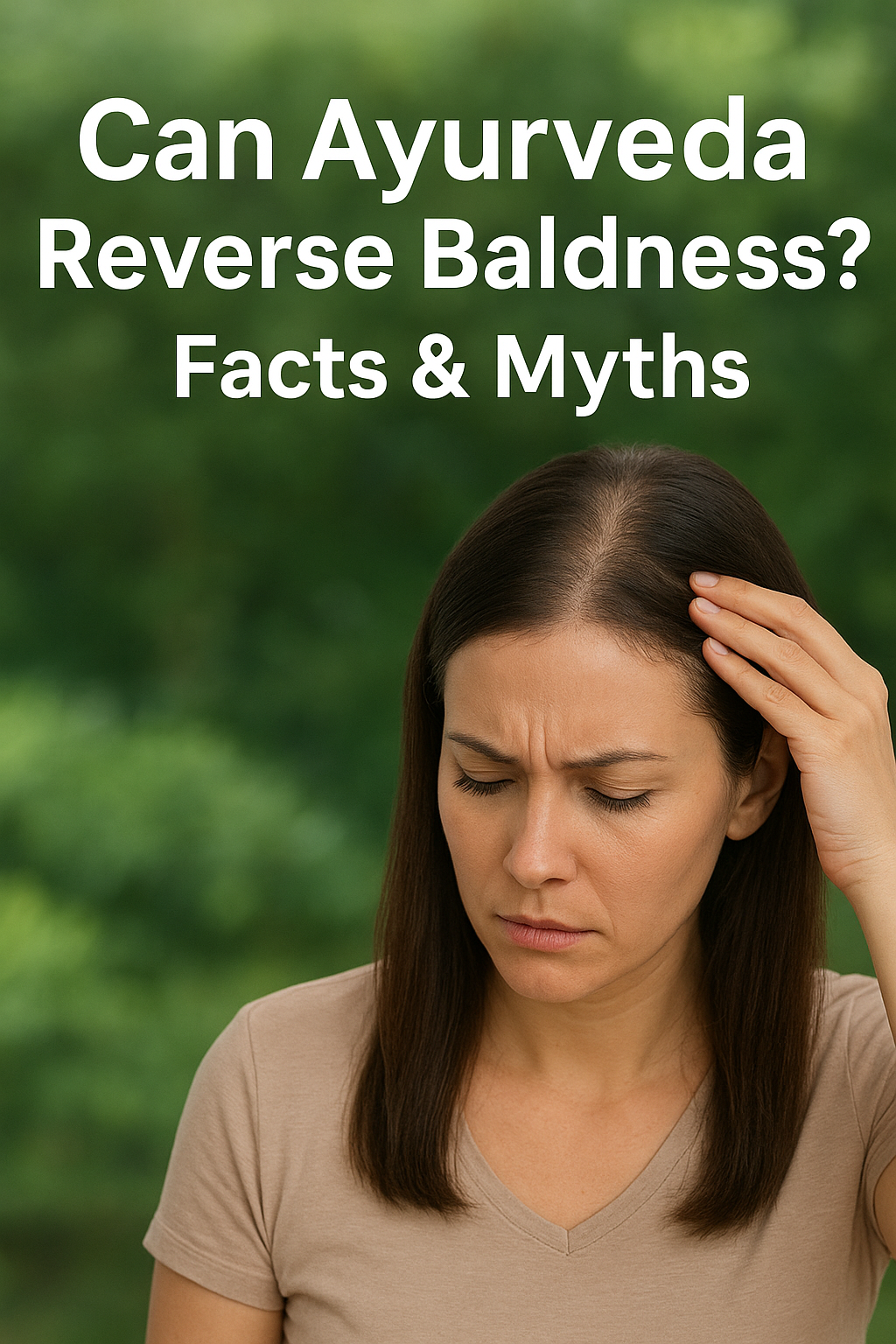
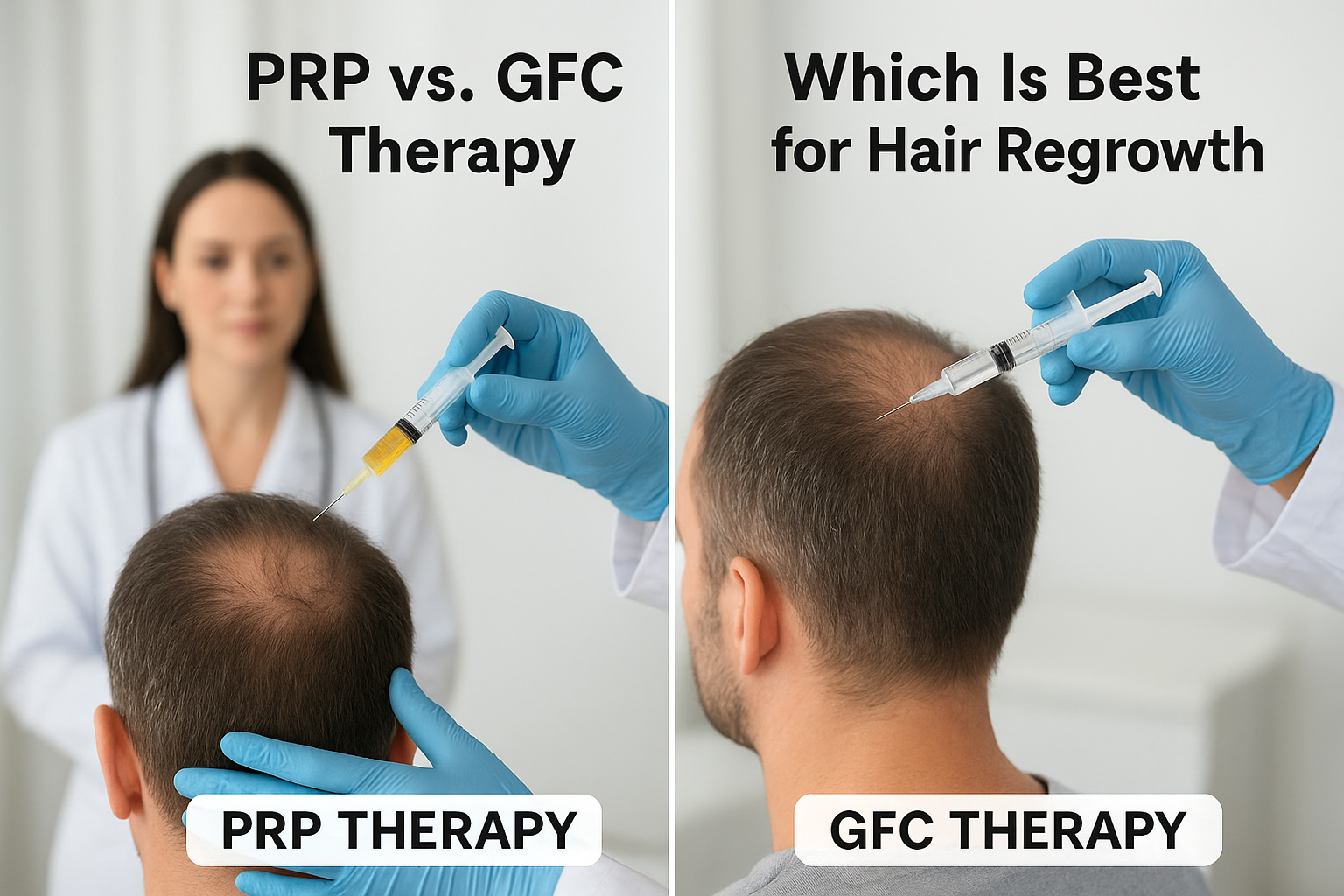
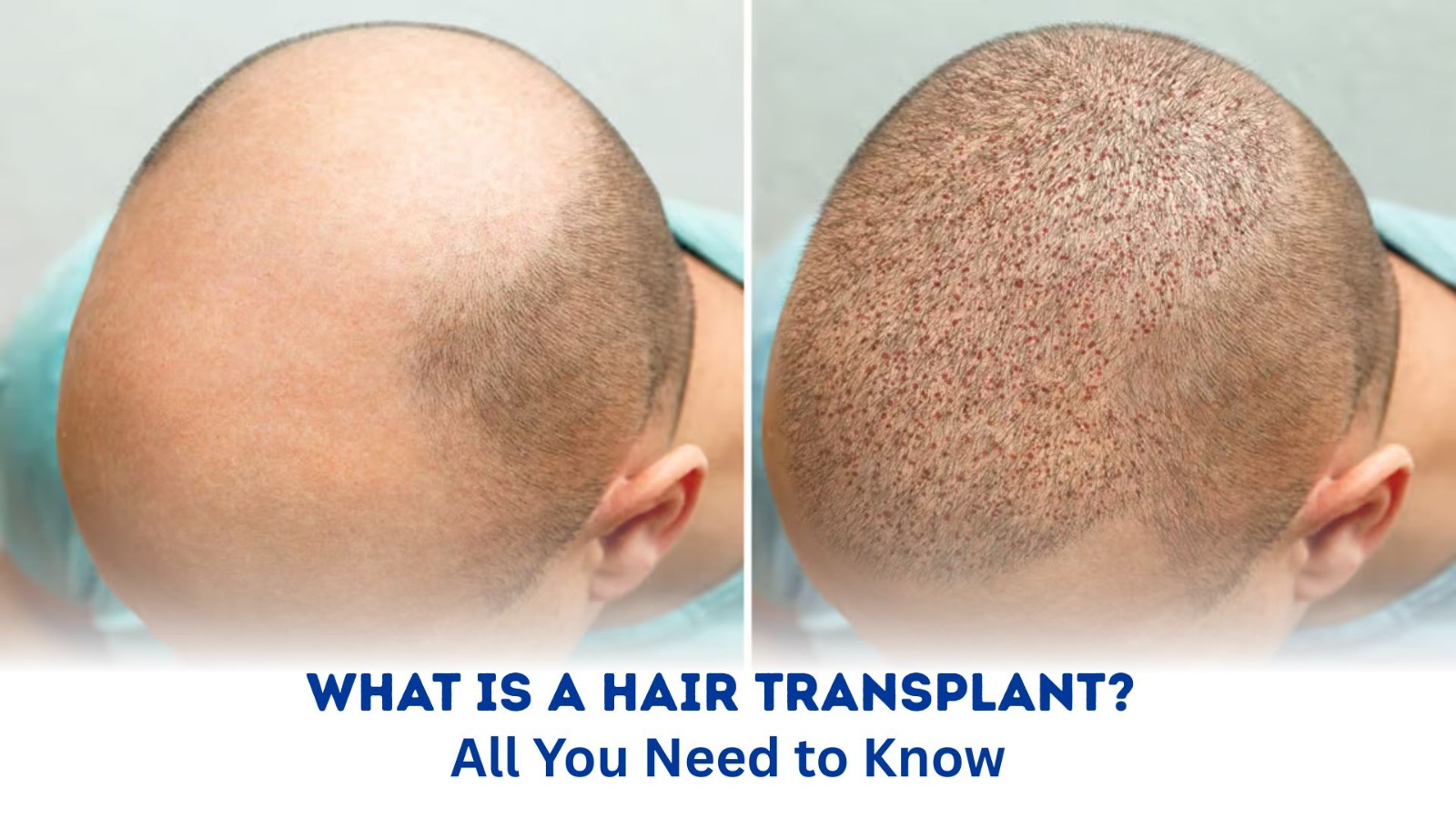
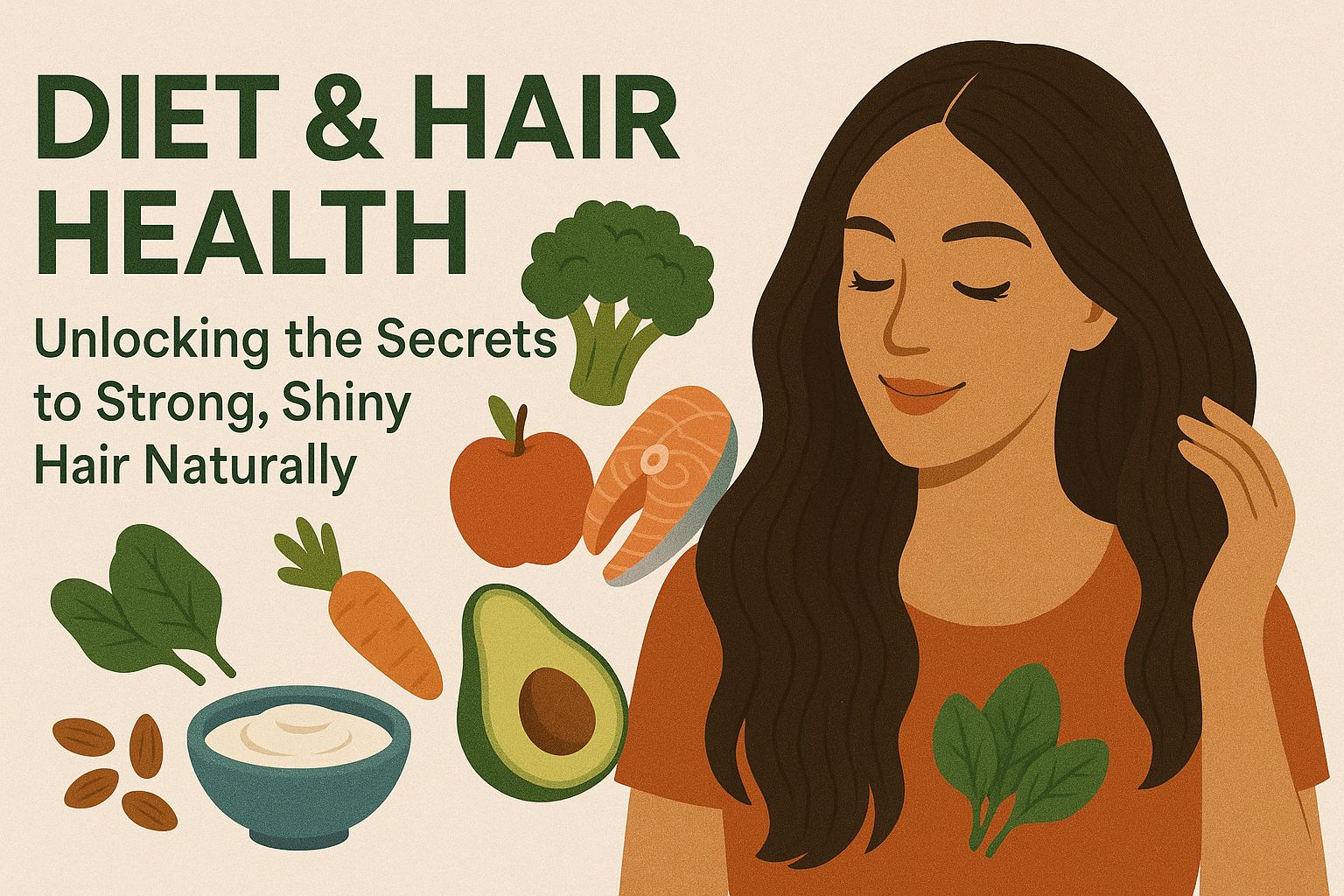
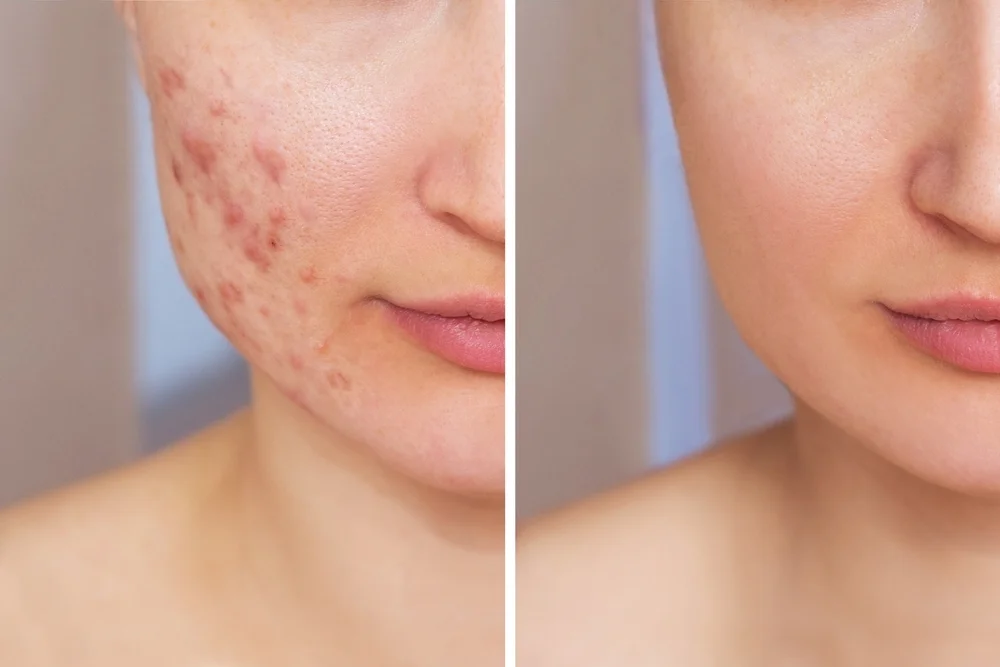
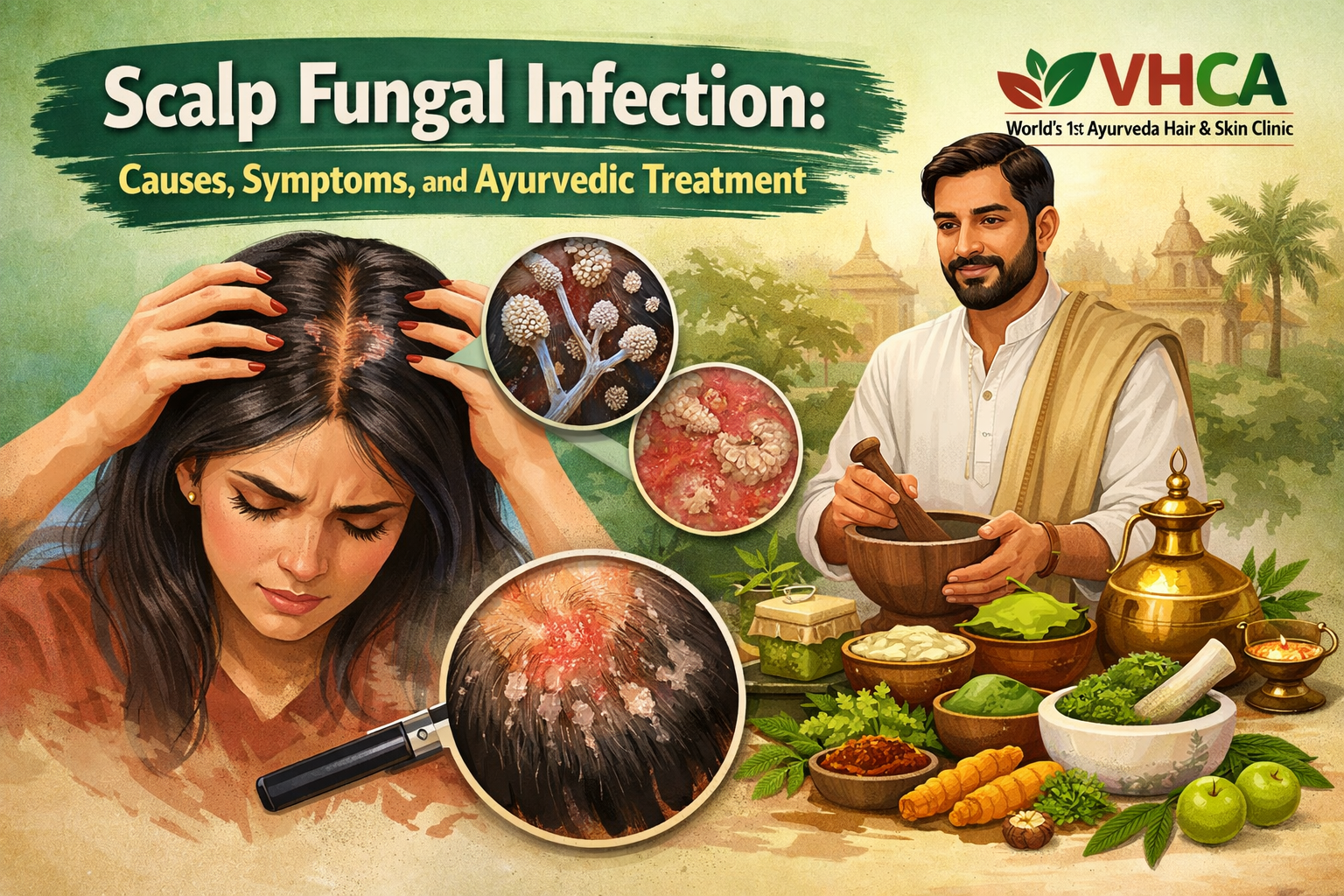

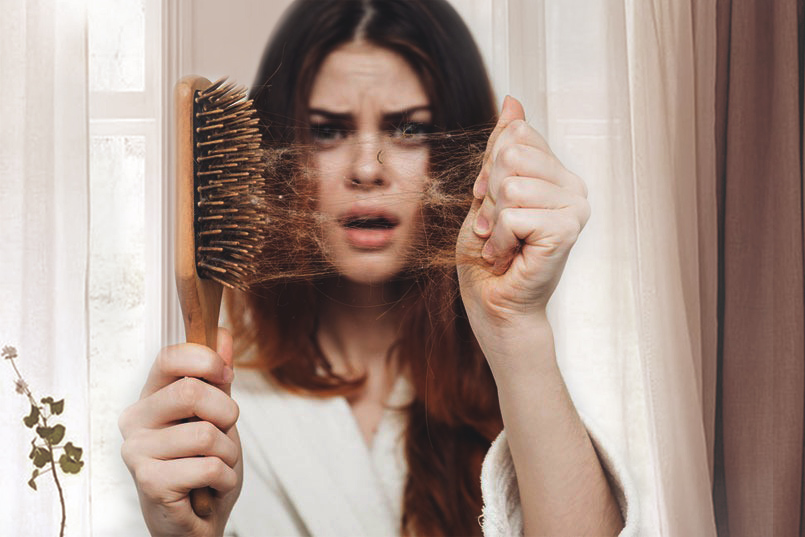
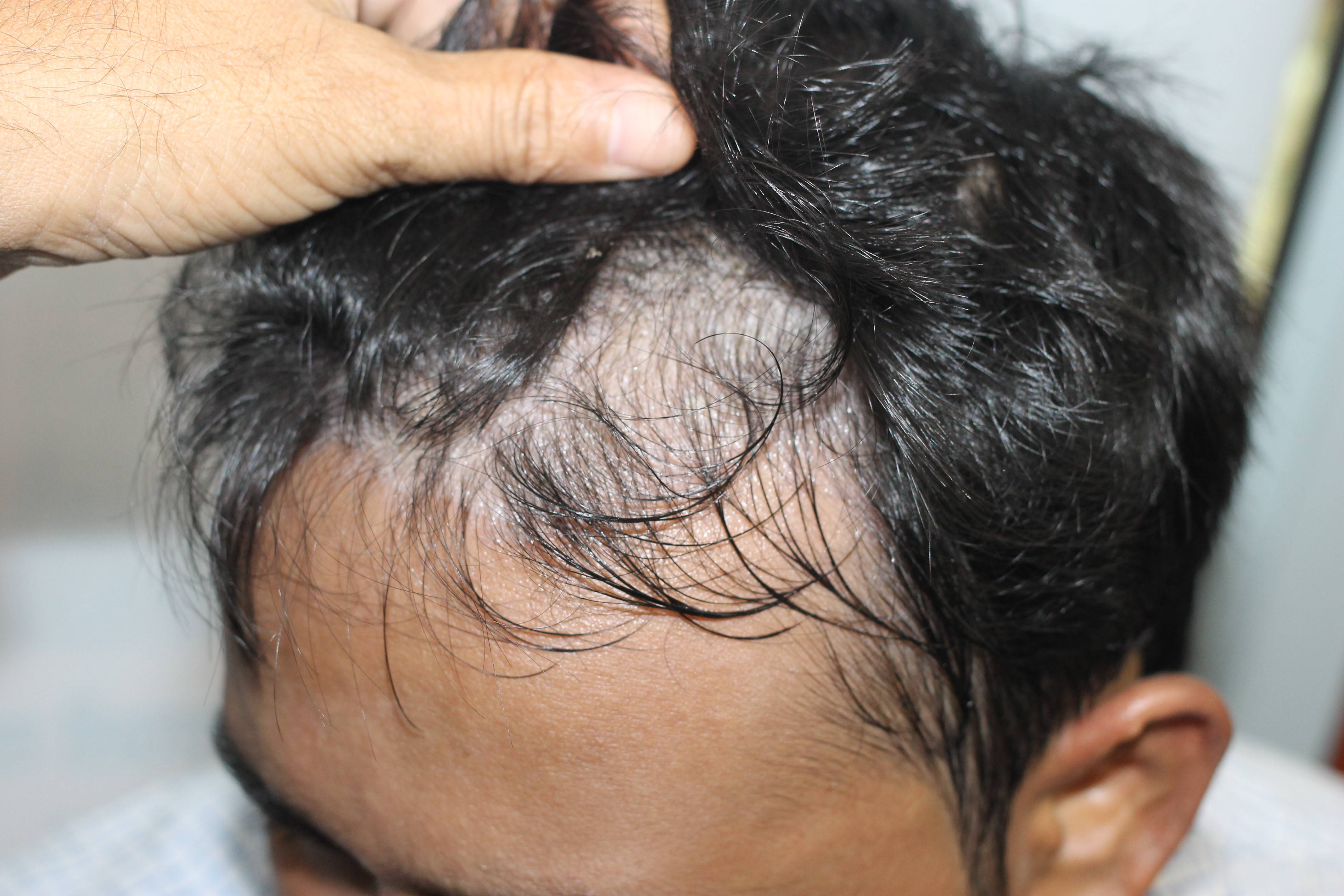
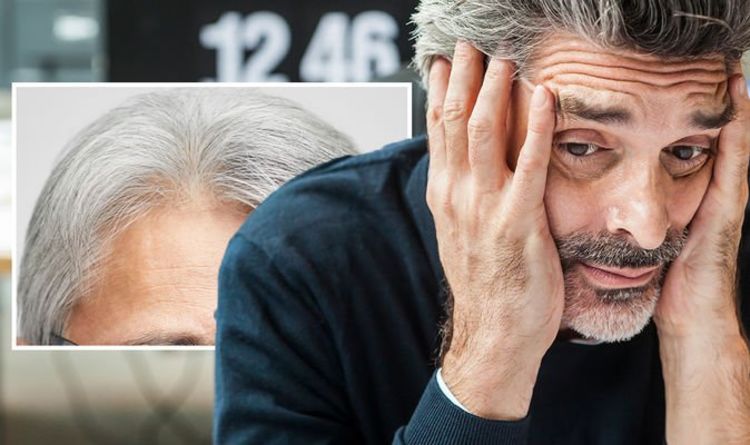
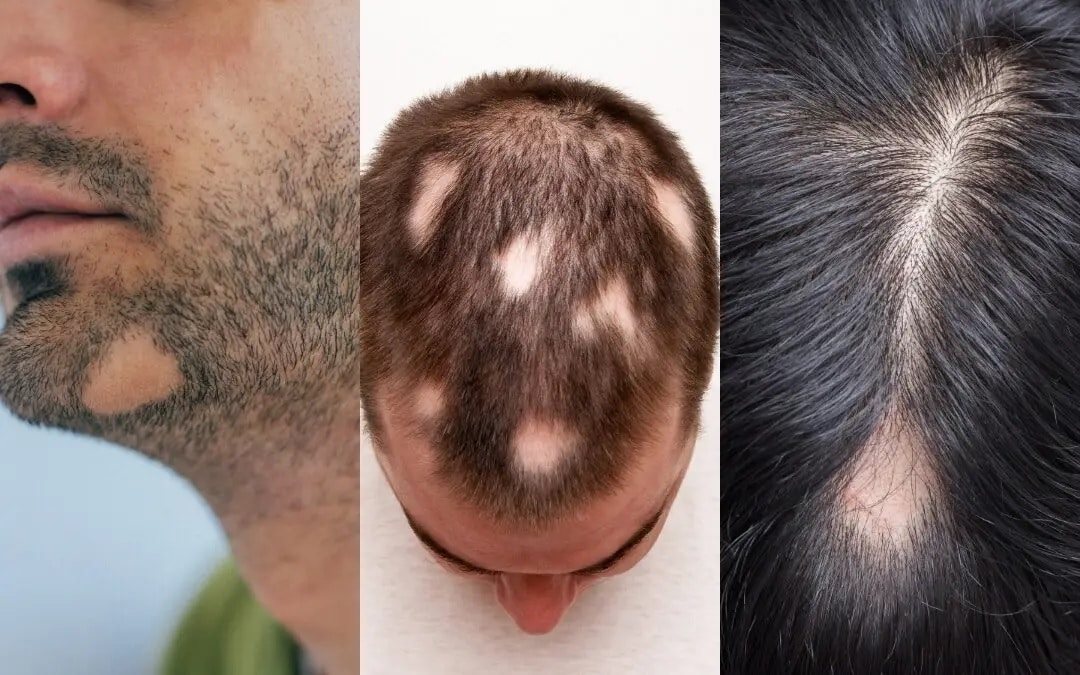
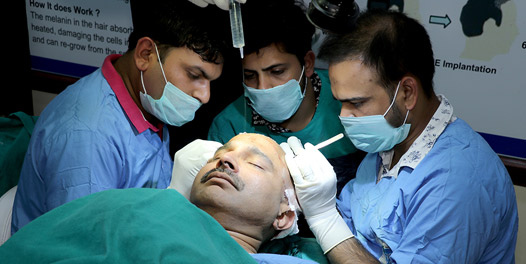


Cradle Cap क्या है? कारण, लक्षण और आयुर्वेदिक उपचार |शिशु के सिर पर पीली या सफेद पपड़ी जैसी परत दिखना अक्सर माता-पिता को चिंतित कर देता है। इस स्थिति को Cradle Cap कहा जाता है। मेडिकल भाषा में इसे Seborrheic Dermatitis कहा जाता है। यह आमतौर पर नवजात और 6 महीने तक के बच्चों में दिखाई देता है और सही देखभाल से आसानी से ठीक किया जा सकता है।
Worlds 1st Ayurveda Hair Skin Clinic VHCA में हम Cradle Cap का सुरक्षित और प्रभावी आयुर्वेदिक उपचार प्रदान करते हैं, जिससे शिशु की त्वचा को बिना किसी साइड इफेक्ट के आराम मिलता है।
Cradle Cap क्या है?
Cradle Cap एक सामान्य त्वचा समस्या है जिसमें बच्चे की खोपड़ी (Scalp) पर मोटी, तैलीय, पीली या सफेद पपड़ी जम जाती है। कभी-कभी यह भौंहों, कानों के पीछे और गर्दन के पास भी दिखाई दे सकती है।
यह संक्रामक (infectious) नहीं है और न ही दर्दनाक होती है, लेकिन समय पर देखभाल जरूरी है।
Cradle Cap के मुख्य कारण
हालांकि इसका सटीक कारण पूरी तरह स्पष्ट नहीं है, फिर भी कुछ प्रमुख कारण माने जाते हैं:
त्वचा में अधिक तेल (Sebum) का उत्पादन
फंगल संक्रमण (Malassezia yeast)
हार्मोनल प्रभाव (मां से शिशु में आए हार्मोन)
त्वचा की संवेदनशीलता
आयुर्वेद के अनुसार यह समस्या मुख्यतः कफ और पित्त दोष के असंतुलन से जुड़ी होती है।
Cradle Cap के लक्षण
सिर की त्वचा पर पीली/सफेद पपड़ी
तैलीय स्कैल्प
हल्की लालिमा
कभी-कभी हल्की खुजली
यदि लालिमा बढ़ जाए या पस बनने लगे, तो तुरंत विशेषज्ञ से परामर्श लेना चाहिए।
क्या Cradle Cap खतरनाक है?
नहीं, यह सामान्य स्थिति है और अधिकतर मामलों में कुछ महीनों में अपने-आप ठीक हो जाती है। लेकिन गलत तेल, केमिकल शैम्पू या जोर से रगड़ने से समस्या बढ़ सकती है।
इसीलिए माता-पिता अक्सर खोजते हैं:best ayurvedic hair skin clinic near mehair clinic near me
यदि आप सुरक्षित और प्राकृतिक समाधान चाहते हैं, तो VHCA आपके लिए सही विकल्प है।
Cradle Cap का आयुर्वेदिक उपचार
VHCA World's 1st Ayurveda Hair Skin Clinic में हम शिशु की नाजुक त्वचा को ध्यान में रखते हुए निम्न उपचार अपनाते हैं:
1. औषधीय हर्बल ऑयल थेरेपी
विशेष आयुर्वेदिक तेलों से हल्की मालिश, जो पपड़ी को मुलायम बनाकर धीरे-धीरे हटाने में मदद करती है।
2. माइल्ड हर्बल क्लेंज़िंग
केमिकल-फ्री, आयुर्वेदिक हर्बल क्लेंज़र से स्कैल्प की सफाई।
3. दोष संतुलन उपचार
कफ-पित्त संतुलन के लिए प्राकृतिक औषधियाँ।
4. पेरेंट्स काउंसलिंग
माता-पिता को सही स्कैल्प केयर की जानकारी देना।
घर पर क्या करें?
हल्के गुनगुने तेल से मालिश करें
सॉफ्ट ब्रश से धीरे-धीरे पपड़ी हटाएं
केमिकल युक्त उत्पादों से बचें
डॉक्टर की सलाह के बिना कोई दवा न लगाएं
VHCA क्यों चुनें?
यदि आप खोज रहे हैं:
best hair skin clinic in haryana
best ayurvedic hair skin clinic in karnal
तो VHCA आपकी पहली पसंद होनी चाहिए।
✔ 100% आयुर्वेदिक उपचार✔ शिशुओं के लिए सुरक्षित थेरेपी✔ अनुभवी आयुर्वेद विशेषज्ञ✔ बिना साइड इफेक्ट के परिणाम
निष्कर्ष
Cradle Cap एक सामान्य लेकिन ध्यान देने योग्य त्वचा समस्या है। सही जानकारी और उचित आयुर्वेदिक उपचार से इसे सुरक्षित रूप से नियंत्रित किया जा सकता है।
Worlds 1st Ayurveda Hair Skin Clinic VHCA में हम शिशुओं की नाजुक त्वचा और बालों की देखभाल पूरी जिम्मेदारी और विशेषज्ञता के साथ करते हैं।
यदि आप अपने बच्चे के लिए सुरक्षित और प्राकृतिक समाधान चाहते हैं, तो आज ही VHCA से संपर्क करें क्योंकि आपके बच्चे की मुस्कान हमारी प्राथमिकता है।

Healthy Daily Routine for Hair & Skin HealthAyurvedic Dinacharya Guide by VHCA Worlds 1st Ayurveda Hair Skin Clinic
In todays fast-paced lifestyle, people invest heavily in hair products and skincare routines but often overlook the most powerful beauty secret a healthy daily routine.
According to Ayurveda, your hair and skin health reflect your internal balance. No treatment, product, or therapy can give lasting results unless your daily habits support your bodys natural healing ability.
At VHCA, we emphasize Dinacharya the Ayurvedic daily routine as the foundation for natural hair growth, glowing skin, and long-term wellness.
Lets explore the ideal routine that nourishes your body from within.
Why Daily Routine Matters for Hair Skin
(High-search keywords: healthy routine for glowing skin, daily routine for hair growth, Ayurvedic lifestyle tips)
Irregular sleep, poor diet, stress, and excessive screen time disturb your bodys internal rhythm. This leads to:
Hair fall
Acne breakouts
Dull skin
Premature aging
Dark circles
Ayurveda explains that when daily rhythm is disturbed, dosha imbalance occurs, affecting tissue nourishment responsible for hair and skin vitality.
Morning Routine for Healthy Hair Glowing Skin
1. Wake Up Early (Brahma Muhurta)
(Keyword: benefits of waking up early)
Waking up early balances hormones, improves digestion, and supports cellular repair. This directly influences:
Hair growth cycle
Skin regeneration
Stress reduction
Late waking habits are linked to sluggish metabolism and toxin accumulation.
2. Drink Warm Water for Detox
(Keyword: morning detox routine)
Starting your day with warm water helps:
Flush toxins
Improve digestion
Enhance nutrient absorption
Healthy digestion is essential because hair and skin receive nourishment only after other vital organs.
3. Gentle Scalp Face Massage
(Keyword: scalp massage benefits for hair growth)
Daily or alternate-day massage with herbal oil:
Improves blood circulation
Strengthens hair roots
Reduces stress hormones
Face massage stimulates collagen and promotes natural glow.
4. Morning Sun Exposure
Just 1015 minutes of sunlight:
Supports vitamin D production
Strengthens hair follicles
Improves skin immunity
Lack of sunlight is a hidden cause of hair thinning and dull skin.
Daytime Habits That Protect Hair Skin
5. Eat According to Ayurvedic Nutrition
(Keywords: diet for hair growth, foods for glowing skin)
Your meals should include:
Fresh fruits
Green vegetables
Healthy fats
Protein-rich foods
Avoid:
Processed foods
Excess sugar
Deep fried items
Poor diet is one of the biggest causes of hair fall and skin problems.
6. Stay Hydrated Throughout the Day
(Keyword: hydration for healthy skin)
Water supports:
Skin elasticity
Detoxification
Nutrient transport
Dehydration often shows up as:
Dry scalp
Brittle hair
Flaky skin
7. Manage Stress Naturally
(Keywords: stress hair loss, stress acne)
Chronic stress disrupts hormonal balance and weakens follicles.
Daily stress-reducing practices:
Pranayama
Meditation
Walking in nature
Even 15 minutes can significantly reduce stress-related hair fall and acne.
Evening Routine for Repair Regeneration
8. Eat Light Dinner Before 8:00 PM
Heavy dinners slow digestion and toxin removal, which may trigger:
Acne
Hair fall
Skin dullness
Light meals allow the body to repair tissues overnight.
According to Ayurveda, digestion is strongest during the day and gradually slows after sunset. Eating late at night forces the body to digest food when it should be repairing tissues and restoring energy.
For optimal hair and skin health, it is recommended to finish dinner by 8:00 PM.
Late-night meals can lead to:
Poor digestion
Toxin accumulation (Ama)
Hormonal imbalance
Acne and dull skin
Hair fall and scalp issues
An early dinner allows your body to:
Detox overnight
Repair hair follicles
Regenerate skin cells
Balance hormones naturally
Ayurveda strongly emphasizes: When digestion is healthy, hair and skin remain healthy.
9. Limit Screen Time at Night
(Keyword: blue light skin damage)
Excessive screen exposure before bed:
Disturbs sleep cycle
Increases stress hormones
Accelerates skin aging
Healthy sleep is one of the strongest natural treatments for hair and skin.
10. Sleep Before 11 PM
(Keywords: sleep for hair growth, beauty sleep benefits)
Deep sleep is when:
Cells regenerate
Hormones balance
Hair follicles repair
People with irregular sleep often experience chronic hair fall and skin issues.
Ayurvedic Insight: Beauty Is a Result of Internal Balance
Ayurveda views hair (Kesha) and skin (Twak) as reflections of internal tissue health.
When digestion, sleep, stress, and nutrition are balanced:
Hair grows stronger
Skin glows naturally
Aging slows down
When theyre not, no external treatment can fully compensate.
VHCAs Expert Advice for Lasting Results
At VHCA Worlds 1st Ayurveda Hair Skin Clinic, we treat patients with a root-cause approach, not surface solutions.
Our personalized guidance includes:✔ Daily routine correction✔ Dosha-based diet plans✔ Herbal internal medicines✔ Scalp skin therapies✔ Lifestyle counseling
Because true healing begins with disciplined daily habits.
Signs Your Routine Is Affecting Your Hair Skin
You may need professional guidance if you notice:
Persistent hair fall
Recurrent acne
Hair thinning
Premature greying
Dull or uneven skin
Early correction prevents long-term damage.
Final Thoughts
Your daily routine is more powerful than any product.
A disciplined lifestyle aligned with Ayurvedic principles can naturally transform your hair and skin health safely, sustainably, and holistically.
🌿 Consistency is the real secret behind glowing skin and strong hair.

Digital Stress & Its Impact on Hair & SkinIn todays hyperconnected world, screens dominate our lives. From smartphones and laptops to late-night scrolling and work-from-home routines, digital exposure has become unavoidable.
But what many people dont realize is this:
Digital stress is silently affecting your hair and skin health.
If youre experiencing hair fall, premature greying, acne, dull skin, or dark circles, your screen time may be playing a bigger role than you think.
At VHCA, we increasingly see patients whose hair and skin problems are linked to chronic stress caused by digital overload.
Lets understand how.
What Is Digital Stress?
Digital stress refers to mental and physical strain caused by prolonged screen exposure, social media pressure, blue light exposure, poor sleep cycles, and constant notifications.
Common signs include:
Mental fatigue
Sleep disturbances
Anxiety irritability
Headaches
Hormonal imbalance
And over time, this internal imbalance begins reflecting externally on your hair and skin.
How Digital Stress Causes Hair Loss
(High-search keywords: stress related hair loss, hair fall due to stress, telogen effluvium, excessive hair fall)
1. Stress-Induced Hair Fall (Telogen Effluvium)
Chronic stress pushes hair follicles prematurely into the shedding phase, a condition known as telogen effluvium.
This results in:
Sudden excessive hair fall
Hair thinning
Reduced hair density
Weak hair roots
At VHCA, many patients reporting sudden hair fall also have high stress levels linked to work pressure and excessive screen exposure.
2. Increased Cortisol Levels
Digital stress elevates cortisol (stress hormone), which:
Disrupts hair growth cycle
Reduces nutrient supply to follicles
Causes scalp inflammation
Over time, this leads to chronic hair thinning and slow hair growth.
3. Poor Sleep Hair Growth Disruption
Late-night screen time reduces melatonin production, disturbing sleep quality.
Poor sleep directly affects:
Hair repair cycle
Hormonal balance
Cell regeneration
Ayurveda clearly states that improper sleep (Nidra Nash) weakens hair and skin vitality.
Digital Stress Skin Problems
(High-search keywords: stress acne, dull skin causes, premature aging, dark circles causes)
Your skin is deeply connected to your nervous system. When stress increases, skin reacts immediately.
1. Stress Acne Breakouts
High cortisol triggers:
Excess oil production
Inflammation
Hormonal acne
If you notice recurrent acne during stressful periods, its not just skincareits stress-driven.
2. Dull Tired Skin
Prolonged screen exposure:
Reduces blinking (leading to dehydration)
Increases blue light exposure
Impairs skin barrier function
This causes:
Dull skin
Uneven texture
Loss of glow
3. Premature Aging Fine Lines
(Keyword: premature aging causes)
Chronic stress accelerates oxidative damage, breaking down collagen faster.
Result?
Fine lines
Early wrinkles
Sagging skin
Blue light exposure from devices may also contribute to pigmentation and early skin aging.
4. Dark Circles Eye Puffiness
Late-night scrolling + poor sleep =
Dark circles
Puffy eyes
Tired appearance
This is one of the most common complaints we observe at VHCA among young professionals.
Ayurvedic View: Why Digital Stress Damages Hair Skin
In Ayurveda, excessive screen time and mental strain aggravate:
Vata dosha (causing dryness, hair fall, anxiety)
Pitta dosha (causing inflammation, acne, premature greying)
When these doshas remain imbalanced for long:
Digestion weakens
Toxins (Ama) accumulate
Tissue nourishment reduces
Hair (Kesha) and skin (Twak) are considered byproducts of deeper tissue health.If internal balance is disturbed, external beauty suffers.
VHCAs Ayurvedic Approach to Digital Stress Hair Skin Damage
At VHCA Worlds 1st Ayurveda Hair Skin Clinic, we do not treat hair fall or acne as isolated problems.
We focus on:
✔ Root Cause Diagnosis
Identifying stress levels, sleep patterns, digestion health dosha imbalance.
✔ Stress-Regulating Ayurvedic Medicines
Natural formulations to:
Reduce cortisol
Improve sleep
Enhance circulation
Restore hair growth cycle
✔ Scalp Skin Detox Therapies
To remove inflammation and improve follicle nourishment.
✔ Lifestyle Correction (Dinacharya)
Simple daily routines to protect hair skin from digital damage.
How to Reduce Digital Stress Naturally
Here are simple preventive measures:
Avoid screens 1 hour before sleep
Follow a consistent sleep schedule
Practice pranayama or meditation daily
Apply nourishing Ayurvedic hair oil weekly
Maintain a gut-friendly diet
Small changes can significantly reduce stress-related hair fall and skin issues.
When Should You Seek Professional Help?
Consult an Ayurvedic hair skin specialist if you notice:
Sudden excessive hair fall
Persistent acne during stress
Rapid hair thinning
Premature greying
Chronic dull skin
Early intervention can reverse damage naturally.
Final Thoughts
Digital stress may be invisible, but its effects on your hair and skin are very real.
If you are facing hair loss due to stress, stress acne, dull skin, or premature aging, your body is signaling internal imbalance.
🌿 At VHCA, we believe in restoring harmony from within because true beauty begins with balance.

Early Signs of Hair Loss People Usually IgnoreHair loss rarely happens overnight. It begins quietly, with subtle warning signs that most people dismiss as temporary or normal. By the time visible thinning or bald patches appear, the root cause has already progressed.
At VHCA, we believe early detection is the key to natural hair regrowth. Ayurveda clearly explains that hair fall is a result of internal imbalancelong before hair actually sheds.
Lets explore the early signs of hair loss people usually ignore, and how Ayurveda views them.
1. Excessive Hair Fall While Washing or Combing
(Keyword: excessive hair fall, hair fall during washing)
Seeing a few strands fall daily is normal. But if you notice:
Clumps of hair in the shower drain
Excess hair on your pillow
More strands than usual while combing
its an early warning sign of hair loss, not seasonal shedding.
Ayurvedic View:
This often indicates an imbalance in Pitta dosha or weakened Rasa and Asthi dhatu, which nourish hair roots.
Ignoring this stage delays recovery, because follicles are still active but stressed.
2. Itchy, Oily, or Dry Scalp
(Keyword: itchy scalp hair loss, dry scalp hair fall)
Many people treat scalp issues as separate from hair loss. In reality, scalp health directly affects hair growth.
Early signs include:
Persistent itchiness
Excess oil buildup
Dry, flaky scalp
Frequent dandruff
Ayurvedic View:
A disturbed scalp reflects Ama (toxins) accumulation and dosha imbalance. Hair loss begins when the scalp environment becomes unhealthy.
Healthy hair cannot grow from an unhealthy scalp.
3. Hair Becoming Thinner, Weaker, or Lifeless
(Keyword: hair thinning causes, weak hair roots)
Hair loss doesnt always mean hair falling outit often starts with hair thinning.
Watch out for:
Ponytail becoming thinner
Hair lacking volume
Strands breaking easily
Loss of natural shine
Ayurvedic View:
This suggests nutritional deficiency at a cellular level, not just protein deficiency. Ayurveda focuses on digestion and absorption, not supplements alone.
4. Increased Hair Fall During Stress or Illness
(Keyword: stress related hair loss, hair fall due to stress)
Many people normalize hair fall during stress, COVID recovery, or illness. But stress-induced hair fall is a sign that your system is struggling to adapt.
Ayurvedic View:
Stress aggravates Vata dosha, disrupting blood circulation to hair follicles and pushing hair into the shedding phase (Telogen).
Early intervention here can reverse hair fall naturally.
5. Widening Hair Part or Visible Scalp
(Keyword: hair part widening, early baldness signs)
This is one of the most ignored early signsespecially in women.
If you notice:
Hair part becoming wider
Scalp visible under bright light
Reduced hair density on crown
its a sign of progressive hair thinning, not styling issues.
Ayurvedic View:
This reflects long-term imbalance affecting Asthi dhatu (bone hair tissue). Ayurveda aims to strengthen follicles before permanent damage occurs.
6. Increased Dandruff with Hair Fall
(Keyword: dandruff and hair loss)
Dandruff combined with hair fall is often misdiagnosed as just a scalp condition.
Ayurvedic View:
Dandruff indicates Kapha-Pitta imbalance, which blocks hair follicles and weakens roots. Treating dandruff alone without correcting internal imbalance leads to recurring hair loss.
7. Slower Hair Growth Than Before
(Keyword: slow hair growth, hair growth problems)
If your hair:
Takes longer to grow
Doesnt grow past a certain length
Appears stuck in one phase
its an early sign that the hair growth cycle is disrupted.
Ayurvedic View:
Hair growth depends on proper digestion, circulation, and hormonal balance. Ayurveda focuses on restoring the entire growth cycle, not stimulating hair temporarily.
Why Ignoring Early Signs Worsens Hair Loss
Most people seek treatment only when:
Hair loss becomes visible
Bald patches appear
Density is significantly reduced
At this stage, follicles may already be dormant.
Ayurveda works best when hair follicles are weakened, not dead.Thats why early consultation is crucial.
VHCAs Ayurvedic Approach to Early Hair Loss
At VHCA Worlds 1st Ayurveda Hair Skin Clinic, we dont treat hair fall as a surface problem.
Our approach includes:
In-depth Ayurvedic hair loss diagnosis
Identifying dosha imbalance root cause
Personalized internal medicines
Scalp detox nourishment therapies
Lifestyle and dietary correction
We focus on stopping hair fall first, then reviving natural hair growth.
When Should You Consult an Ayurvedic Hair Specialist?
You should seek help if:
Hair fall lasts more than 46 weeks
Hair texture and volume are changing
Scalp issues persist
Family history of hair loss exists
Early action can prevent long-term hair loss naturally, without chemicals or invasive procedures.
Final Thoughts
Hair loss always gives warningswe just dont listen.
Recognizing early signs and addressing them through authentic Ayurvedic treatment can save years of stress and irreversible damage.
🌿 Your hair is a reflection of your internal health. Heal the root, and hair regrowth follows.

Why Children & Teenagers Are Facing Early Hair & Skin IssuesUntil a few decades ago, hair fall, acne, dandruff, pigmentation, or premature greying were concerns largely seen in adulthood. Today, children as young as 810 years and teenagers are increasingly struggling with hair thinning, excessive hair fall, stubborn acne, dandruff, eczema, and dull skin.
At VHCA, we see a growing number of young patientsand Ayurveda offers a clear explanation:these are not cosmetic problems, they are lifestyle disorders manifesting early.
The Growing Concern: Why So Early?
From an Ayurvedic standpoint, hair (Kesha) and skin (Twak) are reflections of internal healthespecially digestion, nutrition, hormonal balance, mental state, and daily routine. When these foundations are disturbed early in life, problems appear sooner than expected.
Lets understand the key causes.
1. Faulty Diet Weak Digestion (Agni Dushti)
Children today consume:
Packaged ultra-processed foods
Excess sugar, chocolates, soft drinks
Fast food, fried snacks, bakery items
According to Ayurveda:
Poor digestion leads to Ama (toxins)
Ama contaminates Rasa Rakta Dhatu (nutrient blood tissues)
This directly affects skin clarity and hair nourishment
🔍 Result: Acne, dull skin, dandruff, hair falleven with good external care.
2. Excess Screen Time Disturbed Biological Clock
Long hours on:
Mobile phones
Gaming consoles
Laptops tablets
Cause:
Late-night sleep
Eye strain
Mental overstimulation
Ayurveda clearly states that sleep before 1011 PM is crucial for tissue repair.
When children sleep late:
Pitta dosha increases
Hormonal rhythm gets disturbed
Skin inflammation hair root weakness increase
🔍 Result: Pimples, dark circles, premature hair fall, scalp issues.
3. Stress, Academic Pressure Emotional Suppression
Children and teenagers today face:
Academic competition
Performance pressure
Social comparison digital validation
Ayurveda recognizes Manas (mind) as deeply connected to skin and hair.
Stress aggravates Vata Pitta
Suppressed emotions affect hormonal and digestive balance
🔍 Result: Sudden hair fall, patchy acne, eczema, psoriasis-like conditions.
4. Early Hormonal Imbalance
Hormonal changes during adolescence are naturalbut lifestyle disruption intensifies them.
Contributing factors:
Junk food
Sleep deprivation
Stress
Sedentary habits
From an Ayurvedic view:
Disturbed Pitta Kapha
Impure Rakta Dhatu
🔍 Result: Severe acne, oily scalp, excessive sweating, early greying.
5. Overuse of Chemical Products at a Young Age
Children teens often use:
Adult shampoos
Anti-acne creams
Chemical-based cosmetics
Steroid creams (often unknowingly)
Ayurveda warns that:
External chemicals cannot fix internal imbalance
Harsh products weaken hair follicles and skin barrier
🔍 Result: Dependency, rebound acne, chronic hair fall.
6. Lack of Physical Activity Natural Exposure
Modern lifestyles have reduced:
Outdoor play
Sun exposure
Physical movement
This affects:
Circulation
Metabolism
Natural detoxification
Ayurveda emphasizes movement for balanced doshas.
🔍 Result: Poor nourishment to skin scalp tissues.
Ayurvedas View: Hair Skin Are Mirrors of Inner Health
In children and teenagers, early hair and skin problems are warning signs, not just cosmetic concerns.
Ayurveda focuses on:
Strengthening digestion (Agni)
Balancing doshas naturally
Correcting daily routine (Dinacharya)
Supporting mental well-being
Gentle, age-appropriate therapies
How VHCA Approaches Child Teen HairSkin Care
At VHCA Worlds 1st Ayurveda Hair Skin Clinic, we follow a safe, holistic, and personalized approach:
✔️ Root-cause diagnosis✔️ Dosha-based diet lifestyle guidance✔️ Gentle herbal formulations✔️ Age-appropriate therapies✔️ No harsh chemicals or steroids✔️ Focus on prevention, not dependency
Our goal is not just to treat symptomsbut to restore balance early, so problems dont persist into adulthood.
A Message to Parents
If your child or teenager is facing:
Excessive hair fall
Severe acne
Dandruff or scalp issues
Pigmentation or skin sensitivity
👉 Dont ignore it as just a phase.👉 Dont rely on chemical quick fixes.
Early Ayurvedic intervention can prevent long-term damage.
🌿 Healthy hair skin start with a healthy lifestyleespecially in growing years.
To learn more or book a consultation, connect with VHCA where Ayurveda meets modern hair skin science.

Side Effects of Long Beard & Ayurvedic Beard Care Routine for Healthy Skin and HairIn recent years, long beards have become a symbol of style, masculinity, and confidence. While a well-maintained beard can enhance personality, an unhealthy or poorly cared long beard can cause several skin and hair problems. At VHCA Worlds 1st Ayurveda Hair Skin Clinic, we frequently see patients suffering from beard-related skin issues that are often ignored.
Lets understand the side effects of long beard and the right Ayurvedic beard care routine to keep both skin and beard hair healthy.
Side Effects of Long Beard
1. Beard Dandruff (Beardruff)
One of the most common problems of long beard is dry, flaky skin under the beard. Dead skin cells accumulate due to poor cleansing, leading to dandruff, itching, and visible flakes on beard hair.
Ayurvedic view: Excess Vata dosha causes dryness and scaling of skin.
2. Itching Skin Irritation
Sweat, dust, pollution, and food particles get trapped easily in long beards. This creates an ideal environment for fungal and bacterial growth, leading to itching, redness, and irritation.
3. Acne Folliculitis
Improper hygiene can block hair follicles, causing beard acne, painful boils, or folliculitis (infection of hair follicles). Touching or scratching the beard frequently worsens the condition.
4. Fungal Infections
Warm and moist conditions under a dense beard can trigger fungal infections, especially in humid climates. Symptoms include itching, redness, burning sensation, and patchy hair loss.
5. Patchy Beard Hair Fall
Long beard without nourishment can lead to dry, weak hair shafts, split ends, and excessive hair fall. Over time, this may cause patchy or uneven beard growth.
Ayurvedic view:Imbalance of Pitta dosha affects hair roots, causing inflammation and hair fall.
6. Premature Greying of Beard Hair
Stress, nutritional deficiencies, improper care, and Pitta imbalance can cause early greying of beard hair, making it look dull and unhealthy.
7. Bad Odour from Beard
Food residue, sweat, and microbial growth can cause unpleasant beard odour, which affects personal hygiene and confidence.
Ayurvedic Beard Care Routine for Healthy Skin Beard Hair
At VHCA, we recommend a holistic Ayurvedic beard care routine that nourishes both the skin underneath and the beard hair.
Step 1: Cleanse Your Beard Daily
Wash your beard once daily using a mild herbal or Ayurvedic cleanser. Avoid harsh soaps and chemical shampoos.
✔ Removes dirt, sweat, and microbes✔ Prevents dandruff and infections✔ Maintains natural oil balance
Step 2: Exfoliate the Skin Under Beard (12 Times Weekly)
Gentle exfoliation helps remove dead skin cells and unclog pores.
Ayurvedic tip:Use natural exfoliants like multani mitti or herbal ubtan under professional guidance.
Step 3: Nourish with Ayurvedic Beard Oil
Massage your beard daily with Ayurvedic beard oil containing herbs like:
Bhringraj
Amla
Neem
Brahmi
Coconut or sesame oil base
✔ Improves blood circulation✔ Strengthens hair roots✔ Reduces dryness, itching greying
Step 4: Keep Beard Dry Clean
Always pat your beard dry after washing. Moist beard encourages fungal growth.
✔ Avoid tying or covering wet beard✔ Use a clean towel only
Step 5: Comb Trim Regularly
Use a clean wooden or wide-tooth comb to prevent tangling. Trim split ends every 23 weeks to maintain healthy growth.
Step 6: Follow a Beard-Friendly Diet
Healthy beard starts from inside.
Include in diet:
Fresh fruits vegetables
Amla, dates, figs
Nuts seeds
Adequate water
Avoid:
Excess spicy oily food
Smoking alcohol
Junk and processed food
Step 7: Manage Stress Sleep Well
Stress increases Pitta imbalance leading to beard hair fall and greying. Practice yoga, pranayama, and meditation for overall hair and skin health.
When Should You Consult an Ayurvedic Hair Skin Expert?
If you experience:
Persistent itching or redness
Severe beard dandruff
Patchy beard hair loss
Recurrent infections
Sudden greying or thinning
Its time to consult an Ayurvedic Hair Skin Specialist at VHCA. Early treatment prevents long-term damage and restores natural beard health.
VHCA Worlds 1st Ayurveda Hair Skin Clinic
At VHCA, we treat beard and skin problems from the root cause, not just symptoms. Our personalized Ayurvedic therapies, herbal formulations, and lifestyle guidance ensure long-term results without side effects.
✨ Healthy Beard✨ Healthy Skin✨ Natural Ayurvedic Care
Book your consultation today and experience the power of Ayurveda for beard skin health.

Urban Living & Hair Damage: Pollution, Stress and Invisible Triggers
PRP vs. GFC Therapy Which Is Best for Hair Regrowth?
Hair loss is one of the most common concerns in todays fast-paced lifestyle. Stress, pollution, poor diet, and hormonal imbalance often lead to hair thinning, bald patches, and reduced hair density. At the Worlds 1st Ayurveda Hair Skin Clinic VHCA, we combine ancient Ayurvedic wisdom with modern scientific treatments to provide the best solutions for hair regrowth.
Two of the most effective and advanced therapies for hair restoration are PRP (Platelet-Rich Plasma) Therapy and GFC (Growth Factor Concentrate) Therapy. Both are derived from your own blood and are safe, natural, and minimally invasive. But the question is which one is better for you? Lets find out.
🌿 What is PRP Therapy?
PRP (Platelet-Rich Plasma) Therapy is a widely used treatment for hair loss. It involves:
Drawing a small amount of your blood.
Processing it in a centrifuge to separate platelet-rich plasma.
Injecting the concentrated plasma into the scalp to stimulate hair follicles.
✅ Benefits of PRP:
Stimulates dormant hair follicles.
Improves blood circulation in the scalp.
Reduces hair fall and promotes thicker growth.
Natural, safe, and minimally invasive.
⚠️ Limitations of PRP:
Requires multiple sessions.
Platelet concentration may vary depending on the patients health.
Results may take time to show.
🌿 What is GFC Therapy?
GFC (Growth Factor Concentrate) Therapy is an advanced version of PRP. It extracts only pure growth factors from your blood, without unwanted cells, making it more concentrated and effective.
✅ Benefits of GFC:
Higher concentration of growth factors than PRP.
Faster results in hair regrowth.
Long-lasting effects with fewer sessions.
Reduces hair fall and strengthens weak hair roots.
Painless and highly effective.
⚠️ Limitations of GFC:
Slightly costlier than PRP.
Availability is limited to advanced hair clinics like VHCA.
🔍 PRP vs. GFC Therapy: A Quick Comparison
Feature
PRP Therapy
GFC Therapy
Source
Platelet-rich plasma from blood
Pure growth factors from blood
Concentration
Moderate
High
Effectiveness
Good
Excellent
Sessions Required
46
24
Pain/Discomfort
Mild
Minimal
Cost
Affordable
Slightly higher
Results
Noticeable after few months
Faster more visible
🌟 Which One Should You Choose?
If you are in the early stage of hair thinning, PRP therapy can be a good start.
If you want faster, stronger, and more reliable results, GFC therapy is the better option.
At VHCA Hair Skin Clinic, our trichologists first analyze your scalp through Trichoscopy and other diagnostic methods before suggesting the best treatment plan. In many cases, we also combine Ayurvedic medicines, oils, and therapies with PRP or GFC to ensure long-lasting results.
🏥 Why Choose VHCA Hair Skin Clinic?
95+ years of Ayurvedic legacy since 1928.
Blend of Ayurveda with modern science.
Team of experienced trichologists dermatologists.
Thousands of successful hair regrowth treatments.
Personalized care and holistic healing.
✨ Conclusion
Both PRP and GFC are powerful treatments for hair regrowth, but GFC therapy stands out for its higher concentration, quicker results, and long-term benefits. At VHCA Hair Skin Clinic, we help you choose the right treatment depending on your hair condition, stage of hair loss, and personal preferences.
💡 Your hair can regain its natural strength and shine the key is choosing the right treatment at the right time.===================================================================
Can Ayurveda Reverse Baldness? Facts Myths
Hair fall and baldness have become increasingly common in todays lifestyle due to stress, pollution, poor diet, and genetic factors. Many people search for natural and long-lasting solutions, and Ayurveda, the ancient Indian system of medicine, offers promising answers. But the question is Can Ayurveda really reverse baldness, or is it just a myth? Lets explore the facts.
Understanding Baldness in Ayurveda
In Ayurveda, baldness is often linked to an imbalance of Pitta dosha (the fire element) along with weakened hair roots and poor scalp health. Excessive heat in the body, poor digestion, stress, and hormonal imbalances are common reasons for hair loss. Unlike modern treatments that mostly focus on external solutions, Ayurveda works holistically to restore balance in the body and scalp.
Facts: What Ayurveda Can Do
✅ Strengthens Hair Roots Naturally Ayurvedic oils like Bhringraj oil, Amla oil, and Brahmi oil nourish the scalp, improving blood circulation and strengthening follicles.✅ Controls Hair Fall Slows Baldness Herbal formulations like Ashwagandha, Triphala, and Fenugreek reduce stress, detoxify the body, and promote hair regrowth.✅ Improves Scalp Health Ayurvedic therapies such as Nasya (medicated nasal drops) and Shirodhara help balance hormones and improve scalp nourishment.✅ Targets the Root Cause Ayurveda doesnt just treat hair fall externally but also works on digestion, stress management, and detoxification for long-term results.
Myths About Ayurveda Baldness
❌ Ayurveda can regrow a completely bald scalp overnight This is not true. Ayurveda works gradually and focuses on slowing down baldness and promoting regrowth where follicles are still active.❌ Only oils and massages are enough Oils help, but Ayurveda is a holistic approach that includes herbs, diet, detox therapies, and lifestyle corrections.❌ Ayurveda has no scientific basis Modern research has validated many Ayurvedic herbs like Bhringraj and Amla for promoting hair regrowth and improving scalp health.
Ayurveda vs. Modern Treatments
Modern treatments like hair transplants or PRP give quick results but are expensive and often temporary without lifestyle correction.
Ayurveda may take longer but focuses on sustainable results by treating internal imbalances and promoting natural regrowth.
Can Ayurveda Reverse Baldness Completely?
The truth is Ayurveda can reverse baldness in early stages where hair follicles are weak but still alive. For completely dead follicles, regrowth may not be possible, but Ayurveda can stop further hair loss, strengthen existing hair, and improve scalp health.
VHCA Worlds 1st Ayurveda Hair Skin Clinic
At VHCA Hair Clinic, we combine ancient Ayurvedic wisdom with modern trichology to treat baldness, alopecia, hair thinning, premature greying, and scalp disorders. With customized Ayurvedic medicines, advanced therapies, and natural solutions, we aim to restore your hair naturally without side effects.
✨ Final Thought: Ayurveda is not a magic cure, but it is a time-tested, holistic, and natural approach to manage baldness and hair fall effectively. If started early, it can reverse baldness and save your hair naturally.
👉 Book your consultation with VHCA Hair Clinic today and discover how Ayurveda can transform your hair health!
The Role of Stress, Sleep Lifestyle in Hair Skin and Ayurvedic Remedies
In todays fast-paced world, stress, lack of sleep, and poor lifestyle habits have become the silent enemies of healthy hair and glowing skin. From premature graying and hair fall to acne, pigmentation, and dullness every imbalance in the body reflects outwardly.At VHCA Hair Skin Clinic, we believe that true beauty begins with balance balance of body, mind, and soul, the core principle of Ayurveda.
Lets understand how stress, sleep, and lifestyle play a crucial role in your hair and skin health, and how VHCAs Ayurvedic remedies can restore your natural glow and confidence.
How Stress Affects Hair Skin
🔹 On Hair:
When youre under stress, your body releases a hormone called cortisol, which disrupts the natural growth cycle of hair. This may lead to:
Hair fall (Telogen Effluvium)
Premature graying
Alopecia areata (patchy hair loss)
Thinning and weak roots
At VHCA, we see many clients with stress-induced alopecia and hair thinning. Our Ayurvedic diagnosis reveals that excessive mental strain aggravates Vata and Pitta doshas, leading to poor nourishment of hair follicles.
🔹 On Skin:
Stress accelerates the production of inflammatory hormones, resulting in:
Acne breakouts
Pigmentation (Melasma)
Psoriasis and Eczema flare-ups
Loss of glow and elasticity
Ayurveda identifies this as an imbalance of Pitta dosha, which heats up the blood (Rakta dhatu), leading to various skin irritations and dullness.
😴 The Importance of Quality Sleep for Hair Skin
Sleep is the bodys natural healing mechanism. During deep sleep, the body repairs damaged tissues, balances hormones, and rejuvenates skin cells.
Lack of sleep causes:
Dull, puffy skin and dark circles
Increased hair fall due to hormonal imbalance
Premature aging and fine lines
In Ayurveda, good sleep (Nidra) is one of the Three Pillars of Health (Traya Upastambha) along with food (Ahara) and controlled sexual energy (Brahmacharya).VHCA emphasizes the importance of a balanced sleep routine as part of every treatment plan because no medicine can heal a tired mind.
🧘♀️ Lifestyle Its Direct Impact
A sedentary lifestyle, irregular diet, and digital overexposure create internal imbalance that weakens the bodys natural cleansing system (Agni and Srotas).As a result, toxins (Ama) accumulate affecting both the scalp and skin.
Common modern habits that harm hair skin:
Skipping meals or eating junk food
Staying awake till late night
Overuse of gadgets
Exposure to pollution without proper cleansing
Lack of physical exercise
Excess caffeine, alcohol, and smoking
At VHCA, our Ayurveda experts always say Your outer glow is a reflection of your inner harmony.
🌼 VHCAs Ayurvedic Remedies Solutions
At Worlds 1st Ayurveda Hair Skin Clinic VHCA, we follow a holistic, root-cause-based approach that combines herbal therapies, Ayurvedic medicines, and modern trichology for lasting results.
🔹 For Stress-Related Hair Problems:
1. VHCA Hair Gro Capsules Strengthens follicles, reduces hair fall, and promotes regrowth.2. VHCA Tricho Nasal Drop Enhances blood circulation to scalp and nourishes hair roots.3. VHCA Herbal Hair Oil HRP Therapy (Herbal Hair Spa) Relieves scalp tension and calms mind.4. Shirodhara (Ayurvedic Head Therapy) A powerful treatment for mental relaxation, anxiety, and sleep improvement.
🔹 For Sleep Lifestyle-Linked Skin Concerns:
1. VHCA Face Mask (with 9 natural ingredients) Revives dull, pigmented skin.2. VHCA Herbal Facial (FGR Therapy) Detoxifies and brightens skin naturally.3. Nasya Abhyanga Therapies Deeply relax nerves, balance hormones, and purify blood.4. VHCA Herbal Supplements (AloCure Capsules) Support internal detox and immunity.
🌞 Ayurvedic Lifestyle Recommendations by VHCA
To maintain healthy hair and skin naturally, follow these simple yet powerful Ayurvedic guidelines:
🕉 Daily Routine (Dinacharya)
Wake up before sunrise (Brahma Muhurta)
Drink warm water with lemon or Amla juice
Apply herbal oil on scalp and body (Abhyanga) before bath
Include Yoga and Pranayama for 2030 minutes
Eat fresh, home-cooked meals
Avoid stress triggers and practice mindfulness
Sleep before 10 PM
🍃 Diet Tips
Include Amla, Bhringraj, Ashwagandha, Shatavari, and Brahmi in your diet
Stay hydrated
Avoid excessive spicy, fried, or preserved foods
Add ghee or coconut oil for nourishment
💆♀️ Mind Care
Meditate daily
Spend time in nature
Disconnect from digital screens before sleep
Use calming essential oils like lavender or sandalwood
💬 VHCAs Message
At VHCA Hair Skin Clinic, we believe that beauty is not just skin-deep its the reflection of inner health and peace.By addressing stress, improving sleep, and balancing lifestyle, we not only treat symptoms but also heal the root cause through our authentic Ayurvedic therapies.
Whether youre struggling with hair fall, premature graying, pigmentation, acne, or dullness our expert team led by Dr. Mukesh Aggarwal (M.D., Trichologist Author) provides personalized consultation and holistic Ayurvedic treatment for long-term results.
🪷 Conclusion
Stress, sleeplessness, and poor lifestyle silently damage your hair and skin but Ayurveda offers time-tested solutions.With VHCAs holistic care, you can restore balance, rejuvenate your body, and glow naturally from inside out.
Ayurvedic Secrets for Controlling Hair Fall Naturally
Hair fall has become one of the most common problems in todays fast-paced lifestyle. Stress, poor diet, hormonal imbalance, pollution, and chemical-based products are silently damaging the scalp and weakening the hair roots. While modern treatments offer temporary relief, Ayurveda focuses on healing from the root cause balancing the doshas and nourishing the body naturally.
At Worlds 1st Ayurveda Hair Skin Clinic VHCA, we combine ancient Ayurvedic wisdom with advanced diagnostic techniques to provide personalized and effective hair fall treatments. Lets explore some powerful Ayurvedic secrets that can help you control hair fall naturally.
🪷 1. Understand the Root Cause Balancing the Doshas
According to Ayurveda, hair health is directly connected to the balance of the three doshas Vata, Pitta, and Kapha.
Pitta imbalance leads to hair thinning, premature graying, and excessive hair fall.
Vata imbalance causes dryness and brittle hair.
Kapha imbalance results in oily scalp and dandruff.
At VHCA, our Ayurvedic experts use Trichoscopy and Ayurvedic analysis to identify which dosha is disturbed and design a customized treatment plan accordingly.
🌸 2. Nourish the Scalp with Ayurvedic Oils
Regular oiling is one of the most effective and time-tested Ayurvedic practices.Oils infused with Bhringraj, Amla, Brahmi, Neem, and Coconut not only strengthen hair roots but also improve scalp circulation and promote new hair growth.
💧 Pro Tip:Warm the oil slightly and massage gently in circular motions before bedtime. This enhances absorption and reduces stress one of the biggest hidden causes of hair fall.
🥗 3. Eat for Your Hair Ayurvedic Diet Lifestyle
Your hair is a reflection of your inner health. A diet rich in iron, zinc, omega-3 fatty acids, vitamin C, and biotin is crucial for strong and healthy hair.
Ayurveda recommends including:
Amla, sesame seeds, almonds, curry leaves, spinach, and ghee in your diet.
Avoiding spicy, fried, and junk foods that aggravate Pitta.
Drinking plenty of lukewarm water to flush out toxins.
Following a proper sleep schedule, yoga, and stress management also plays a vital role in controlling hair fall naturally.
🌼 4. Herbal Remedies and Ayurvedic Formulations
VHCAs Ayurvedic hair experts use a unique combination of herbal medicines and therapies that strengthen the roots and improve scalp health:
VHCA Hair Gro Capsule: Enhances hair regrowth and prevents hair fall.
VHCA Alocure Capsule: Balances hormones and supports natural hair pigmentation.
VHCA Hair Serum Herbal Oils: Stimulate follicles for healthy hair growth.
HRP (Herbal Hair Spa) Therapy: Detoxifies scalp, improves blood flow, and nourishes hair from root to tip.
🧘 5. Manage Stress The Hidden Culprit
Stress triggers hormonal changes that lead to hair fall. Ayurveda offers effective mind-body techniques such as Shirodhara, meditation, deep breathing, and yoga to calm the mind and rejuvenate the body.
Practicing mindfulness and maintaining emotional balance are essential for restoring natural hair health.
🌿 6. Consistency is the Key
Ayurvedic treatments work by healing from within, which requires patience and consistency. Unlike instant cosmetic fixes, Ayurveda offers long-term results by addressing the root cause and rejuvenating the scalp naturally.
🌺 Why Choose VHCA The Worlds 1st Ayurveda Hair Skin Clinic
With over 25 years of experience, VHCA has successfully treated thousands of patients with chronic hair problems through its holistic Ayurvedic approach. Led by Dr. Mukesh Aggarwal (M.D., Trichologist Author), VHCA blends traditional Ayurveda with modern trichology ensuring safe, effective, and natural results.
✅ Key Takeaways
Balance your doshas for healthy hair.
Massage regularly with Ayurvedic oils.
Detoxify through Panchakarma Nasya therapy.
Eat a sattvic, nutrient-rich diet.
Manage stress with yoga and meditation.
Be consistent with Ayurvedic care.
🌿 Final Thoughts
Ayurveda teaches that beautiful hair starts with a healthy scalp and balanced body. With the right lifestyle, nutrition, and Ayurvedic treatments, hair fall can be controlled naturally without harmful chemicals or side effects.
At VHCA, we dont just treat hair fall we restore your confidence, naturally.
5 Everyday Habits That Are Damaging Your Skin Without You Knowing
Meta Title:
5 Everyday Habits Damaging Your Skin Without You Knowing | VHCA Ayurveda Skin Care Tips
Meta Description:
Discover the 5 everyday habits silently harming your skin and learn Ayurvedic tips to restore glow naturally. Visit VHCA the Worlds 1st Ayurveda Hair Skin Clinic for holistic skin care.
Target Keywords:
Ayurvedic skin care, skin damage habits, Ayurveda for glowing skin, VHCA Ayurveda Clinic, natural skin care tips, winter skin care, Ayurvedic remedies for dry skin, Ayurvedic dermatologist India
5 Everyday Habits That Are Damaging Your Skin Without You Knowing
Your skin is more than just your outer covering its your bodys first line of defense and a reflection of your inner health. While we focus on creams and cosmetics, most people dont realize that everyday habits quietly damage their skin over time.
According to Ayurveda, skin health (Twak) depends on internal balance, diet, lifestyle, and emotional well-being. Lets explore the five most common daily habits that may be damaging your skin without your knowledge and how Ayurveda can help you reverse the effects naturally.
🌿 1. Bathing or Washing Face with Hot Water
A long, hot shower feels relaxing especially in winters but it silently harms your skin. Hot water removes your skins natural oils (Sneha), leading to dryness, itching, and loss of elasticity. Over time, this accelerates premature aging.
Ayurvedic Tip:Use lukewarm water instead and always moisturize your skin with Ayurvedic oils like sesame, almond, or coconut oil after bathing to restore hydration.
🌙 2. Irregular Sleep Schedule
In Ayurveda, Nidra (sleep) is one of the three pillars of health. Lack of proper sleep disrupts hormonal balance, increases stress (Vata imbalance), and slows down skin repair leading to dullness, dark circles, and wrinkles.
Ayurvedic Tip:Establish a healthy sleep routine. Try Abhyanga (self-oil massage) with calming oils like Brahmi or Ashwagandha before bedtime for deep relaxation and improved skin glow.
🤲 3. Touching Your Face Repeatedly
This is one of the most underestimated causes of acne and skin infections. Your hands carry dirt, oils, and bacteria transferring them to your face every time you touch it.
Ayurvedic Tip:Avoid touching your face frequently. Cleanse your skin twice daily with gentle herbal cleansers made with neem, aloe vera, and tulsi powerful purifiers in Ayurveda.
☀️ 4. Neglecting Sunscreen or Sun Protection
Even on cloudy or winter days, UV rays can harm your skin, leading to pigmentation, tanning, and premature wrinkles. Many people skip sunscreen, thinking its only for summers a big mistake!
Ayurvedic Tip:Apply natural sun protection using herbs like sandalwood, turmeric, and aloe vera. These Ayurvedic ingredients not only shield your skin but also soothe and rejuvenate it.
🥗 5. Unhealthy Diet and Poor Hydration
Your skin reflects whats happening inside your body. Excessive junk food, spicy or oily meals, and insufficient water intake can increase Pitta dosha, leading to acne, dullness, and sensitivity.
Ayurvedic Tip:Follow a clean and balanced Ayurvedic diet rich in seasonal fruits, vegetables, and whole grains. Drink lukewarm water or herbal teas like fennel or coriander tea to flush out toxins and maintain natural glow.
Ayurvedas Holistic Approach to Skin Health
At the Worlds 1st Ayurveda Hair Skin Clinic VHCA, we believe in treating skin concerns from their root cause. Our Ayurvedic experts analyze your Prakriti (body type) and Dosha imbalance to create a customized treatment plan.
From herbal facials (FGR Therapy) and Panchakarma detox to Ayurvedic creams and internal herbs, VHCA offers holistic solutions for acne, pigmentation, dullness, and premature aging.
🌼 Final Thoughts
Good skin doesnt come from expensive products it comes from healthy habits and natural balance. By avoiding these five damaging habits and embracing Ayurvedas timeless wisdom, you can achieve naturally glowing and youthful skin.
If youre struggling with any chronic skin condition, visit the Worlds 1st Ayurveda Hair Skin Clinic VHCA today and experience the power of Ayurveda meets modern science.
✨ Healthy Habits. Glowing Skin. Naturally with VHCA. ✨
Dandruff vs Seborrheic Dermatitis: Know the Difference Treat It Naturally with Ayurveda
By Worlds 1st Ayurveda Hair Skin Clinic VHCA
Many people think dandruff and seborrheic dermatitis are the same because both cause flakes on the scalp.But in reality, they are two different conditions and both require different treatment approaches.
If you use the same shampoo or home remedies for both, the problem may not go away and sometimes even gets worse.
So lets understand the difference in a simple and clear way.
1. What is Dandruff?
Dandruff is a mild scalp condition.It usually happens when your scalp becomes:
Dry
Rough
Under-nourished
Common Signs of Dandruff
Small white flakes
Mild itching
Dryness on scalp
No redness or swelling
Why Dandruff Happens?
Change in weather (especially winter)
Using chemical shampoos
Stress irregular lifestyle
Washing hair too often or too less
Not oiling the scalp properly
👉 Dandruff is mostly due to dryness.
2. What is Seborrheic Dermatitis?
Seborrheic Dermatitis is a stronger and more serious scalp condition.Here, the scalp produces too much oil (sebum) and a fungus called Malassezia grows excessively.
Common Signs of Seborrheic Dermatitis
Yellowish or oily flakes
Sticky / greasy scalp
Redness, inflammation, irritation
Hair starts thinning or falling
Sometimes affects eyebrows, beard behind ears too
👉 This is not a simple dryness issue.It is linked to oil imbalance + skin inflammation.
Easy Difference Chart
Feature
Dandruff
Seborrheic Dermatitis
Flakes
White dry
Yellowish greasy
Scalp
Dry
Oily inflamed
Itching
Mild
Moderate to severe
Redness
No
Yes
Hair Loss
Rare
Common if untreated
Severity
Mild temporary
Chronic recurring
Ayurvedic Perspective
In Ayurveda, both problems are linked to imbalance of Doshas:
Vata Dry scalp flaking
Kapha Excess oil stickiness
Pitta Heat, redness irritation
So, true healing comes when we balance these doshas, not just wash the flakes away.
Thats why anti-dandruff shampoos give relief only for a few days.But Ayurveda treats the root cause internally + externally.
🌿 VHCAs Ayurvedic Treatment Approach
At Worlds 1st Ayurveda Hair Skin Clinic VHCA, we follow a step-by-step healing plan:
✅ Step 1: Trichoscopy Scalp Analysis
This tells:
Scalp oil level
Hair follicle health
Any inflammation or infection
✅ Step 2: Customized Herbal Medicines
To balance doshas and reduce internal toxin load.
✅ Step 3: Ayurvedic Scalp Serums / Oils
Non-sticky, fast-absorbing herbal oils for:
Nourishing hair roots
Healing scalp layers
Reducing fungal growth
✅ Step 4: Topical Herbal Creams / Gels
To relieve:
Itching
Redness
Scaling
✅ Step 5: Healthy Diet Routine Guidance
Because your food affects your scalp.
VHCA Recommended Treatment Kits
Condition
VHCA Kit
Seborrheic Dermatitis (Oily Dandruff)
Alocure Capsules + Tricho Nasal Drops + SeboCare Cream + pH Balance Shampoo
These are:
100% Ayurvedic
Non-steroidal
Clinically tested
Safe for long-term use
Simple Home Remedies
You can also try these at home:
✔ Massage scalp with Warm Coconut Oil + Neem leaves✔ Wash hair with Fenugreek (Methi) Water✔ Apply Fresh Aloe Vera Gel twice a week✔ Avoid fried, spicy very sugary foods✔ Practice deep breathing (Pranayama) to reduce stress
When to Visit VHCA?
If flakes keep coming back
If scalp is red, oily or painful
If you notice hair thinning
Early treatment prevents hair loss and scalp damage.
Conclusion
Dandruff and seborrheic dermatitis look similar but are not the same.That is why using the same shampoo or home remedy for both does not work.
Ayurveda treats the root cause by:
Balancing scalp oils
Reducing inflammation
Nourishing hair follicles leading to long-lasting natural recovery.
At VHCA, thousands of patients have regained healthy scalp stronger hair through personalized Ayurvedic treatment.
Top 10 Ayurvedic Herbs for Hair Growth, Hair Fall Control Stronger Hair Roots
Introduction
Hair fall, hair thinning, dandruff, oily scalp, and premature greying are now among the most searched hair problems globally. While chemical shampoos, serums, and salon treatments give temporary shine, they fail to strengthen hair roots or stop hair fall permanently.
Thats where Ayurveda steps in with powerful Ayurvedic herbs for hair growth and natural hair fall control. Ayurveda heals the root cause with dosha balance, scalp detox, improved circulation, and herbal nourishment, resulting in thicker, stronger, healthier hair.
The Worlds 1st Ayurveda Hair Skin Clinic VHCA brings clinically proven herbal formulas for natural hair regrowth and Ayurvedic scalp treatment.
Top 10 Ayurvedic Herbs for Hair Growth Hair Fall Control
1. Bhringraj The King of Hair
Stimulates hair follicles
Increases blood flow to scalp
Stops hair fall prevents baldness
Treats alopecia premature greying
2. Amla Vitamin C Rich Hair Superfood
Boosts collagen
Thickens hair shafts
Adds shine, reduces split ends
Strengthens roots naturally
3. Brahmi Stress Hair Fall Controller
Reduces cortisol (stress hormone)
Treats stress-induced hair thinning
Improves scalp circulation
4. Fenugreek / Methi Dandruff Hair Thinning Solution
Increases follicular strength
Controls oily dandruff
Boosts volume reduces breakage
5. Neem Anti-fungal Scalp Detox Herb
Kills dandruff-causing fungus
Cleans infection-prone scalp
Controls itching flakes
6. Aloe Vera Natural Scalp Moisturizer
Repairs scalp barrier
Balances pH sebum
Treats dryness irritation
7. Hibiscus Hair Thickening Flower
Encourages hair regrowth
Increases volume
Reduces frizz dullness
8. Shikakai Herbal Shampoo Replacement
Cleans without stripping oils
Prevents scalp dryness
Ideal for daily mild cleansing
9. Reetha Ayurvedic Foam Cleanser
Removes product buildup
Keeps scalp fresh
Enhances natural shine
10. Jatamansi Anti-Stress Hair Growth Booster
Reduces stress-related hair loss
Improves sleep cycle
Supports long-term hair density
Why These Herbs Beat Chemical Hair Products
No parabens, silicones, sulfates
Heal follicles internally
Boost circulation, scalp health
Provide permanent hair fall solution, not temporary styling effects
Ayurveda understands hair as a by-product of healthy digestion and balanced doshas. When internal health improves, hair regrowth becomes natural and long-lasting.
Best Ways to Use These Herbs for Maximum Hair Growth
✔ Herbal Hair Oils
Bhringraj + Amla + Brahmi infused oils stimulate follicles
✔ Herbal Hair Masks
Methi + Hibiscus + Aloe repair scalp thicken hair
✔ Natural Cleansers
Reetha + Shikakai cleanse without dryness
✔ Scalp Detox Therapies at VHCA
Scalp steaming
Herbal exfoliation
Tricho Ayurveda therapies for regrowth
When to Visit VHCA Instead of Using DIY Remedies
If symptoms include:
Bald patches
Alopecia Areata
Rapid thinning
Severe dandruff / fungal infection
Post-pregnancy hair fall
Genetic hair loss
You need Ayurvedic doctor diagnosis + Tricho therapy.
VHCA Worlds 1st Ayurveda Hair Skin Clinic
25+ years clinical Ayurvedic expertise
1 lakh+ successful hair regrowth cases
Pure herbal, chemical-free, customized therapies
Tricho-diagnosis + Panchakarma + Ayurveda herbs
Conclusion
Ayurveda isnt just about external oils or masks. It restores scalp health, hormones, blood circulation, digestion, and dosha balance. These top Ayurvedic herbs offer permanent hair fall control, natural hair regrowth, thicker volume, and anti-dandruff support without any side effects.
Book Your Consultation Today
Visit: Worlds 1st Ayurveda Hair Skin Clinic VHCAHair regrowth | Alopecia | Dandruff | Scalp Folliculitis | Premature Greying
Hair Thinning vs Hair Loss: Difference, Causes Ayurvedic Solutions
Many people use the terms hair thinning and hair loss interchangeably, but medically and clinically they are not the same. Understanding this difference is crucial because wrong diagnosis leads to wrong treatmentand thats why many hair treatments fail.
At Worlds 1st Ayurveda Hair Skin Clinic VHCA, we focus on root cause diagnosis before treatment. Lets understand both conditions in detail and how Ayurveda offers long-term solutions.
What Is Hair Thinning?
Hair thinning refers to a gradual reduction in hair density. The number of hair follicles remains the same, but the thickness of each hair strand reduces over time.
Common Signs of Hair Thinning
Hair ponytail becomes thinner
Reduced hair volume
Scalp starts becoming slightly visible
Hair looks weak, lifeless, and fine
Ayurvedic View of Hair Thinning
According to Ayurveda, hair thinning occurs due to:
Pitta imbalance (heat in the body)
Weak Agni (digestive fire)
Nutritional deficiencies
Stress leading to increased cortisol hormone
Disturbed A:T Ratio (Anagen:Telogen ratio)
What Is Hair Loss?
Hair loss is a condition where there is actual shedding of hair follicles beyond the normal limit (more than 50100 hairs per day). If untreated, it may lead to partial or permanent baldness.
Common Signs of Hair Loss
Excessive hair fall while combing or washing
Visible bald patches
Receding hairline
Sudden hair fall after illness, stress, or hormonal imbalance
Ayurvedic View of Hair Loss
Hair loss occurs due to:
Vata and Pitta dosha imbalance
Autoimmune disorders (like Alopecia Areata)
Hormonal imbalance (thyroid, PCOS)
Chronic stress and liver dysfunction
Poor scalp circulation
Key Differences: Hair Thinning vs Hair Loss
Hair Thinning
Hair Loss
Hair becomes finer
Hair falls from the root
Density reduces slowly
Sudden or progressive hair fall
Follicles are alive
Follicles may get damaged
Reversible with early care
Needs clinical intervention
Volume issue
Baldness risk
Why Modern Treatments Often Fail
Most people:
Use anti-hair fall shampoos
Follow DIY remedies
Take supplements without diagnosis
These approaches do not correct internal imbalances. As a result, the problem returns.
Ayurveda treats hair problems by correcting the root cause, not by temporary suppression.
Ayurvedic Causes of Hair Thinning Hair Loss
1. Poor Digestion Gut Health
Hair is a by-product of Asthi Dhatu. Weak digestion leads to improper nourishment of hair roots.
2. Stress Cortisol Hormone
Chronic stress pushes hair into the Telogen (resting) phase, increasing hair fall 22.5 times.
3. Hormonal Imbalance
Thyroid disorders, PCOS, and increased DHT (dihydrotestosterone) play a major role.
4. Liver Dysfunction
Liver detoxification is essential for hormonal balance and hair nourishment.
Ayurvedic Solutions for Hair Thinning Hair Loss
At VHCA, treatment is based on a personalized 5-Pillar Ayurvedic Approach.
1. Root Cause Diagnosis
Detailed case history
Trichoscopy (hair scalp analysis)
Lifestyle and diet assessment
2. Internal Ayurvedic Medicines
Balances Vata Pitta
Strengthens digestion and liver
Controls stress hormones
Nourishes hair follicles from within
3. External Therapies
Herbal scalp applications
Ayurvedic oils and lepa
Advanced therapies like HRP, PRP, GFC (supportive with Ayurveda)
4. Diet Lifestyle Correction
60% raw fruits vegetables
Avoid junk, excess sugar, and late nights
Proper sleep and hydration
5. Stress Management Mind Care
Meditation
Pranayama
Ayurvedic lifestyle routines
Can Hair Thinning Hair Loss Be Reversed?
✔ Hair Thinning Yes, if treated early with Ayurveda✔ Hair Loss Can be controlled and reversed depending on stage✔ Baldness Ayurveda helps stop progression and improve scalp health
Early diagnosis is the key.
When Should You Visit VHCA?
Hair thinning increasing month by month
Hair fall not stopping despite treatments
Family history of baldness
Autoimmune or hormonal issues
Post-COVID hair fall
ConclusionHair thinning and hair loss are signals from your body, not just cosmetic issues. Ignoring them or treating them superficially can lead to permanent damage.
Ayurveda focuses on healing from within, balancing the body, mind, and scalp for long-lasting results.
If you want correct diagnosis and personalized Ayurvedic treatment, consult experts at Worlds 1st Ayurveda Hair Skin Clinic VHCA.
👉 Book your consultation today and take the first step towards healthy hair.
Best Ayurvedic Hair Clinic in Karnal: Why VHCA Is the Most Trusted Ayurvedic Hair Clinic
When people search for the Best Ayurvedic Hair Clinic in Karnal, they are not just looking for temporary reliefthey want root-cause treatment, long-term results, and safe solutions. This is where VHCA (Worlds 1st Ayurveda Hair Skin Clinic) stands apart as the most trusted name in Ayurvedic hair care.
With decades of Ayurvedic expertise, scientific diagnosis, and thousands of successful patient stories, VHCA has become the first choice for people searching best hair clinic near me in Karnal and nearby areas.
Why Choosing the Right Hair Clinic Matters
Hair fall, baldness, dandruff, alopecia, premature graying, and scalp infections are often symptoms of internal imbalance, not just external problems. Chemical-based treatments may give quick results but often fail to address the root cause.
Ayurveda focuses on:
Identifying the real cause of hair problems
Balancing doshas, gut health, hormones immunity
Providing natural, side-effect-free recovery
Thats why choosing the right Ayurvedic hair clinic in Karnal is crucial.
What Makes VHCA the Best Ayurvedic Hair Clinic in Karnal?
1. Worlds 1st Dedicated Ayurveda Hair Skin Clinic
VHCA is not a general clinic. It is exclusively dedicated to hair and skin disorders, making it a pioneer and leader in Ayurvedic trichology.
2. Root CauseBased Diagnosis (No Trial Error)
Unlike random product-based treatments, VHCA follows:
Detailed hair scalp analysis
Lifestyle, diet, stress medical history evaluation
Ayurvedic assessment of dosha imbalance
This scientific Ayurvedic diagnosis ensures accurate and personalized treatment.
3. 100% Ayurvedic Herbal Treatment Protocols
VHCA treatments are based on:
Classical Ayurvedic formulations
In-house herbal medicines
External therapies + internal correction
✔ No steroids✔ No harsh chemicals✔ No short-term cosmetic solutions
4. VHCAs Unique 5-Pillar Treatment Approach
VHCAs success lies in its holistic method:
Correct Diagnosis
Ayurvedic Medicines
Diet Correction
Lifestyle Stress Management
External Therapies
This approach ensures long-lasting hair regrowth and scalp health.
5. Expert Ayurvedic Team with Proven Results
VHCA is backed by experienced Ayurvedic doctors and trichology experts who have successfully treated:
Hair fall hair thinning
Male female pattern baldness
Alopecia areata
Dandruff seborrheic dermatitis
Scalp infections
Premature graying
Thousands of patients across India trust VHCA for natural and permanent solutions.
Hair Problems Treated at VHCA Karnal
If you are searching for the best hair clinic near me, VHCA provides solutions for:
Excessive Hair Fall
Hair Thinning Baldness
Alopecia Areata
Dandruff (Dry Oily)
Scalp Fungal Infections
Premature Graying
Post-COVID Hair Loss
Stress Hormone-Related Hair Issues
Why Patients Trust VHCA in Karnal
✔ Proven Ayurvedic legacy✔ Personalized treatment plans✔ Transparent process✔ Long-term results✔ High patient satisfaction✔ Online offline consultation support
This trust has made VHCA the most recommended Ayurvedic hair clinic in Karnal.
Looking for the Best Hair Clinic Near Me in Karnal?
If you are tired of temporary solutions and want real, Ayurvedic, root-level hair recovery, VHCA is your destination.
✨ Healthy Hair Begins with Correct Diagnosis✨ Natural Healing Begins with Ayurveda
Book Your Consultation Today
Visit your nearest VHCA clinic in Karnal or opt for online consultation and start your journey toward healthy hair and scalpnaturally.
Ayurvedic Lifestyle Diet for Healthy Hair and Glowing Skin
At VHCA Hair Skin Clinic, we believe that true beauty and health begin from within. Ayurveda does not focus only on external treatments; it emphasizes daily lifestyle (Dinacharya) and personalized diet (Aahar) to maintain balance between body, mind, and soul. When your inner system is balanced, your hair becomes strong and your skin naturally glows.
This blog is a simple yet powerful guide for patients to follow an Ayurveda-approved lifestyle and diet plan to stay fit, improve hair health, and enhance skin radiance.
Why Lifestyle Diet Matter in Ayurveda
According to Ayurveda, hair and skin problems arise due to:
Imbalance of Vata, Pitta, and Kapha doshas
Poor digestion and weak Agni (digestive fire)
Stress, irregular routine, and improper food habits
Accumulation of toxins (Ama) in the body
Correcting daily habits and food intake helps in root-level healing, which is essential for long-lasting results.
Ayurvedic Daily Lifestyle (Dinacharya) for Hair Skin Health
1. Wake Up Early (Brahma Muhurta)
Wake up between 4:30 AM 6:00 AM
Enhances metabolism, mental clarity, and skin repair
Helps prevent premature aging and hair fall
2. Drink Lukewarm Water in the Morning
Flushes out toxins
Improves digestion and blood circulation
Supports healthy scalp and glowing skin
3. Proper Bowel Cleansing
Never suppress natural urges
Clear digestion prevents acne, pigmentation, dandruff, and hair fall
4. Abhyanga (Oil Massage)
Daily or 34 times a week oil massage with Ayurvedic oils
Nourishes hair roots, improves scalp circulation
Keeps skin moisturized and delays wrinkles
5. Yoga Pranayama
Practice Anulom Vilom, Kapalbhati, Bhramari
Reduces stress, balances hormones
Stress control directly improves hair growth and skin glow
6. Adequate Sleep
Sleep by 10:00 PM
78 hours of sound sleep is essential
Night repair process heals hair follicles and skin cells
Ayurvedic Diet Plan (Aahar) for Strong Hair Radiant Skin
1. Eat Fresh Warm Food
Prefer freshly cooked meals
Avoid reheated, packaged, and stale food
Improves nutrient absorption for hair and skin
2. Include Sattvic Foods
Seasonal fruits and vegetables
Whole grains like wheat, rice, millets
Moong dal, green vegetables, bottle gourd, pumpkin
3. Healthy Fats Are Essential
Desi ghee in moderation
Nuts and seeds (almonds, walnuts, flaxseeds)
Supports scalp nourishment and skin elasticity
4. Hydration Is Key
Drink warm or normal temperature water
Herbal teas as advised
Proper hydration prevents dry skin and brittle hair
5. Avoid These for Healthy Hair Skin
Excessive fried and spicy food
Sugar, bakery items, cold drinks
Late-night eating and overeating
6. Eat According to Your Digestive Capacity
Avoid mixing incompatible foods
Eat mindfully and chew properly
Strong digestion equals healthy hair roots and clear skin
Role of Mind Emotions in Ayurveda
Ayurveda strongly connects mental health with physical appearance.
Chronic stress leads to hair fall and dull skin
Anger and anxiety disturb hormonal balance
Daily meditation and positive thinking improve inner glow
Ayurveda + Correct Guidance = Long-Term Results
Lifestyle and diet alone bring great improvement, but when combined with:
Proper diagnosis
Personalized Ayurvedic treatment
Regular follow-up
the results become faster, safer, and long-lasting.
At VHCA, we guide our patients not only with medicines but also with complete Ayurvedic lifestyle correction, ensuring holistic healing.
Final Words
Healthy hair and glowing skin are not achieved overnight. They are the result of:
Disciplined lifestyle
Correct diet
Balanced mind
Trust in Ayurveda
Follow these Ayurvedic principles consistently, and you will experience transformation from within.
Stay Fit. Stay Natural. Stay Ayurvedic. Worlds 1st Ayurveda Hair Skin Clinic VHCA
Urban Living Hair Damage: Pollution, Stress and Invisible Triggers
Modern cities promise opportunity, speed, and conveniencebut they also silently reshape our health. One of the earliest and most visible victims of urban living is hair health. Increasing hair fall, thinning, premature greying, scalp sensitivity, and poor regrowth are no longer age-related concerns; they are now common among people in their 20s and 30s.
At VHCA, the Worlds 1st Ayurveda Hair Skin Clinic, we observe that urban hair damage is rarely caused by a single factor. Instead, it is the result of multiple invisible triggers acting simultaneouslymany of which conventional hair care fails to recognize.
The Urban Hair Crisis: More Than What Meets the Eye
Most people associate hair damage with external exposuredust, hard water, or styling products. While these play a role, urban hair problems originate much deeper.
From an Ayurvedic clinical perspective, hair is a reflection of internal balance, particularly digestion, metabolism, stress response, and tissue nourishment. Urban living disrupts these systems in subtle but persistent ways.
Pollution: The Silent Scalp Aggressor
City air contains particulate matter, heavy metals, and chemical toxins that settle on the scalp daily. Over time, this leads to:
Blocked hair follicles
Chronic scalp inflammation
Weak hair roots
Reduced oxygen supply to follicles
Pollution doesnt just coat the hair shaftit penetrates the scalp, aggravating internal heat and dryness. Many people experience hair fall despite regular washing because the damage is inflammatory, not hygienic.
Ayurveda recognizes this as aggravation of Pitta and Vata dosha, which weakens follicular stability and disrupts hair growth cycles.
Stress: The Most Underestimated Hair Damaging Factor
Urban life is defined by deadlines, screen exposure, irregular sleep, and mental overstimulation. Chronic stress directly alters the bodys hormonal and nervous system balance, leading to:
Premature entry of hair into the shedding phase
Reduced blood circulation to the scalp
Poor nutrient delivery to hair follicles
Increased scalp sensitivity and itching
From an Ayurvedic standpoint, prolonged stress disturbs Vata dosha, which governs circulation, nerve function, and tissue regeneration. When Vata is imbalanced, hair growth becomes erratic and unpredictable.
The Invisible Triggers No One Talks About
1. Irregular Eating Patterns
Skipping meals, late dinners, and processed foods weaken digestion. Weak digestion means poor nutrient assimilationno matter how healthy the diet appears on paper.
2. Sleep Disruption
Late nights and screen exposure suppress the bodys natural repair cycles. Hair regeneration primarily occurs during deep rest.
3. Overuse of Quick-Fix Products
Frequent use of chemical serums, anti-hair-fall shampoos, and stimulants may temporarily reduce shedding but often exhaust the scalp over time.
4. Internal Heat Inflammation
Urban diets and lifestyles silently increase internal heat, which damages hair roots long before visible hair fall begins.
Why External Hair Care Alone Is Not Enough
Most urban hair treatments focus on surface-level correctioncleansing, conditioning, or stimulation. However, when hair damage is driven by internal imbalance, these methods provide only short-term relief.
At VHCA, we approach hair loss as a systemic issue, not a cosmetic defect. Ayurveda emphasizes correcting the internal environment so that hair can grow naturally and sustainably.
The Ayurvedic Perspective: Repairing Hair from Within
Ayurveda views hair as a byproduct of deep tissue nourishment. For healthy hair growth, the body must have:
Strong digestion
Balanced stress response
Clear metabolic pathways
Adequate circulation and nourishment
Urban hair damage requires personalized, root-cause-based protocols, not generic solutions. This includes addressing digestion, lifestyle rhythms, stress load, and scalp health together.
A Shift in How We Understand Hair Health
Hair damage caused by urban living doesnt happen overnightand it doesnt reverse overnight either. Recognizing pollution, stress, and invisible triggers early allows for timely intervention before hair thinning becomes irreversible.
At the Worlds 1st Ayurveda Hair Skin Clinic, VHCA, our focus is not just stopping hair fall, but restoring the internal balance that allows hair to thrive naturally, even in challenging urban environments.
Final Thought
Urban living may be unavoidablebut chronic hair damage doesnt have to be. When hair is understood as a reflection of internal health rather than an external problem, long-term recovery becomes possible.

Ayurvedic Lifestyle & Diet for Healthy Hair and Glowing SkinAt VHCA Hair Skin Clinic, we believe that true beauty and health begin from within. Ayurveda does not focus only on external treatments; it emphasizes daily lifestyle (Dinacharya) and personalized diet (Aahar) to maintain balance between body, mind, and soul. When your inner system is balanced, your hair becomes strong and your skin naturally glows.
This blog is a simple yet powerful guide for patients to follow an Ayurveda-approved lifestyle and diet plan to stay fit, improve hair health, and enhance skin radiance.
Why Lifestyle Diet Matter in Ayurveda
According to Ayurveda, hair and skin problems arise due to:
Imbalance of Vata, Pitta, and Kapha doshas
Poor digestion and weak Agni (digestive fire)
Stress, irregular routine, and improper food habits
Accumulation of toxins (Ama) in the body
Correcting daily habits and food intake helps in root-level healing, which is essential for long-lasting results.
Ayurvedic Daily Lifestyle (Dinacharya) for Hair Skin Health
1. Wake Up Early (Brahma Muhurta)
Wake up between 05:00 AM 6:00 AM
Enhances metabolism, mental clarity, and skin repair
Helps prevent premature aging and hair fall
2. Drink Lukewarm Water in the Morning
Flushes out toxins
Improves digestion and blood circulation
Supports healthy scalp and glowing skin
3. Proper Bowel Cleansing
Never suppress natural urges
Clear digestion prevents acne, pigmentation, dandruff, and hair fall
4. Abhyanga (Oil Massage)
Two times a week oil massage with Ayurvedic oils
Nourishes hair roots, improves scalp circulation
Keeps skin moisturized and delays wrinkles
5. Yoga Pranayama
Practice Anulom Vilom, Kapalbhati, Bhramari
Reduces stress, balances hormones
Stress control directly improves hair growth and skin glow
6. Adequate Sleep
Sleep by 10:00 PM
78 hours of sound sleep is essential
Night repair process heals hair follicles and skin cells
Ayurvedic Diet Plan (Aahar) for Strong Hair Radiant Skin
1. Eat Fresh Warm Food
Prefer freshly cooked meals
Avoid reheated, packaged, and stale food
Improves nutrient absorption for hair and skin
2. Include Sattvic Foods
Seasonal fruits and vegetables
Whole grains like wheat, rice, millets
Moong dal, green vegetables, bottle gourd, pumpkin
3. Healthy Fats Are Essential
Desi ghee in moderation
Nuts and seeds (almonds, walnuts, flaxseeds)
Supports scalp nourishment and skin elasticity
4. Hydration Is Key
Drink warm or normal temperature water
Herbal teas as advised
Proper hydration prevents dry skin and brittle hair
5. Avoid These for Healthy Hair Skin
Excessive fried and spicy food
Sugar, bakery items, cold drinks
Late-night eating and overeating
6. Eat According to Your Digestive Capacity
Avoid mixing incompatible foods
Eat mindfully and chew properly
Strong digestion equals healthy hair roots and clear skin
Role of Mind Emotions in Ayurveda
Ayurveda strongly connects mental health with physical appearance.
Chronic stress leads to hair fall and dull skin
Anger and anxiety disturb hormonal balance
Daily meditation and positive thinking improve inner glow
Ayurveda + Correct Guidance = Long-Term Results
Lifestyle and diet alone bring great improvement, but when combined with:
Proper diagnosis
Personalized Ayurvedic treatment
Regular follow-up
the results become faster, safer, and long-lasting.
At VHCA, we guide our patients not only with medicines but also with complete Ayurvedic lifestyle correction, ensuring holistic healing.
Final Words
Healthy hair and glowing skin are not achieved overnight. They are the result of:
Disciplined lifestyle
Correct diet
Balanced mind
Trust in Ayurveda
Follow these Ayurvedic principles consistently, and you will experience transformation from within.
Stay Fit. Stay Natural. Stay Ayurvedic. Worlds 1st Ayurveda Hair Skin Clinic VHCA

Best Ayurvedic Hair Clinic in Karnal: Why VHCA Is the Most Trusted Ayurvedic Hair ClinicWhen people search for the Best Ayurvedic Hair Clinic in Karnal, they are not just looking for temporary reliefthey want root-cause treatment, long-term results, and safe solutions. This is where VHCA (Worlds 1st Ayurveda Hair Skin Clinic) stands apart as the most trusted name in Ayurvedic hair care.
With decades of Ayurvedic expertise, scientific diagnosis, and thousands of successful patient stories, VHCA has become the first choice for people searching best hair clinic near me in Karnal and nearby areas.
Why Choosing the Right Hair Clinic Matters
Hair fall, baldness, dandruff, alopecia, premature graying, and scalp infections are often symptoms of internal imbalance, not just external problems. Chemical-based treatments may give quick results but often fail to address the root cause.
Ayurveda focuses on:
Identifying the real cause of hair problems
Balancing doshas, gut health, hormones immunity
Providing natural, side-effect-free recovery
Thats why choosing the right Ayurvedic hair clinic in Karnal is crucial.
What Makes VHCA the Best Ayurvedic Hair Clinic in Karnal?
1. Worlds 1st Dedicated Ayurveda Hair Skin Clinic
VHCA is not a general clinic. It is exclusively dedicated to hair and skin disorders, making it a pioneer and leader in Ayurvedic trichology.
2. Root CauseBased Diagnosis (No Trial Error)
Unlike random product-based treatments, VHCA follows:
Detailed hair scalp analysis
Lifestyle, diet, stress medical history evaluation
Ayurvedic assessment of dosha imbalance
This scientific Ayurvedic diagnosis ensures accurate and personalized treatment.
3. 100% Ayurvedic Herbal Treatment Protocols
VHCA treatments are based on:
Classical Ayurvedic formulations
In-house herbal medicines
External therapies + internal correction
✔ No steroids✔ No harsh chemicals✔ No short-term cosmetic solutions
4. VHCAs Unique 5-Pillar Treatment Approach
VHCAs success lies in its holistic method:
Correct Diagnosis
Ayurvedic Medicines
Diet Correction
Lifestyle Stress Management
External Therapies
This approach ensures long-lasting hair regrowth and scalp health.
5. Expert Ayurvedic Team with Proven Results
VHCA is backed by experienced Ayurvedic doctors and trichology experts who have successfully treated:
Hair fall hair thinning
Male female pattern baldness
Alopecia areata
Dandruff seborrheic dermatitis
Scalp infections
Premature graying
Thousands of patients across India trust VHCA for natural and permanent solutions.
Hair Problems Treated at VHCA Karnal
If you are searching for the best hair clinic near me, VHCA provides solutions for:
Excessive Hair Fall
Hair Thinning Baldness
Alopecia Areata
Dandruff (Dry Oily)
Scalp Fungal Infections
Premature Graying
Post-COVID Hair Loss
Stress Hormone-Related Hair Issues
Why Patients Trust VHCA in Karnal
✔ Proven Ayurvedic legacy✔ Personalized treatment plans✔ Transparent process✔ Long-term results✔ High patient satisfaction✔ Online offline consultation support
This trust has made VHCA the most recommended Ayurvedic hair clinic in Karnal.
Looking for the Best Hair Clinic Near Me in Karnal?
If you are tired of temporary solutions and want real, Ayurvedic, root-level hair recovery, VHCA is your destination.
✨ Healthy Hair Begins with Correct Diagnosis✨ Natural Healing Begins with Ayurveda
Book Your Consultation Today
Visit your nearest VHCA clinic in Karnal or opt for online consultation and start your journey toward healthy hair and scalpnaturally.

Hair Thinning vs Hair Loss: Difference, Causes & Ayurvedic Solutions
Hair Thinning vs Hair Loss: Difference, Causes Ayurvedic Solutions
Many people use the terms hair thinning and hair loss interchangeably, but medically and clinically they are not the same. Understanding this difference is crucial because wrong diagnosis leads to wrong treatmentand thats why many hair treatments fail.
At Worlds 1st Ayurveda Hair Skin Clinic VHCA, we focus on root cause diagnosis before treatment. Lets understand both conditions in detail and how Ayurveda offers long-term solutions.
What Is Hair Thinning?
Hair thinning refers to a gradual reduction in hair density. The number of hair follicles remains the same, but the thickness of each hair strand reduces over time.
Common Signs of Hair Thinning
Hair ponytail becomes thinner
Reduced hair volume
Scalp starts becoming slightly visible
Hair looks weak, lifeless, and fine
Ayurvedic View of Hair Thinning
According to Ayurveda, hair thinning occurs due to:
Pitta imbalance (heat in the body)
Weak Agni (digestive fire)
Nutritional deficiencies
Stress leading to increased cortisol hormone
Disturbed A:T Ratio (Anagen:Telogen ratio)
What Is Hair Loss?
Hair loss is a condition where there is actual shedding of hair follicles beyond the normal limit (more than 50100 hairs per day). If untreated, it may lead to partial or permanent baldness.
Common Signs of Hair Loss
Excessive hair fall while combing or washing
Visible bald patches
Receding hairline
Sudden hair fall after illness, stress, or hormonal imbalance
Ayurvedic View of Hair Loss
Hair loss occurs due to:
Vata and Pitta dosha imbalance
Autoimmune disorders (like Alopecia Areata)
Hormonal imbalance (thyroid, PCOS)
Chronic stress and liver dysfunction
Poor scalp circulation
Key Differences: Hair Thinning vs Hair Loss
Hair Thinning
Hair Loss
Hair becomes finer
Hair falls from the root
Density reduces slowly
Sudden or progressive hair fall
Follicles are alive
Follicles may get damaged
Reversible with early care
Needs clinical intervention
Volume issue
Baldness risk
Why Modern Treatments Often Fail
Most people:
Use anti-hair fall shampoos
Follow DIY remedies
Take supplements without diagnosis
These approaches do not correct internal imbalances. As a result, the problem returns.
Ayurveda treats hair problems by correcting the root cause, not by temporary suppression.
Ayurvedic Causes of Hair Thinning Hair Loss
1. Poor Digestion Gut Health
Hair is a by-product of Asthi Dhatu. Weak digestion leads to improper nourishment of hair roots.
2. Stress Cortisol Hormone
Chronic stress pushes hair into the Telogen (resting) phase, increasing hair fall 22.5 times.
3. Hormonal Imbalance
Thyroid disorders, PCOS, and increased DHT (dihydrotestosterone) play a major role.
4. Liver Dysfunction
Liver detoxification is essential for hormonal balance and hair nourishment.
Ayurvedic Solutions for Hair Thinning Hair Loss
At VHCA, treatment is based on a personalized 5-Pillar Ayurvedic Approach.
1. Root Cause Diagnosis
Detailed case history
Trichoscopy (hair scalp analysis)
Lifestyle and diet assessment
2. Internal Ayurvedic Medicines
Balances Vata Pitta
Strengthens digestion and liver
Controls stress hormones
Nourishes hair follicles from within
3. External Therapies
Herbal scalp applications
Ayurvedic oils and lepa
Advanced therapies like HRP, PRP, GFC (supportive with Ayurveda)
4. Diet Lifestyle Correction
60% raw fruits vegetables
Avoid junk, excess sugar, and late nights
Proper sleep and hydration
5. Stress Management Mind Care
Meditation
Pranayama
Ayurvedic lifestyle routines
Can Hair Thinning Hair Loss Be Reversed?
✔ Hair Thinning Yes, if treated early with Ayurveda✔ Hair Loss Can be controlled and reversed depending on stage✔ Baldness Ayurveda helps stop progression and improve scalp health
Early diagnosis is the key.
When Should You Visit VHCA?
Hair thinning increasing month by month
Hair fall not stopping despite treatments
Family history of baldness
Autoimmune or hormonal issues
Post-COVID hair fall
Conclusion
Hair thinning and hair loss are signals from your body, not just cosmetic issues. Ignoring them or treating them superficially can lead to permanent damage.
Ayurveda focuses on healing from within, balancing the body, mind, and scalp for long-lasting results.
If you want correct diagnosis and personalized Ayurvedic treatment, consult experts at Worlds 1st Ayurveda Hair Skin Clinic VHCA.
👉 Book your consultation today and take the first step towards healthy hair.

Top 10 Ayurvedic Herbs for Hair Growth, Hair Fall Control & Stronger Hair RootsIntroduction
Hair fall, hair thinning, dandruff, oily scalp, and premature greying are now among the most searched hair problems globally. While chemical shampoos, serums, and salon treatments give temporary shine, they fail to strengthen hair roots or stop hair fall permanently.
Thats where Ayurveda steps in with powerful Ayurvedic herbs for hair growth and natural hair fall control. Ayurveda heals the root cause with dosha balance, scalp detox, improved circulation, and herbal nourishment, resulting in thicker, stronger, healthier hair.
The Worlds 1st Ayurveda Hair Skin Clinic VHCA brings clinically proven herbal formulas for natural hair regrowth and Ayurvedic scalp treatment.
Top 10 Ayurvedic Herbs for Hair Growth Hair Fall Control
1. Bhringraj The King of Hair
Stimulates hair follicles
Increases blood flow to scalp
Stops hair fall prevents baldness
Treats alopecia premature greying
2. Amla Vitamin C Rich Hair Superfood
Boosts collagen
Thickens hair shafts
Adds shine, reduces split ends
Strengthens roots naturally
3. Brahmi Stress Hair Fall Controller
Reduces cortisol (stress hormone)
Treats stress-induced hair thinning
Improves scalp circulation
4. Fenugreek / Methi Dandruff Hair Thinning Solution
Increases follicular strength
Controls oily dandruff
Boosts volume reduces breakage
5. Neem Anti-fungal Scalp Detox Herb
Kills dandruff-causing fungus
Cleans infection-prone scalp
Controls itching flakes
6. Aloe Vera Natural Scalp Moisturizer
Repairs scalp barrier
Balances pH sebum
Treats dryness irritation
7. Hibiscus Hair Thickening Flower
Encourages hair regrowth
Increases volume
Reduces frizz dullness
8. Shikakai Herbal Shampoo Replacement
Cleans without stripping oils
Prevents scalp dryness
Ideal for daily mild cleansing
9. Reetha Ayurvedic Foam Cleanser
Removes product buildup
Keeps scalp fresh
Enhances natural shine
10. Jatamansi Anti-Stress Hair Growth Booster
Reduces stress-related hair loss
Improves sleep cycle
Supports long-term hair density
Why These Herbs Beat Chemical Hair Products
No parabens, silicones, sulfates
Heal follicles internally
Boost circulation, scalp health
Provide permanent hair fall solution, not temporary styling effects
Ayurveda understands hair as a by-product of healthy digestion and balanced doshas. When internal health improves, hair regrowth becomes natural and long-lasting.
Best Ways to Use These Herbs for Maximum Hair Growth
✔ Herbal Hair Oils
Bhringraj + Amla + Brahmi infused oils stimulate follicles
✔ Herbal Hair Masks
Methi + Hibiscus + Aloe repair scalp thicken hair
✔ Natural Cleansers
Reetha + Shikakai cleanse without dryness
✔ Scalp Detox Therapies at VHCA
Scalp steaming
Herbal exfoliation
Tricho Ayurveda therapies for regrowth
When to Visit VHCA Instead of Using DIY Remedies
If symptoms include:
Bald patches
Alopecia Areata
Rapid thinning
Severe dandruff / fungal infection
Post-pregnancy hair fall
Genetic hair loss
You need Ayurvedic doctor diagnosis + Tricho therapy.
VHCA Worlds 1st Ayurveda Hair Skin Clinic
25+ years clinical Ayurvedic expertise
1 lakh+ successful hair regrowth cases
Pure herbal, chemical-free, customized therapies
Tricho-diagnosis + Panchakarma + Ayurveda herbs
ConclusionAyurveda isnt just about external oils or masks. It restores scalp health, hormones, blood circulation, digestion, and dosha balance. These top Ayurvedic herbs offer permanent hair fall control, natural hair regrowth, thicker volume, and anti-dandruff support without any side effects.
Book Your Consultation Today
Visit: Worlds 1st Ayurveda Hair Skin Clinic VHCAHair regrowth | Alopecia | Dandruff | Scalp Folliculitis | Premature Greying

Dandruff vs Seborrheic Dermatitis: Know the Difference & Treat It Naturally with AyurvedaMany people think dandruff and seborrheic dermatitis are the same because both cause flakes on the scalp.But in reality, they are two different conditions and both require different treatment approaches.
If you use the same shampoo or home remedies for both, the problem may not go away and sometimes even gets worse.
So lets understand the difference in a simple and clear way.
1. What is Dandruff?
Dandruff is a mild scalp condition.It usually happens when your scalp becomes:
Dry
Rough
Under-nourished
Common Signs of Dandruff
Small white flakes
Mild itching
Dryness on scalp
No redness or swelling
Why Dandruff Happens?
Change in weather (especially winter)
Using chemical shampoos
Stress irregular lifestyle
Washing hair too often or too less
Not oiling the scalp properly
👉 Dandruff is mostly due to dryness.
2. What is Seborrheic Dermatitis?
Seborrheic Dermatitis is a stronger and more serious scalp condition.Here, the scalp produces too much oil (sebum) and a fungus called Malassezia grows excessively.
Common Signs of Seborrheic Dermatitis
Yellowish or oily flakes
Sticky / greasy scalp
Redness, inflammation, irritation
Hair starts thinning or falling
Sometimes affects eyebrows, beard behind ears too
👉 This is not a simple dryness issue.It is linked to oil imbalance + skin inflammation.
Easy Difference Chart
Feature
Dandruff
Seborrheic Dermatitis
Flakes
White dry
Yellowish greasy
Scalp
Dry
Oily inflamed
Itching
Mild
Moderate to severe
Redness
No
Yes
Hair Loss
Rare
Common if untreated
Severity
Mild temporary
Chronic recurring
Ayurvedic Perspective
In Ayurveda, both problems are linked to imbalance of Doshas:
Vata Dry scalp flaking
Kapha Excess oil stickiness
Pitta Heat, redness irritation
So, true healing comes when we balance these doshas, not just wash the flakes away.
Thats why anti-dandruff shampoos give relief only for a few days.But Ayurveda treats the root cause internally + externally.
🌿 VHCAs Ayurvedic Treatment Approach
At Worlds 1st Ayurveda Hair Skin Clinic VHCA, we follow a step-by-step healing plan:
✅ Step 1: Trichoscopy Scalp Analysis
This tells:
Scalp oil level
Hair follicle health
Any inflammation or infection
✅ Step 2: Customized Herbal Medicines
To balance doshas and reduce internal toxin load.
✅ Step 3: Ayurvedic Scalp Serums / Oils
Non-sticky, fast-absorbing herbal oils for:
Nourishing hair roots
Healing scalp layers
Reducing fungal growth
✅ Step 4: Topical Herbal Creams / Gels
To relieve:
Itching
Redness
Scaling
✅ Step 5: Healthy Diet Routine Guidance
Because your food affects your scalp.
VHCA Recommended Treatment Kits
Condition
VHCA Kit
Seborrheic Dermatitis (Oily Dandruff)
Alocure Capsules + Tricho Nasal Drops + SeboCare Cream + pH Balance Shampoo
These are:
100% Ayurvedic
Non-steroidal
Clinically tested
Safe for long-term use
Simple Home Remedies
You can also try these at home:
✔ Massage scalp with Warm Coconut Oil + Neem leaves✔ Wash hair with Fenugreek (Methi) Water✔ Apply Fresh Aloe Vera Gel twice a week✔ Avoid fried, spicy very sugary foods✔ Practice deep breathing (Pranayama) to reduce stress
When to Visit VHCA?
If flakes keep coming back
If scalp is red, oily or painful
If you notice hair thinning
Early treatment prevents hair loss and scalp damage.
Conclusion
Dandruff and seborrheic dermatitis look similar but are not the same.That is why using the same shampoo or home remedy for both does not work.
Ayurveda treats the root cause by:
Balancing scalp oils
Reducing inflammation
Nourishing hair follicles leading to long-lasting natural recovery.
At VHCA, thousands of patients have regained healthy scalp stronger hair through personalized Ayurvedic treatment.

5 Everyday Habits That Are Damaging Your Skin Without You KnowingYour skin is more than just your outer covering its your bodys first line of defense and a reflection of your inner health. While we focus on creams and cosmetics, most people dont realize that everyday habits quietly damage their skin over time.
According to Ayurveda, skin health (Twak) depends on internal balance, diet, lifestyle, and emotional well-being. Lets explore the five most common daily habits that may be damaging your skin without your knowledge and how Ayurveda can help you reverse the effects naturally.
🌿 1. Bathing or Washing Face with Hot Water
A long, hot shower feels relaxing especially in winters but it silently harms your skin. Hot water removes your skins natural oils (Sneha), leading to dryness, itching, and loss of elasticity. Over time, this accelerates premature aging.
Ayurvedic Tip:Use lukewarm water instead and always moisturize your skin with Ayurvedic oils like sesame, almond, or coconut oil after bathing to restore hydration.
🌙 2. Irregular Sleep Schedule
In Ayurveda, Nidra (sleep) is one of the three pillars of health. Lack of proper sleep disrupts hormonal balance, increases stress (Vata imbalance), and slows down skin repair leading to dullness, dark circles, and wrinkles.
Ayurvedic Tip:Establish a healthy sleep routine. Try Abhyanga (self-oil massage) with calming oils like Brahmi or Ashwagandha before bedtime for deep relaxation and improved skin glow.
🤲 3. Touching Your Face Repeatedly
This is one of the most underestimated causes of acne and skin infections. Your hands carry dirt, oils, and bacteria transferring them to your face every time you touch it.
Ayurvedic Tip:Avoid touching your face frequently. Cleanse your skin twice daily with gentle herbal cleansers made with neem, aloe vera, and tulsi powerful purifiers in Ayurveda.
☀️ 4. Neglecting Sunscreen or Sun Protection
Even on cloudy or winter days, UV rays can harm your skin, leading to pigmentation, tanning, and premature wrinkles. Many people skip sunscreen, thinking its only for summers a big mistake!
Ayurvedic Tip:Apply natural sun protection using herbs like sandalwood, turmeric, and aloe vera. These Ayurvedic ingredients not only shield your skin but also soothe and rejuvenate it.
🥗 5. Unhealthy Diet and Poor Hydration
Your skin reflects whats happening inside your body. Excessive junk food, spicy or oily meals, and insufficient water intake can increase Pitta dosha, leading to acne, dullness, and sensitivity.
Ayurvedic Tip:Follow a clean and balanced Ayurvedic diet rich in seasonal fruits, vegetables, and whole grains. Drink lukewarm water or herbal teas like fennel or coriander tea to flush out toxins and maintain natural glow.
Ayurvedas Holistic Approach to Skin Health
At the Worlds 1st Ayurveda Hair Skin Clinic VHCA, we believe in treating skin concerns from their root cause. Our Ayurvedic experts analyze your Prakriti (body type) and Dosha imbalance to create a customized treatment plan.
From herbal facials (FGR Therapy) and Panchakarma detox to Ayurvedic creams and internal herbs, VHCA offers holistic solutions for acne, pigmentation, dullness, and premature aging.
🌼 Final Thoughts
Good skin doesnt come from expensive products it comes from healthy habits and natural balance. By avoiding these five damaging habits and embracing Ayurvedas timeless wisdom, you can achieve naturally glowing and youthful skin.
If youre struggling with any chronic skin condition, visit the Worlds 1st Ayurveda Hair Skin Clinic VHCA today and experience the power of Ayurveda meets modern science.
✨ Healthy Habits. Glowing Skin. Naturally with VHCA. ✨

Ayurvedic Secrets for Controlling Hair Fall NaturallyHair fall has become one of the most common problems in todays fast-paced lifestyle. Stress, poor diet, hormonal imbalance, pollution, and chemical-based products are silently damaging the scalp and weakening the hair roots. While modern treatments offer temporary relief, Ayurveda focuses on healing from the root cause balancing the doshas and nourishing the body naturally.
At Worlds 1st Ayurveda Hair Skin Clinic VHCA, we combine ancient Ayurvedic wisdom with advanced diagnostic techniques to provide personalized and effective hair fall treatments. Lets explore some powerful Ayurvedic secrets that can help you control hair fall naturally.
🪷 1. Understand the Root Cause Balancing the Doshas
According to Ayurveda, hair health is directly connected to the balance of the three doshas Vata, Pitta, and Kapha.
Pitta imbalance leads to hair thinning, premature graying, and excessive hair fall.
Vata imbalance causes dryness and brittle hair.
Kapha imbalance results in oily scalp and dandruff.
At VHCA, our Ayurvedic experts use Trichoscopy and Ayurvedic analysis to identify which dosha is disturbed and design a customized treatment plan accordingly.
🌸 2. Nourish the Scalp with Ayurvedic Oils
Regular oiling is one of the most effective and time-tested Ayurvedic practices.Oils infused with Bhringraj, Amla, Brahmi, Neem, and Coconut not only strengthen hair roots but also improve scalp circulation and promote new hair growth.
💧 Pro Tip:Warm the oil slightly and massage gently in circular motions before bedtime. This enhances absorption and reduces stress one of the biggest hidden causes of hair fall.
🥗 3. Eat for Your Hair Ayurvedic Diet Lifestyle
Your hair is a reflection of your inner health. A diet rich in iron, zinc, omega-3 fatty acids, vitamin C, and biotin is crucial for strong and healthy hair.
Ayurveda recommends including:
Amla, sesame seeds, almonds, curry leaves, spinach, and ghee in your diet.
Avoiding spicy, fried, and junk foods that aggravate Pitta.
Drinking plenty of lukewarm water to flush out toxins.
Following a proper sleep schedule, yoga, and stress management also plays a vital role in controlling hair fall naturally.
🌼 4. Herbal Remedies and Ayurvedic Formulations
VHCAs Ayurvedic hair experts use a unique combination of herbal medicines and therapies that strengthen the roots and improve scalp health:
VHCA Hair Gro Capsule: Enhances hair regrowth and prevents hair fall.
VHCA Alocure Capsule: Balances hormones and supports natural hair pigmentation.
VHCA Hair Serum Herbal Oils: Stimulate follicles for healthy hair growth.
HRP (Herbal Hair Spa) Therapy: Detoxifies scalp, improves blood flow, and nourishes hair from root to tip.
🧘 5. Manage Stress The Hidden Culprit
Stress triggers hormonal changes that lead to hair fall. Ayurveda offers effective mind-body techniques such as Shirodhara, meditation, deep breathing, and yoga to calm the mind and rejuvenate the body.
Practicing mindfulness and maintaining emotional balance are essential for restoring natural hair health.
🌿 6. Consistency is the Key
Ayurvedic treatments work by healing from within, which requires patience and consistency. Unlike instant cosmetic fixes, Ayurveda offers long-term results by addressing the root cause and rejuvenating the scalp naturally.
🌺 Why Choose VHCA The Worlds 1st Ayurveda Hair Skin Clinic
With over 25 years of experience, VHCA has successfully treated thousands of patients with chronic hair problems through its holistic Ayurvedic approach. Led by Dr. Mukesh Aggarwal (M.D., Trichologist Author), VHCA blends traditional Ayurveda with modern trichology ensuring safe, effective, and natural results.
✅ Key Takeaways
Balance your doshas for healthy hair.
Massage regularly with Ayurvedic oils.
Detoxify through Panchakarma Nasya therapy.
Eat a sattvic, nutrient-rich diet.
Manage stress with yoga and meditation.
Be consistent with Ayurvedic care.
🌿 Final Thoughts
Ayurveda teaches that beautiful hair starts with a healthy scalp and balanced body. With the right lifestyle, nutrition, and Ayurvedic treatments, hair fall can be controlled naturally without harmful chemicals or side effects.
At VHCA, we dont just treat hair fall we restore your confidence, naturally.

Sleep, Diet & Hormones — The Hidden Connection with Hair & Skin ProblemsWhen it comes to hair fall, acne, dull skin, or premature aging, most people rush to buy expensive products but the real causes often lie within. Ayurveda beautifully explains that our hair and skin are a reflection of our inner health, and that health is deeply influenced by sleep, diet, and hormonal balance.Lets uncover how these three invisible forces silently control your hair and skin and how Ayurveda helps you restore harmony naturally.
🌙 1. Sleep The Bodys Natural Rejuvenation Cycle
Sleep is not just rest it is healing. According to Ayurveda, proper sleep (Nidra) is one of the three pillars of health (Traya Upasthambha), alongside Ahara (food) and Brahmacharya (balanced lifestyle).
🔹 What happens when you sleep:
Your body repairs tissues, balances hormones, and regenerates cells.
The scalp and skin receive improved blood circulation, enhancing nourishment.
Melatonin and growth hormones, essential for hair growth and skin repair, are released.
⚠️ Poor sleep causes:
Increased cortisol (stress hormone), leading to hair thinning and acne.
Dull, tired skin and dark circles.
Imbalanced Pitta and Vata dosha, which directly affect scalp and skin vitality.
🌿 Ayurvedic Tips for Better Sleep:
Follow a fixed sleeping schedule (10 PM to 6 AM).
Drink warm milk with a pinch of nutmeg before bed.
Avoid screens, caffeine, and heavy meals at night.
Apply VHCA Tricho Nasal Drops or sesame oil in nostrils (Nasya Karma) for deep relaxation.
🥗 2. Diet You Are What You Eat
In Ayurveda, Ahara (diet) is the foundation of beauty and health. The nutrients you eat transform into Ojas the essence of vitality that gives your hair shine and your skin glow.
🔹 A Balanced Ayurvedic Diet Includes:
Fresh fruits vegetables provide antioxidants and improve skin tone.
Whole grains pulses nourish the scalp and strengthen hair roots.
Healthy fats (ghee, sesame oil, coconut) keep skin supple and scalp hydrated.
Spices like turmeric, cumin, and fenugreek detoxify and improve digestion.
⚠️ Unhealthy Diet Triggers:
Fried, processed, and sugary foods increase Pitta and Kapha imbalance, causing oily skin, acne, and hair fall.
Irregular meal timings disturb metabolism and hormone balance.
Lack of hydration leads to dry scalp and dull skin.
🌿 VHCA Ayurvedic Recommendation:
Eat Satvik Ahara light, fresh, and easy to digest.
Include VHCA Hair Gro Capsules and Alo Cure Capsules for internal nourishment.
Drink plenty of warm water and herbal teas (Triphala, Tulsi, or Neem).
⚖️ 3. Hormones The Silent Controllers
Hormones are the bodys natural messengers that regulate hair growth, oil production, and skin texture.But due to stress, poor diet, and irregular sleep, these hormones often go out of balance.
🔹 Common Hormonal Causes:
Androgen imbalance Hair thinning, acne, and oily scalp.
Thyroid dysfunction Hair loss, dry skin, fatigue.
PCOS or PCOD Irregular cycles, facial hair, and pigmentation.
🌿 Ayurvedic Approach to Balance Hormones:
Detoxify the body using Panchakarma or herbal cleansing therapies.
Manage stress through Yoga, Pranayama, and Shirodhara.
Use herbs like Ashwagandha, Shatavari, and Brahmi to support hormonal harmony.
Maintain consistent daily routines (Dinacharya) and meal timings.
💫 How VHCA Restores the Balance Naturally
At VHCA Ayurvedic Hair Skin Clinic, we combine ancient Ayurvedic wisdom with modern diagnosis to correct internal imbalances rather than just symptoms.
Our treatments include:
Customized Herbal Formulations for your Dosha type.
Trichoscopy Hormonal Analysis to identify root causes.
Detox Therapies (HRP, Nasya, Shirodhara) for stress relief and rejuvenation.
Lifestyle Guidance Diet Planning for sustainable results.
🌺 Final Thoughts
Beautiful hair and radiant skin arent achieved through cosmetics they are the result of a balanced body, peaceful mind, and pure lifestyle.When you sleep well, eat mindfully, and maintain hormonal balance, your natural beauty shines effortlessly.
At VHCA, we believe that true beauty begins with internal balance.Let Ayurveda help you rediscover your natural glow from root to soul. 🌿

The Role of Stress, Sleep & Lifestyle in Hair & Skin — and Ayurvedic RemediesIn todays fast-paced world, stress, lack of sleep, and poor lifestyle habits have become the silent enemies of healthy hair and glowing skin. From premature graying and hair fall to acne, pigmentation, and dullness every imbalance in the body reflects outwardly.At VHCA Hair Skin Clinic, we believe that true beauty begins with balance balance of body, mind, and soul, the core principle of Ayurveda.
Lets understand how stress, sleep, and lifestyle play a crucial role in your hair and skin health, and how VHCAs Ayurvedic remedies can restore your natural glow and confidence.
How Stress Affects Hair Skin
🔹 On Hair:
When youre under stress, your body releases a hormone called cortisol, which disrupts the natural growth cycle of hair. This may lead to:
Hair fall (Telogen Effluvium) Premature graying Alopecia areata (patchy hair loss) Thinning and weak roots
At VHCA, we see many clients with stress-induced alopecia and hair thinning. Our Ayurvedic diagnosis reveals that excessive mental strain aggravates Vata and Pitta doshas, leading to poor nourishment of hair follicles.
🔹 On Skin:
Stress accelerates the production of inflammatory hormones, resulting in:
Acne breakouts Pigmentation (Melasma) Psoriasis and Eczema flare-ups Loss of glow and elasticity
Ayurveda identifies this as an imbalance of Pitta dosha, which heats up the blood (Rakta dhatu), leading to various skin irritations and dullness.
😴 The Importance of Quality Sleep for Hair Skin
Sleep is the bodys natural healing mechanism. During deep sleep, the body repairs damaged tissues, balances hormones, and rejuvenates skin cells.
Lack of sleep causes:
Dull, puffy skin and dark circles
Increased hair fall due to hormonal imbalance
Premature aging and fine lines
In Ayurveda, good sleep (Nidra) is one of the Three Pillars of Health (Traya Upastambha) along with food (Ahara) and controlled sexual energy (Brahmacharya).VHCA emphasizes the importance of a balanced sleep routine as part of every treatment plan because no medicine can heal a tired mind.
🧘♀️ Lifestyle Its Direct Impact
A sedentary lifestyle, irregular diet, and digital overexposure create internal imbalance that weakens the bodys natural cleansing system (Agni and Srotas).As a result, toxins (Ama) accumulate affecting both the scalp and skin.
Common modern habits that harm hair skin:
Skipping meals or eating junk food
Staying awake till late night
Overuse of gadgets
Exposure to pollution without proper cleansing
Lack of physical exercise
Excess caffeine, alcohol, and smoking
At VHCA, our Ayurveda experts always say Your outer glow is a reflection of your inner harmony.
🌞 Ayurvedic Lifestyle Recommendations by VHCA
To maintain healthy hair and skin naturally, follow these simple yet powerful Ayurvedic guidelines:
Daily Routine (Dinacharya)
Wake up before sunrise (Brahma Muhurta)
Drink warm water with lemon or Amla juice
Apply herbal oil on scalp and body (Abhyanga) before bath
Include Yoga and Pranayama for 2030 minutes
Eat fresh, home-cooked meals
Avoid stress triggers and practice mindfulness
Sleep before 10 PM
🍃 Diet Tips
Include Amla, Bhringraj, Ashwagandha, Shatavari, and Brahmi in your diet
Stay hydrated
Avoid excessive spicy, fried, or preserved foods
Add ghee or coconut oil for nourishment
💆♀️ Mind Care
Meditate daily
Spend time in nature
Disconnect from digital screens before sleep
Use calming essential oils like lavender or sandalwood
💬 VHCAs Message
At VHCA Hair Skin Clinic, we believe that beauty is not just skin-deep its the reflection of inner health and peace.By addressing stress, improving sleep, and balancing lifestyle, we not only treat symptoms but also heal the root cause through our authentic Ayurvedic therapies.
Whether youre struggling with hair fall, premature graying, pigmentation, acne, or dullness our expert team led by Dr. Mukesh Aggarwal (M.D., Trichologist Author) provides personalized consultation and holistic Ayurvedic treatment for long-term results.
🪷 Conclusion
Stress, sleeplessness, and poor lifestyle silently damage your hair and skin but Ayurveda offers time-tested solutions.With VHCAs holistic care, you can restore balance, rejuvenate your body, and glow naturally from inside out.

Can Ayurveda Reverse Baldness? Facts & MythsHair fall and baldness have become increasingly common in todays lifestyle due to stress, pollution, poor diet, and genetic factors. Many people search for natural and long-lasting solutions, and Ayurveda, the ancient Indian system of medicine, offers promising answers. But the question is Can Ayurveda really reverse baldness, or is it just a myth? Lets explore the facts.
Understanding Baldness in Ayurveda
In Ayurveda, baldness is often linked to an imbalance of Pitta dosha (the fire element) along with weakened hair roots and poor scalp health. Excessive heat in the body, poor digestion, stress, and hormonal imbalances are common reasons for hair loss. Unlike modern treatments that mostly focus on external solutions, Ayurveda works holistically to restore balance in the body and scalp.
Facts: What Ayurveda Can Do
✅ Strengthens Hair Roots Naturally Ayurvedic oils like Bhringraj oil, Amla oil, and Brahmi oil nourish the scalp, improving blood circulation and strengthening follicles.✅ Controls Hair Fall Slows Baldness Herbal formulations like Ashwagandha, Triphala, and Fenugreek reduce stress, detoxify the body, and promote hair regrowth.✅ Improves Scalp Health Ayurvedic therapies such as Nasya (medicated nasal drops) and Shirodhara help balance hormones and improve scalp nourishment.✅ Targets the Root Cause Ayurveda doesnt just treat hair fall externally but also works on digestion, stress management, and detoxification for long-term results.
Myths About Ayurveda Baldness
❌ Ayurveda can regrow a completely bald scalp overnight This is not true. Ayurveda works gradually and focuses on slowing down baldness and promoting regrowth where follicles are still active.❌ Only oils and massages are enough Oils help, but Ayurveda is a holistic approach that includes herbs, diet, detox therapies, and lifestyle corrections.❌ Ayurveda has no scientific basis Modern research has validated many Ayurvedic herbs like Bhringraj and Amla for promoting hair regrowth and improving scalp health.
Ayurveda vs. Modern Treatments
Modern treatments like hair transplants or PRP give quick results but are expensive and often temporary without lifestyle correction.
Ayurveda may take longer but focuses on sustainable results by treating internal imbalances and promoting natural regrowth.
Can Ayurveda Reverse Baldness Completely?
The truth is Ayurveda can reverse baldness in early stages where hair follicles are weak but still alive. For completely dead follicles, regrowth may not be possible, but Ayurveda can stop further hair loss, strengthen existing hair, and improve scalp health.
VHCA Worlds 1st Ayurveda Hair Skin Clinic
At VHCA Hair Clinic, we combine ancient Ayurvedic wisdom with modern trichology to treat baldness, alopecia, hair thinning, premature greying, and scalp disorders. With customized Ayurvedic medicines, advanced therapies, and natural solutions, we aim to restore your hair naturally without side effects.
✨ Final Thought: Ayurveda is not a magic cure, but it is a time-tested, holistic, and natural approach to manage baldness and hair fall effectively. If started early, it can reverse baldness and save your hair naturally.
👉 Book your consultation with VHCA Hair Clinic today and discover how Ayurveda can transform your hair health!

PRP vs. GFC Therapy – Which Is Best for Hair Regrowth?Hair loss is one of the most common concerns in todays fast-paced lifestyle. Stress, pollution, poor diet, and hormonal imbalance often lead to hair thinning, bald patches, and reduced hair density. At the Worlds 1st Ayurveda Hair Skin Clinic VHCA, we combine ancient Ayurvedic wisdom with modern scientific treatments to provide the best solutions for hair regrowth.
Two of the most effective and advanced therapies for hair restoration are PRP (Platelet-Rich Plasma) Therapy and GFC (Growth Factor Concentrate) Therapy. Both are derived from your own blood and are safe, natural, and minimally invasive. But the question is which one is better for you? Lets find out.
🌿 What is PRP Therapy?
PRP (Platelet-Rich Plasma) Therapy is a widely used treatment for hair loss. It involves:
Drawing a small amount of your blood.
Processing it in a centrifuge to separate platelet-rich plasma.
Injecting the concentrated plasma into the scalp to stimulate hair follicles.
✅ Benefits of PRP:
Stimulates dormant hair follicles.
Improves blood circulation in the scalp.
Reduces hair fall and promotes thicker growth.
Natural, safe, and minimally invasive.
⚠️ Limitations of PRP:
Requires multiple sessions.
Platelet concentration may vary depending on the patients health.
Results may take time to show.
🌿 What is GFC Therapy?
GFC (Growth Factor Concentrate) Therapy is an advanced version of PRP. It extracts only pure growth factors from your blood, without unwanted cells, making it more concentrated and effective.
✅ Benefits of GFC:
Higher concentration of growth factors than PRP.
Faster results in hair regrowth.
Long-lasting effects with fewer sessions.
Reduces hair fall and strengthens weak hair roots.
Painless and highly effective.
⚠️ Limitations of GFC:
Slightly costlier than PRP.
Availability is limited to advanced hair clinics like VHCA.
🔍 PRP vs. GFC Therapy: A Quick Comparison
Feature
PRP Therapy
GFC Therapy
Source
Platelet-rich plasma from blood
Pure growth factors from blood
Concentration
Moderate
High
Effectiveness
Good
Excellent
Sessions Required
46
24
Pain/Discomfort
Mild
Minimal
Cost
Affordable
Slightly higher
Results
Noticeable after few months
Faster more visible
🌟 Which One Should You Choose?
If you are in the early stage of hair thinning, PRP therapy can be a good start.
If you want faster, stronger, and more reliable results, GFC therapy is the better option.
At VHCA Hair Skin Clinic, our trichologists first analyze your scalp through Trichoscopy and other diagnostic methods before suggesting the best treatment plan. In many cases, we also combine Ayurvedic medicines, oils, and therapies with PRP or GFC to ensure long-lasting results.
🏥 Why Choose VHCA Hair Skin Clinic?
95+ years of Ayurvedic legacy since 1928.
Blend of Ayurveda with modern science.
Team of experienced trichologists dermatologists.
Thousands of successful hair regrowth treatments.
Personalized care and holistic healing.
✨ Conclusion
Both PRP and GFC are powerful treatments for hair regrowth, but GFC therapy stands out for its higher concentration, quicker results, and long-term benefits. At VHCA Hair Skin Clinic, we help you choose the right treatment depending on your hair condition, stage of hair loss, and personal preferences.
💡 Your hair can regain its natural strength and shine the key is choosing the right treatment at the right time.

What Is a Hair Transplant? All You Need to KnowHair loss is common in both men and women. Most people experience it at least once in their lifetime, and its completely normal.
However, losing hair at an older age is quite different from experiencing it when you're still young. For a young man or woman, constant hair fall can be embarrassing and may even affect their self-confidence.
After all, seeing loose strands of hair every time you comb or take a shower can be frustrating.
The good news is, you dont have to live with it. A hair transplant can be an effective solution in such cases.
Today, in this blog, well understand more about hair transplants and what you should know about them.
Hair Transplant: Meaning and Explanation
A hair transplant is a simple surgical procedure in which hair is transplanted from one area of the body to another. In most cases, the hair is transplanted onto balding or thinning spots to cover visible hair loss. Unlike what many people fear, theres nothing to be scared of. Its a safe and time-tested procedure for restoring hair to those who lost it at an early age.
The entire process uses your own hair, so its 100% safe and natural. Moreover, in a few months, youll also start noticing new hair growth. Its very effective and helpful. In India, hair transplants have been gaining steady popularity.
According to a report published in The Times of India, nearly 350,000 hair transplant procedures are performed annually. Also, because India offers more affordable treatment compared to other countries, more than 86,500 foreign tourists underwent the procedure here in 2020, as per the Ministry of Tourism, the same report stated.
However, before you opt for a hair transplant, its advisable to first understand the types of options available. The procedure is usually performed by a trichologist or a dermatologist, depending on the condition of your hair.
Types of Hair Transplants
Based on popularity and effectiveness, your doctor at the hair clinic might suggest one of the following procedures:
FUT (Follicular Unit Transplantation) or FUE (Follicular Unit Extraction)
Follicular Unit Transplantation (FUT): In FUT, a thin strip of skin is removed from the back of the scalp, and the hair follicles are separated and implanted.
Follicular Unit Extraction (FUE): In FUE, individual hair follicles are removed directly and implanted where required.
Its worth noting here that both procedures are widely used and recommended based on your hair type, the area to be treated, and the doctor's advice.
At a clinic like VHCA Hair Clinic, which also offers Ayurvedic hair transplant services, you get the benefits of advanced hair transplant procedures along with traditional solutions. This combination allows for improved hair growth and quicker recovery.
How Much Does a Hair Transplant Cost?
Anyone considering a hair transplant will obviously ask this first, How much does a hair transplant?. Its understandable. But in a vast and diverse country like India, theres no fixed cost. It varies depending on the doctor, the clinic, the number of grafts needed, and the method used.
On average, the hair transplant cost in India typically ranges from ₹30,000 to ₹1,00,000. Larger cities might charge more, but you can find good and reasonably priced options in smaller cities too.
For instance, if you are looking for the best and reliable hair transplant clinic in Karnal, Haryana, VHCA Hair Clinic is one that offers quality treatment without draining your bank account.
What to Expect After the Treatment
First of all, you should follow the doctors advice and instructions once your hair transplant is done. Get enough rest, drink lots of water, and try to stay as stress-free as possible. For the first two or three months, you might not see much change, but after a while, new hair will start to grow. And the good part isit will be as strong as your natural hair.
In the meantime, follow a regular hair care routine, avoid exposure to direct sunlight, and go for follow-up visits as recommended.
In Conclusion
If youve been struggling with hair loss and want a long-term solution that looks natural, a hair transplant is worth thinking about. Visit VHCA Hair Clinic, the best hair transplant clinic in Karnal, Haryana, and get expert guidance based on your specific needs. For more information, you can write to us at vhcahairclinic@gmail.comwell be happy to help.

Diet & Hair Health: Unlocking the Secrets to Strong, Shiny Hair NaturallyWhen it comes to maintaining healthy, luscious hair, most people focus on shampoos, oils, or treatments. However, what you eat plays a pivotal role in the overall health of your hair. At the World's First Ayurveda Hair Clinic, VHCA, we emphasize the importance of a balanced diet infused with Ayurvedic principles to restore and rejuvenate hair from within.
The Connection Between Diet and Hair Health
Your hair is a direct reflection of your inner health. Nutritional deficiencies often manifest in the form of hair fall, thinning, premature graying, and dullness. Ayurveda teaches us that the right food can balance doshas (Vata, Pitta, Kapha) and improve the health of scalp and hair follicles, leading to strong and vibrant hair.
Key Nutrients for Hair Growth and Strength
1. Protein The Building Block of Hair
Hair is made up of keratin, a type of protein. Lack of protein in your diet can result in weak, brittle hair and hair fall.
Include: Moong dal, chickpeas, paneer, almonds, and milk.
2. IronOxygen for Hair Follicles
Iron deficiency leads to reduced oxygen supply to hair roots, causing thinning and shedding.
Include: Spinach, beetroot, sesame seeds, jaggery, and dates.
3. Omega-3 Fatty Acids For Shiny Hair
Omega-3s nourish the scalp and add elasticity and shine to your hair.
Include: Flaxseeds, walnuts, chia seeds, and fish (if non-vegetarian).
4. Biotin Boosts Hair Volume
Biotin is essential for hair volume and growth.
Include: Sweet potatoes, eggs, whole grains, and bananas.
5. Zinc Prevents Hair Fall
Zinc strengthens hair follicles and prevents dandruff and hair breakage.
Include: Pumpkin seeds, cashews, and lentils.
Ayurvedic Superfoods for Hair Health
At VHCA Ayurvedic Hair Clinic, our experts recommend these Ayurveda-backed superfoods:
Amla (Indian Gooseberry) Rich in Vitamin C, promotes hair pigmentation and prevents premature graying.
Brahmi Enhances blood circulation to the scalp.
Methi (Fenugreek Seeds) Controls dandruff and stimulates growth.
Triphala Detoxifies the body and boosts nutrient absorption.
VHCA's Ayurvedic Approach to Diet Hair Care
The team at VHCA Ayurvedic Hair Clinic understands that every individuals body type is unique. Thats why we offer personalized Ayurvedic diet plans tailored to your dosha type and hair condition. Our VHCA Trichologists and Ayurvedic doctors guide you to make sustainable dietary changes that:
Strengthen hair roots
Improve scalp health
Promote faster hair growth
Reduce hair fall and dandruff
What to Avoid in Your Diet
According to Ayurveda and VHCA experts, the following foods can aggravate hair loss:
Excessive spicy or oily foods
Caffeine and aerated drinks
Refined sugar and white flour
Alcohol and tobacco
Avoiding these foods can reduce inflammation and maintain hormonal balance, leading to improved hair health.
Conclusion: Nourish from Within with VHCA
At the Worlds First Ayurveda Hair Clinic, VHCA, we believe in a 360-degree holistic solution for hair problemsdiet, lifestyle, and Ayurvedic treatment all play equal roles. Dont just treat your hair from the outside. Nourish it from within.

Clear Your Skin with Ayurveda: Causes, Symptoms & Natural Treatment for Acne🌿 Acne: Causes, Symptoms, and Ayurvedic Treatment | VHCA Hair Clinic
✅Introduction
Acne is one of the most common skin conditions, affecting people of all ages, particularly duringadolescence and early adulthood. It occurs whenhair follicles become clogged with oil (sebum) and dead skin cells, leading to pimples, blackheads, whiteheads, and inflammation. While modern treatments often involvechemical-laden productsthat may have side effects,Ayurveda offers natural and holistic solutionsto treat acne from its root cause.
AtWorlds First Ayurveda Hair Clinic VHCA, we provideauthentic Ayurvedic treatmentsthat aim to cleanse the skin, balance doshas, and promotehealthy, clear, and glowing skin.
🌿What is Acne?
Acne, also known asYuvan Pidikain Ayurveda, is a chronic skin condition caused by theblockage of hair folliclesdue to excess oil production, bacteria, and inflammation. It can appear on the:
Face
Back
Chest
Shoulders
Neck
🔥Types of Acne:
Acne can manifest in various forms, including:1️⃣Blackheads (Open Comedones):Small, black or dark-colored bumps due toclogged follicles.2️⃣Whiteheads (Closed Comedones):Tiny, white bumps caused bytrapped oil and dead skin cells.3️⃣Papules:Small, red, inflamed bumps that can bepainfulto touch.4️⃣Pustules:Pimples containingpus, often appearing white or yellow in the center.5️⃣Nodules:Large, painful lumps beneath the skin, caused bydeep inflammation.6️⃣Cystic Acne:Severe form of acne withdeep, painful, pus-filled cyststhat can lead to scarring.
🌟Causes of Acne (According to Ayurveda)
In Ayurveda, acne is linked to an imbalance of thethree doshas (Vata, Pitta, and Kapha), especially Pitta Dosha, which governsmetabolism and heatin the body. When Pitta becomes aggravated, it causes inflammation, resulting in acne.
🔍Key Causes:
🔥Aggravated Pitta Dosha:Excess consumption ofspicy, oily, and fried foodsleads to an increase in internal heat, causing acne.
🍔Unhealthy Diet:Excessive intake ofjunk food, sugar, and dairyworsens acne.
💦Hormonal Imbalance:Fluctuations inandrogens, menstruation, or pregnancytrigger excess oil production.
🌞Environmental Factors:Exposure topollution, heat, and humidityclogs pores.
💡Stress Lack of Sleep:Increasedcortisol levelsfrom stress stimulates oil glands, worsening acne.
🧼Poor Skincare Routine:Usingharsh chemical-based productsor not cleaning the skin properly can lead to clogged pores.
🌿Symptoms of Acne:
Red or inflamed pimpleson the face, chest, or back.
Whiteheads or blackheadson the skin.
Painful, large bumps beneath the skin (cystic acne).
Itching, irritation, and tendernessin the affected area.
Dark spots or scarsafter the acne subsides.
🌟Ayurvedic Treatment for Acne at VHCA Hair Clinic
AtVHCA Hair Clinic, we offercustomized Ayurvedic treatmentsto treat acne by balancing the doshas, detoxifying the skin, and preventing future breakouts.
🌿1. Ayurvedic Medicines for Acne:
AtVHCA Hair Clinic, we use specialized Ayurvedic formulations that target acne from its root:✅VHCA Herbal Medicines:Containsneem, turmeric, and manjistha, which help purify the blood and reduce acne.✅VHCA Herbal Face Cream:A gentle, chemical-free cream that removes excess oil without over-drying the skin.
🌿 2. Dietary and Lifestyle Recommendations:
In Ayurveda, diet plays a crucial role in managing acne. AtVHCA Hair Clinic, we recommend:🍎Dietary Tips:
Eat abalanced dietrich in fruits, vegetables, and whole grains.
Includecooling herbslikecoriander, fennel, and cuminto balance Pitta.
Avoidspicy, oily, and fried foods.
Stay hydrated by drinkingplenty of water and herbal teas.
🧘♀️Lifestyle Tips:
Exercise regularlyto improve blood circulation and flush out toxins.
PracticeYoga Meditationto reduce stress and balance hormones.
UseAyurvedic skincare productsfree from chemicals and parabens.
Avoid touching or picking acne-prone areas
🌟Home Remedies for Acne (DIY Solutions):
1️⃣Neem Turmeric Paste:
o Mixneem powderandturmeric with water to form a paste.
o Apply it to the affected area and leave for15-20 minutesbefore washing.
o Benefits: Antibacterial properties reduce inflammation and acne.
2️⃣ Aloe Vera Gel:
o Applyfresh aloe vera gelon the affected area.
o Let it sit for30 minutesbefore rinsing.
o Benefits:Reduces redness, soothes inflammation, and hydrates the skin.
3️⃣ Multani Mitti (Fullers Earth) Rose Water Pack:
o MixMultani mitti with rose waterto form a smooth paste.
o Apply on the face and leave it for20 minutes.
o Benefits:Absorbs excess oil and clears clogged pores.
Ø Benefits of Ayurvedic Acne Treatment at VHCA Hair Clinic:
✅Natural Chemical-Free:Ayurvedic treatments are safe and free from harmful chemicals.✅Long-Lasting Results:Treats theroot causeof acne, ensuring long-term skin health.✅No Side Effects:Unlike modern treatments, Ayurveda offers gentle, side-effect-free solutions.✅Detoxifies Purifies the Blood:Removes toxins and enhancesskin radiance.✅Promotes Overall Wellness:Balances the doshas, promotingholistic health.
🌿Why Choose VHCA Hair Clinic for Acne Treatment?
🌿100% Ayurvedic Formulations:We usepure herbal ingredientswith no chemicals.
👨⚕️Expert Guidance:Treatment under the supervision ofDr. Mukesh Aggarwal, M.D., Trichologist, and Ayurveda Expert.
🛑Personalized Solutions:Customized treatment plans forindividual skin types and conditions.
🌟Proven Results:Thousands of satisfied patients have successfully treated theiracne with VHCAs Ayurvedic treatments.

Scalp Fungal Infection: Causes, Symptoms, and Ayurvedic Treatment🌟 Introduction
Scalp fungal infection is a common yet troublesome condition that affects the scalps skin and hair follicles, leading to itching, flaking, redness, and hair thinning. Fungal infections can weaken the hair roots, cause scalp inflammation, and even result in temporary or permanent hair loss if left untreated.
At VHCA Hair Clinic, the Worlds First Ayurveda Hair Clinic, we offer natural and effective Ayurvedic treatments to manage scalp fungal infections, promote healing, and restore healthy hair growth.
🔎 What is a Scalp Fungal Infection?
A scalp fungal infection, medically known as tinea capitis, is caused by the overgrowth of fungi or yeast on the scalp. The most common type of fungi responsible is dermatophytes, which thrive on the scalps keratin and cause inflammation.
Scalp fungal infections can spread through:✅ Direct contact with an infected person.✅ Contaminated hairbrushes, towels, or hats.✅ Poor scalp hygiene and excessive sweating.
⚠️ Causes of Scalp Fungal Infection
Several factors can trigger or worsen scalp fungal infections:
1️⃣ Poor Scalp Hygiene
Infrequent washing or using unclean hair products creates a breeding ground for fungi, resulting in infection.
Excessive oiliness on the scalp encourages fungal overgrowth.
2️⃣ Excessive Sweating
Sweat accumulation on the scalp creates a moist environment, promoting fungal growth.
People living in humid climates are more prone to scalp fungal infections.
3️⃣ Weakened Immune System
Individuals with low immunity (due to chronic illness or medication) are more susceptible to scalp fungal infections.
4️⃣ Excessive Use of Chemical Products
Frequent use of chemical-based hair sprays, gels, and shampoos can disturb the scalps natural pH balance, making it prone to infection.
5️⃣ Frequent Wearing of Caps or Helmets
Wearing caps, hats, or helmets for long hours traps sweat and moisture, encouraging fungal growth.
6️⃣ Sharing Hair Accessories
Using infected combs, hairbrushes, towels, or pillow covers can spread fungal infection from one person to another.
⚠️ Symptoms of Scalp Fungal Infection
The symptoms of scalp fungal infections vary depending on the severity but commonly include:
Itchy and flaky scalp (dandruff-like flakes)
Red or scaly patches on the scalp
Hair thinning or patchy hair loss
Painful or tender scalp
Small pus-filled bumps or crusting in severe cases
Increased hair breakage due to weakened hair shafts
🌿 Ayurvedic Perspective on Scalp Fungal Infection
In Ayurveda, scalp fungal infection is associated with Kapha and Pitta dosha imbalance:
Kapha dosha aggravation causes excess oiliness, making the scalp prone to fungal growth.
Pitta dosha imbalance results in inflammation, redness, and irritation on the scalp.
Toxins (Ama) accumulate in the body due to poor digestion and lifestyle habits, which also contribute to fungal infections. Ayurvedic treatment focuses on:✅ Detoxifying the scalp to eliminate fungal overgrowth.✅ Balancing doshas to restore scalp health.✅ Strengthening hair follicles to prevent hair loss.
🌿 Ayurvedic Treatment at VHCA Hair Clinic
At VHCA Hair Clinic, we offer customized Ayurvedic treatments to cure scalp fungal infections and promote healthy scalp and hair growth.
💆♀️ 1. Ayurvedic Scalp Therapies
HRP Therapy (Herbal Hair Spa):
A specialized Ayurvedic therapy that uses herbal oils, steam, and scalp massage to detoxify the scalp and reduce fungal growth.
It improves blood circulation and strengthens hair roots.
Herbal Hair Lepa:
A therapeutic mask made with Neem, Aloe Vera, Amla, and Brahmi to reduce inflammation, eliminate infection, and nourish the scalp.
🌿 2. Ayurvedic Oils Shampoos
VHCA Vardhini Hair Oil:
Enriched with Neem, Bhringraj, and Brahmi, this oil has antifungal and antibacterial properties that soothe scalp irritation and prevent infection recurrence.
VHCA Vardhini Shampoo:
A mild herbal shampoo containing Neem and Aloe Vera cleanses the scalp, reduces itching, and prevents fungal overgrowth.
🍃 Ayurvedic Diet Lifestyle Tips for Scalp Fungal Infection
In addition to treatment, adopting a healthy diet and lifestyle is essential for preventing and managing scalp fungal infections.
✅ Diet RecommendationsInclude antifungal foods like garlic, turmeric, ginger, and coconut oil.Consume fiber-rich vegetables and fruits to boost digestion and remove toxins.Stay hydrated by drinking 2-3 liters of water daily.Avoid sugary, fried, and processed foods that can worsen fungal growth.
⚠️ Lifestyle Tips
Wash your hair regularly with mild herbal shampoos.
Use a separate comb and towel to prevent spreading the infection.
Avoid wearing caps, hats, or helmets for long hours.
Practice yoga and meditation to reduce stress, as stress can aggravate fungal infections.
💡 Why Choose VHCA Hair Clinic for Scalp Fungal Infections?
✨ 100% Ayurvedic Solutions: Safe and natural treatments without chemicals or side effects.👨⚕️ Expert Consultation: Led by Dr. Mukesh Aggarwal, a trusted trichologist and Ayurvedic expert.🌿 Customized Treatment: Personalized plans based on your scalp condition and dosha imbalance.💆♀️ HRP Therapy Herbal Care: Advanced Ayurvedic therapies to detoxify and restore scalp health.✅ Proven Results: Numerous successful cases of scalp fungal infection treatment with visible hair regrowth.
💬 Patient Testimonial
🌟 Mrs. Priya from Panipat"I struggled with a severe scalp fungal infection for over a year. Despite using several over-the-counter treatments, the condition kept returning. After visiting VHCA Hair Clinic, I received Ayurvedic treatment with HRP therapy and customized hair oil. Within 2 months, the infection cleared, and my hair became healthier and shinier. Thank you, VHCA!"
✅ Conclusion
Scalp fungal infections can be stubborn and frustrating, but with the right Ayurvedic treatment, they are completely manageable. At VHCA Hair Clinic, we provide holistic and personalized Ayurvedic care to eliminate fungal infections, restore scalp health, and promote hair regrowth.
✅ Regain healthy, infection-free hair naturally with VHCA Ayurveda! 🌿

Hair Care at Home for Holi – Ayurvedic Tips by VHCA Hair ClinicHair Care at Home for Holi Ayurvedic Tips by VHCA Hair Clinic
Holi is a festival of colors, joy, and celebrations, but synthetic colors and harsh chemicals can take a toll on your hair. At VHCA Hair Clinic, the Worlds First Ayurveda Hair Clinic, we believe in protecting your hair naturally. Follow these Ayurvedic tips to maintain strong, healthy, and vibrant hair even after Holi.
Pre-Holi Hair Care: Protect Before You Play
Oil Your Hair: Apply a generous amount of coconut, almond, or sesame oil to your hair and scalp. This creates a protective barrier that prevents color from penetrating deeply.
Use a Herbal Hair Mask: Mix amla, aloe vera, and hibiscus powder with curd and apply it for an hour before stepping out. This nourishes and shields your hair.
Cover Your Hair: Tie your hair into a bun or braid it tightly. If possible, wear a scarf or cap to minimize direct contact with colors.
Avoid Chemical-Based Products: Use only mild, Ayurvedic shampoos and conditioners before Holi to ensure your scalp is not exposed to harsh chemicals.
Post-Holi Hair Care: Restore Rejuvenate
Rinse with Cold Water First: Before using shampoo, rinse your hair thoroughly with cold water to remove excess colors.
Use a Mild Ayurvedic Shampoo: Opt for VHCAs herbal shampoo infused with bhringraj, neem, and reetha to cleanse your scalp gently without stripping away natural oils.
Deep Conditioning: Apply a homemade conditioner using aloe vera gel, coconut milk, or yogurt to restore lost moisture.
Detox Your Scalp: Use VHCAs Tricho Nasal Drops to promote scalp detoxification and enhance hair growth.
Nourish with Hair Oil Massage: After washing, apply VHCA Hair Gro Oil for deep nourishment and to repair any damage caused by Holi colors.
Stay Hydrated Eat Healthy: Drink plenty of water and include protein-rich foods, nuts, and green leafy vegetables to strengthen hair from within.
Bonus DIY Hair Care Remedies
Aloe Vera Neem Rinse: Blend aloe vera gel with neem water and use it as a final rinse to soothe the scalp and prevent infections.
Fenugreek Curd Mask: Soak fenugreek seeds overnight, grind them, and mix with curd for a nourishing post-Holi hair pack.
Coconut Lemon Massage: Mix coconut oil with a few drops of lemon juice to remove stubborn color stains naturally.
Final Thoughts
Holi is meant to be fun and carefree, and with these Ayurvedic hair care tips from VHCA Hair Clinic, you can celebrate without worrying about hair damage. Follow these simple home remedies to keep your hair healthy, strong, and naturally beautiful this festive season.
For more personalized hair care solutions, visit VHCA Hair Clinic, where Ayurveda meets modern hair science!

Say Goodbye to Hair Fall with Ayurvedic Treatments at VHCA Hair ClinicUnderstanding Hair Fall and Hair Loss: Causes, Ayurvedic Solutions, and Treatments
Hair fall is a common concern affecting millions of people worldwide. Whether it is due to stress, hormonal imbalance, nutritional deficiencies, or environmental factors, excessive hair loss can impact self-confidence and overall well-being. Ayurveda, an ancient system of medicine, provides holistic and effective solutions to combat hair fall and promote natural hair growth. At VHCA Ayurveda Hair Clinic, we specialize in personalized Ayurvedic treatments to address hair loss from its root cause.
Causes of Hair Fall and Hair Loss
Nutritional Deficiencies Lack of essential vitamins and minerals like iron, zinc, biotin, and vitamin D can lead to hair thinning and loss.
Hormonal Imbalance Conditions like thyroid disorders, polycystic ovarian syndrome (PCOS), and pregnancy-related hormonal changes can trigger hair fall.
Stress and Anxiety Chronic stress leads to a condition called telogen effluvium, where hair follicles prematurely enter the shedding phase.
Scalp Infections Fungal infections, dandruff, and seborrheic dermatitis can weaken hair follicles and result in excessive hair fall.
Excessive Use of Chemicals Frequent use of chemical-based hair products, heat styling, and hair treatments can damage the hair shaft and roots.
Genetic Factors Hereditary baldness or androgenetic alopecia is a common cause of hair loss in both men and women.
Ayurvedic Perspective on Hair Fall
In Ayurveda, hair health is deeply connected to the balance of the three doshas Vata, Pitta, and Kapha. Imbalance in these doshas leads to hair-related issues:
Excess Pitta Dosha: Causes premature graying, excessive heat in the scalp, and hair thinning.
Excess Vata Dosha: Leads to dry, brittle hair and increased hair breakage.
Excess Kapha Dosha: Causes oily scalp, dandruff, and clogged hair follicles.
Ayurvedic Treatments for Hair Fall at VHCA Ayurveda Hair Clinic
At VHCA Ayurveda Hair Clinic, we use a blend of herbal treatments, dietary recommendations, and lifestyle changes to promote healthy hair growth. Some effective Ayurvedic remedies include:
1. Herbal Hair Oils and Massage
VHCA Hair Gro Oil A powerful blend of Bhringraj, Amla, Brahmi, and Neem that nourishes hair roots and strengthens follicles.
Scalp massage with Ayurvedic oils improves blood circulation and enhances hair growth.
2. Herbal Supplements
VHCA Hair Gro Capsule A natural supplement that provides essential nutrients for hair strength and regrowth.
Aloe Vera Triphala Helps detoxify the body and reduce inflammation, preventing hair loss.
3. Ayurvedic Hair Packs
Bhringraj Amla Hair Pack Nourishes the scalp, prevents dandruff, and enhances hair texture.
Shikakai Reetha Hair Cleanser A natural shampoo alternative that cleanses the scalp without harsh chemicals.
4. Panchakarma Therapy
Shirodhara A therapeutic treatment that involves the continuous pouring of medicated oil on the forehead, reducing stress and promoting hair growth.
Nasya Therapy Helps balance doshas by detoxifying the nasal passage, reducing hair fall linked to sinus issues.
5. Dietary and Lifestyle Recommendations
Consume a balanced diet rich in green leafy vegetables, nuts, seeds, and fresh fruits.
Stay hydrated to maintain hair moisture and scalp health.
Practice yoga and meditation to reduce stress and improve overall hair health.
Why Choose VHCA Ayurveda Hair Clinic?
VHCA Ayurveda Hair Clinic is the Worlds First Ayurveda Hair Clinic, offering customized and result-oriented Ayurvedic treatments for hair fall. Our expert trichologists and Ayurvedic doctors diagnose the root cause of hair loss and provide personalized treatments that restore hair health naturally.
Our Unique Approach:
✅ 100% Herbal Safe Treatments✅ Personalized Ayurvedic Consultation✅ Scientifically Researched Herbal Formulations✅ No Side Effects Long-Lasting Results
If you are struggling with hair fall or hair loss, visit VHCA Ayurveda Hair Clinic today and embark on your journey to healthier, fuller hair. Book your consultation now!

Seborrheic Dermatitis: Ayurvedic Insights & Effective Treatments by VHCA Hair ClinicSeborrheic Dermatitis is a common yet persistent skin condition that affects the scalp, causing dandruff, redness, and irritation. This condition, often linked to excessive oil production and an overgrowth of yeast on the skin, can be frustrating to manage. However, Ayurveda offers a holistic approach to tackling Seborrheic Dermatitis, addressing its root causes rather than just its symptoms.
Understanding Seborrheic Dermatitis in Ayurveda
Ayurveda identifies Seborrheic Dermatitis as an imbalance of the Kapha and Pitta doshas. When Kapha increases, it leads to excessive oiliness, while aggravated Pitta results in inflammation and itching. The accumulation of toxins (Ama) in the body also contributes to this condition, making detoxification essential for effective treatment.
Ayurvedic Treatment Approach at VHCA Hair Clinic
VHCA Hair Clinic, the worlds first Ayurveda hair clinic, specializes in natural and holistic treatments for various scalp disorders, including Seborrheic Dermatitis. Our Ayurvedic experts focus on personalized therapies that help restore dosha balance, purify the body, and nourish the scalp.
1. Herbal Formulations
VHCA offers specially formulated herbal products that combat excessive oiliness, inflammation, and flaking. These include:
VHCA Anti-Dandruff Hair Oil: Infused with Neem, Brahmi, and Bhringraj to soothe the scalp and reduce dandruff.
VHCA Herbal Shampoo: A gentle yet effective cleanser enriched with Amla, Shikakai, and Aloe Vera to maintain scalp health.
VHCA Scalp Detox Powder: Helps remove accumulated toxins and impurities from the scalp.
2. Panchakarma Therapy
A customized Panchakarma detox helps eliminate toxins and restore the natural balance of the body. Treatments such as Virechana (purification therapy) and Nasya (nasal therapy) are highly beneficial for reducing inflammation and preventing recurrence.
3. Dietary Lifestyle Recommendations
Ayurveda emphasizes the importance of a healthy diet and lifestyle in treating Seborrheic Dermatitis. VHCA experts suggest:
Avoid spicy, oily, and fermented foods that aggravate Pitta dosha.
Including cooling foods like cucumber, coconut water, and leafy greens.
Practicing stress management through yoga and meditation to prevent flare-ups.
4. Personalized Consultation Holistic Care
At VHCA Hair Clinic, our team provides individualized consultations to determine the severity of Seborrheic Dermatitis and create customized treatment plans. By combining ancient Ayurvedic wisdom with modern trichology, we ensure long-lasting relief and overall scalp wellness.
Conclusion
Seborrheic Dermatitis can be effectively managed through Ayurvedas natural healing approach. VHCA Hair Clinics specialized treatments not only address symptoms but also focus on long-term scalp health. If youre struggling with persistent dandruff, itching, or scalp irritation, book a consultation with our Ayurvedic experts and experience the power of holistic healing.
Let Ayurveda restore your scalps healthnaturally and effectively!

Gray Hair in Young Age? Here’s How to Restore Natural ColorPremature Graying of Hair: Causes, Ayurvedic Remedies, and Prevention
Hair graying is a natural process that typically begins with age, but when it starts at an early stage, it is referred to as premature graying. This condition can be distressing, affecting confidence and self-image. Ayurveda, the ancient science of life, offers a holistic approach to treating premature graying by addressing its root causes rather than just the symptoms.
# Causes of Premature Graying
1. Genetics If your parents or grandparents experienced early graying, you are more likely to face the same issue.
2. Nutritional Deficiencies Lack of essential nutrients like Vitamin B12, iron, copper, and iodine can lead to premature graying.
3. Stress Lifestyle Factors High stress, anxiety, and an unhealthy lifestyle contribute to premature graying.
4. Excessive Use of Chemical Hair Products Harsh shampoos, dyes, and hair treatments can damage melanin production, leading to graying.
5. Smoking Alcohol Consumption These habits lead to oxidative stress, damaging hair follicles and accelerating graying.
6. Hormonal Imbalance Thyroid disorders and other hormonal issues can also trigger premature graying.
# Ayurvedic Approach to Treat Premature Graying
1. Ayurvedic Herbs for Hair Health
- Bhringraj (Eclipta alba) Known as the 'King of Hair,' it helps in nourishing hair follicles and preventing graying.
- Amla (Indian Gooseberry) A powerhouse of Vitamin C and antioxidants, it boosts melanin production and strengthens hair.
- Brahmi (Bacopa monnieri) Enhances blood circulation in the scalp, promoting healthy hair growth.
- Henna Indigo Natural coloring agents that also provide deep nourishment to the scalp.
2. Panchakarma Therapies
- Shirodhara A relaxing therapy where herbal oils are poured over the forehead to reduce stress and rejuvenate hair.
- Nasya Therapy Ayurvedic nasal therapy that balances doshas and enhances hair pigmentation.
- Abhyanga (Head Massage) Regular massage with Ayurvedic oils improves scalp health and prevents early graying.
3. Diet Lifestyle Modifications
- Include Nutrient-Rich Foods Eat a balanced diet with dairy, leafy greens, nuts, and fruits rich in antioxidants.
- Avoid Processed Foods Junk food and excessive caffeine/sugar intake contribute to poor hair health.
- Stay Hydrated Proper hydration ensures a nourished scalp and hair follicles.
- Practice Yoga Meditation Reduces stress levels and improves overall hair health.
# VHCA Ayurveda's Herbal Solutions for Premature Graying
At VHCA Ayurveda Hair Clinic, we provide personalized Ayurvedic treatments for premature graying. Our specialized herbal formulations, including VHCA Hair Gro Capsule, Ayurvedic Oils, and Herbal Hair Masks, help restore natural hair color and promote overall scalp health.
# Final Thoughts
Premature graying can be managed effectively through Ayurvedas holistic approach. By understanding the root causes and making necessary lifestyle changes, you can delay and even reverse early graying naturally. Visit VHCA Ayurveda Hair Clinic for expert guidance and Ayurvedic hair care solutions.
Let Ayurveda bring back the natural youthfulness of your hair!

Alopecia AreataAlopecia Areata is an autoimmune condition that affects millions of individuals globally. It manifests as sudden hair loss, typically in small, round patches on the scalp, but it can also occur on other parts of the body. This condition can be emotionally distressing, as it often impacts self-esteem and confidence. At VHCA Ayurvedic Hair Clinic, the world's first Ayurveda Hair Clinic, we provide holistic and natural solutions for managing Alopecia Areata.
What is Alopecia Areata?
Alopecia Areata occurs when the immune system mistakenly attacks hair follicles, causing hair to fall out. The exact reason why this happens is still not fully understood, but genetic and environmental factors play a significant role. It can occur at any age, but it is most commonly observed in individuals under 30.
Causes of Alopecia Areata
1. Genetics: A family history of autoimmune diseases increases susceptibility.
2. Stress: High levels of physical or emotional stress may trigger the condition.
3. Infections: Certain viral or bacterial infections may contribute.
4. Hormonal Imbalances: Changes in hormones can sometimes trigger alopecia.
5. Nutritional Deficiencies: Lack of essential nutrients like iron and zinc can weaken hair follicles.
Symptoms of Alopecia Areata
- Sudden hair loss in small, round patches on the scalp or other body areas.
- Hair may become brittle and break easily.
- In some cases, nail pitting or ridging may occur.
Ayurvedic Perspective on Alopecia Areata
In Ayurveda, Alopecia Areata is referred to as *Indralupta*. It is believed to result from an imbalance in *Pitta* dosha, leading to weakened hair follicles and eventual hair loss. Ayurveda focuses on correcting these imbalances through herbal remedies, dietary changes, and lifestyle modifications.
VHCAs Ayurvedic Approach
At VHCA Ayurvedic Hair Clinic, we specialize in combining ancient Ayurvedic wisdom with modern technology to address Alopecia Areata. Our treatment protocol includes:
1. Herbal Remedies:
- VHCA Hair Gro Capsules: Strengthens hair roots and promotes regrowth.
- VHCA Alocure Capsules: Balances doshas and improves scalp health.
2. Topical Treatments:
- VHCA Alocure Cream: Nourishes hair follicles and reduces inflammation.
- Tricho Nasal Drops: Stimulates regrowth by improving blood circulation to the scalp.
3. Dietary Guidance:
- Incorporating *Pitta-balancing* foods such as fresh fruits, vegetables, and cooling spices.
- Avoiding fried, spicy, and processed foods.
4. Lifestyle Changes:
- Stress management through yoga and meditation.
- Regular scalp massages with Ayurvedic oils to enhance blood flow.
Success Stories
Over the years, VHCA Ayurvedic Hair Clinic has successfully treated numerous cases of Alopecia Areata. Our patients have experienced remarkable hair regrowth and an improvement in overall scalp health. Testimonials on our website highlight the efficacy of our Ayurvedic approach.
Why Choose VHCA?
VHCA Ayurvedic Hair Clinic, established in 1928, is a pioneer in Ayurvedic hair care. Our expertise, combined with personalized treatment plans, ensures that every patient receives the best possible care.
If you or a loved one is struggling with Alopecia Areata, dont hesitate to reach out. Visit our website or contact us to schedule a consultation and embark on your journey to healthier, fuller hair with Ayurveda.

The Role of Hair in Beauty: Understanding the Structure, Life Cycle, and Weather EffectsOur hair is one of the defining elements of our beauty, shaping how we look and feel. Without hair, many of us may not feel complete, as it enhances our overall appearance. But have you ever wondered what hair is made of and how it grows? Let's explore the fascinating details of our hairs structure, growth cycle, and how seasons influence its growth.
Hair Structure: Beyond the Surface
Hair is composed of a protein called keratin, which builds the structure of each strand. The hair has three main layers:
Cuticle (Outermost Layer): The protective outer surface that shields the inner layers and maintains hair health.
Cortex (Middle Layer): This layer provides strength and elasticity, determining hairs color and texture.
Medulla (Innermost Layer): The core of the hair strand, responsible for nourishing the hair.
These layers work together to maintain the integrity of the hair, ensuring it stays strong, flexible, and healthy.
Types of Hair: Vellus vs. Terminal Hair
There are two types of hair on the human body:
Vellus Hair: These fine, light, and almost invisible hairs cover most of our body.
Terminal Hair: These thicker, darker hairs are found on the scalp, eyebrows, and other areas after puberty.
While vellus hair plays a less noticeable role, terminal hair adds volume and texture, contributing significantly to our appearance.
Hairs Life Cycle: Growth, Rest, and Shedding
Hair undergoes a natural life cycle, consisting of three stages:
Anagen (Growth Phase): During this active phase, hair grows longer and remains in this stage for 2 to 6 years.
Catagen (Transitional Phase): Hair growth stops, and the follicle shrinks. This phase lasts a few weeks.
Telogen (Resting and Shedding Phase): In this final phase, hair falls out, making room for new hair to grow. This phase typically lasts 2 to 3 months.
Each hair strand follows this cycle independently, ensuring a continuous renewal of hair on the scalp.
The Impact of Weather on Hair Growth
Did you know that the seasons affect your hair growth? In the summer, hair tends to grow faster due to increased circulation and better nourishment from the scalp. The longer daylight hours and warmer temperatures boost hair growth compared to colder winter months, when hair growth slows down.
Conclusion
Hair is not just an accessory; it is a complex structure that undergoes various stages of growth, influenced by our body's biology and even the weather. Understanding how your hair works can help you take better care of it and appreciate its vital role in enhancing your beauty.
Stay tuned for more tips and insights on maintaining healthy, beautiful hair!

Hair Transplant Myth: Does Hair Fall After Transplant?One of the most common myths about hair transplants is that the transplanted hair will fall out permanently. This myth often leads to fear and hesitation for individuals considering hair restoration treatments. However, the truth is quite different.
Understanding the FUE Hair Transplant Process
FUE (Follicular Unit Extraction) is a popular hair transplant technique that involves extracting hair follicles from the donor area, typically from the scalp, beard, or other body parts, and transplanting them to the balding area. This method is minimally invasive and provides natural-looking results.
The Temporary Hair Fall Phase
Yes, its true that the transplanted hair falls out after 4-6 weeks of the procedure. However, this is only temporary and part of the natural hair growth cycle. The fall is known as "shock loss", and it occurs as the transplanted hair follicles enter a resting phase. But dont worry! This phase is a sign that the follicles are adjusting and preparing for new growth.
New Hair Growth Begins
After the initial fall-out, the roots of the transplanted hair remain intact. In about 1-2 months, new hair starts growing from these roots. Over time, this hair thickens and becomes permanent. By 8-9 months, patients can enjoy the full results of their hair transplant, with a natural, fuller head of hair.
Debunking the Myth
To clarify, hair does not permanently fall out after a transplant. The initial shedding is temporary, and new hair grows back stronger. This is a crucial step in the overall success of the hair transplant.
Conclusion
If you're considering a hair transplant but are worried about the myth of hair falling out, rest assured that this is part of the process. The hair loss is temporary, and within months, you'll see the full benefits of your procedure. Dont let this myth hold you back from achieving the hair you desire!
For more information about hair transplants or to book a consultation, contact VHCA Hair Clinic today.
